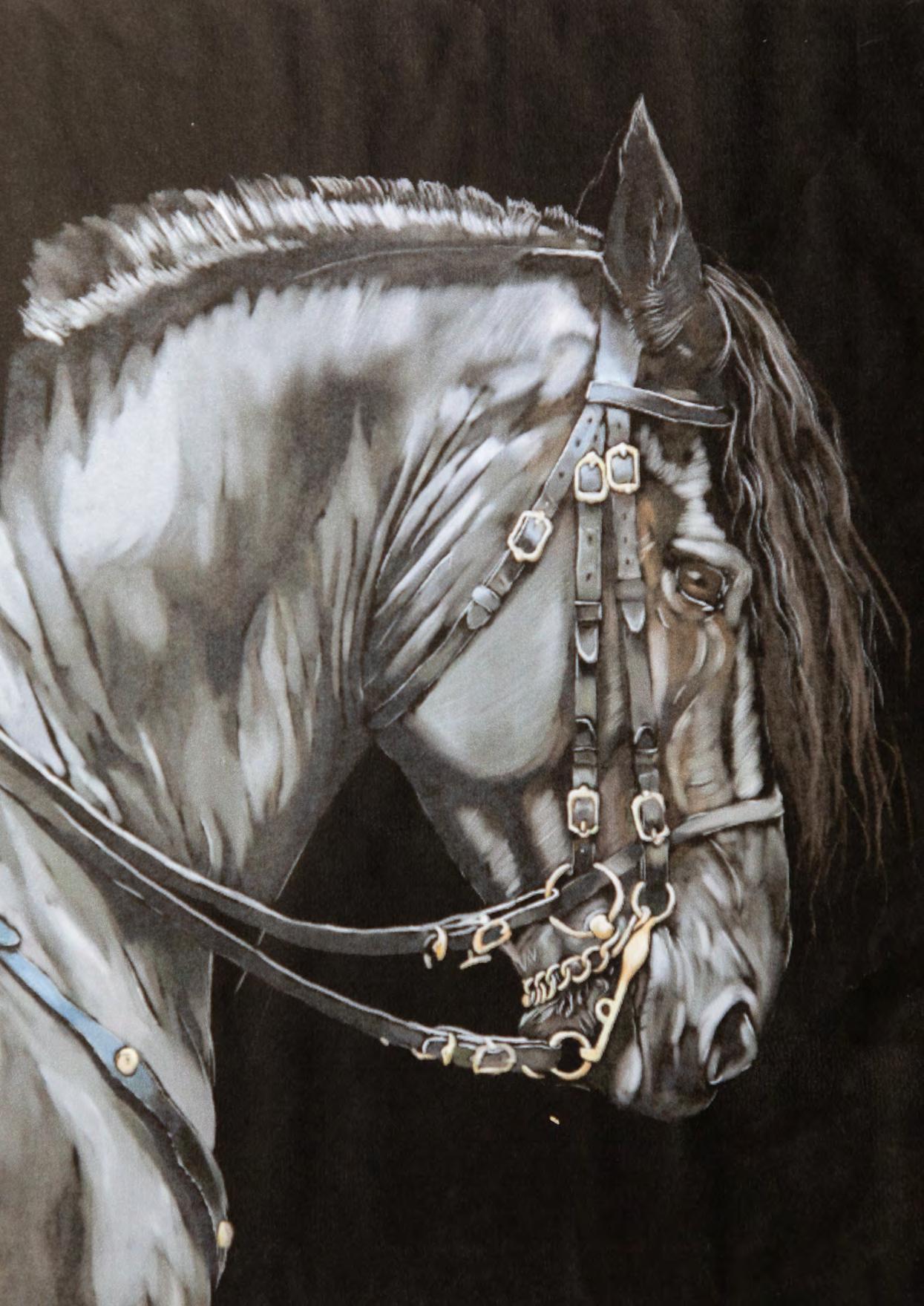

HIS HIGHNESS
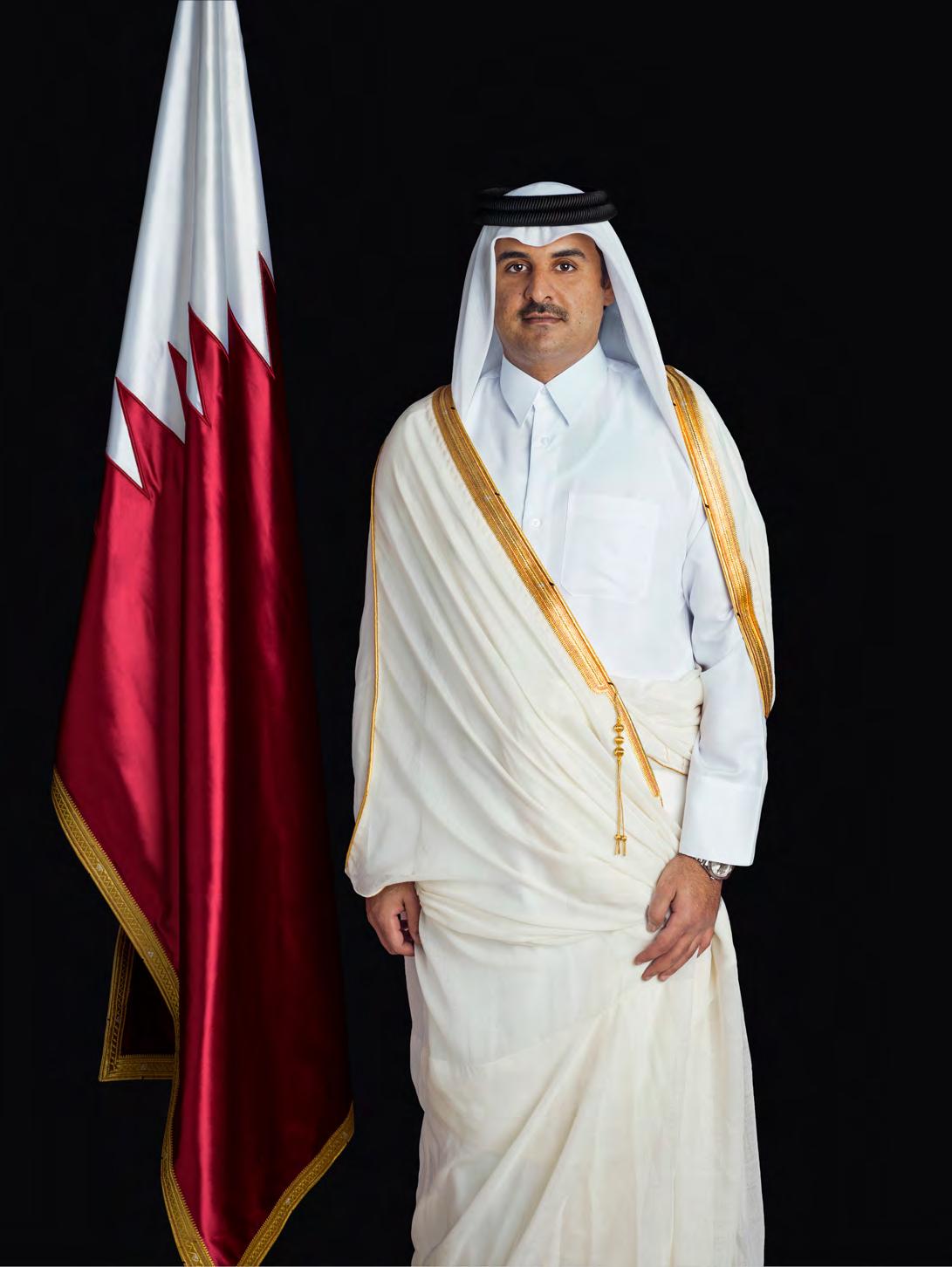
HIS HIGHNESS






HIS HIGHNESS

HIS HIGHNESS



SHERBORNE School is an independent boys’ boarding school re-founded in 1550 under a royal charter granted by King Edward VI. It has grown into a modern school of nearly 600 pupils and about 100 teaching staff. Surrounded by the bustling market town, the school attracts pupils from across the world.
Sherborne Preparatory School is an independent coeducational school for children aged 3-13 years. The school has a long and distinguished history and an enviable academic reputation as a feeder to many of England’s leading independent schools. In April 2021 Sherborne Preparatory School merged with Sherborne School.


Sherborne Qatar was founded in 2009 and is a joint venture between Sherborne School and Sheikh Abdullah bin Ahmed Al Thani. Members of the Qatari royal family such as the Emir, HH Sheikh Tamim bin Hamad Al Thani, have attended Sherborne and Sheikh Abdullah and his wife Sheikha Amal have sent some of their sons there too.
Shirburnians follow a diverse range of careers at the highest levels and include diplomats, bishops, politicians, journalists, actors, poets and musicians. Sheikh Abdulla was keen that Sherborne should join him in a partnership to bring to Qatar education opportunities and values that he had seen and liked at Sherborne. He says: “Ahmed our oldest son was transformed by Sherborne. The school’s approach helped him to discover different talents in himself and he was greatly nourished by the experience. We are extremely grateful for what a Sherborne education has given him. Sherborne has history, culture, discipline and a willingness to transform a child. That is what it did for our child and that is what we want to give to Qatar. We need to bring a more structured educational experience to our country. Qatar needs Sherborne’s culture, experience and tradition.”
Sherborne Qatar is a founding member of Qatar’s Ministry of Education & Further Education Outstanding Schools Initiative and is overseen by the Ministry’s Private Schools Office. Sherborne Qatar is a self-financed, not-for-profit school with its own Board of Governors, of which Sherborne School has half of the appointed membership. Our ethos, brand and educational standards are overseen by and aligned to Sherborne School.
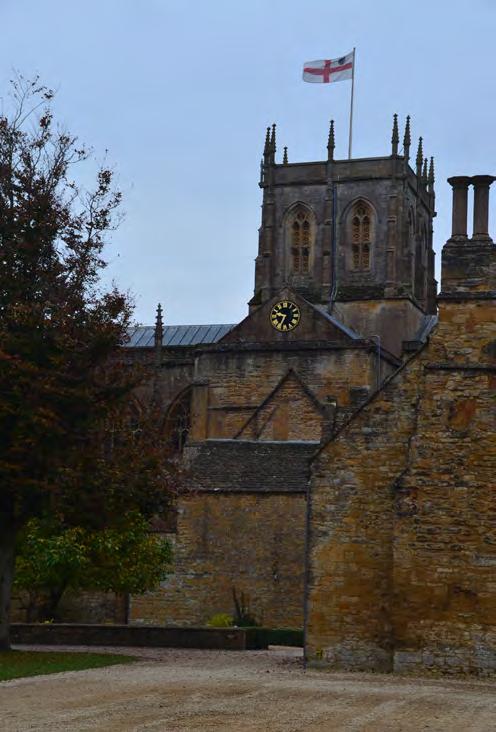
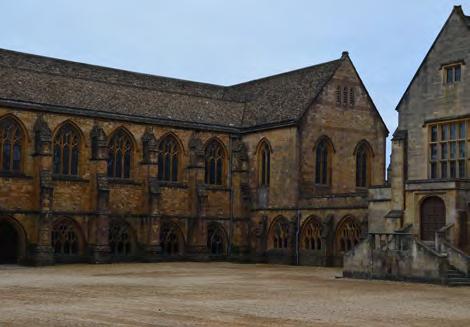
The publication of this year’s Qatar Shirburnian coincides with an easing of the Covid-19 restrictions and a return to more normal schooling.
The previous three academic years have all been affected by the Global Pandemic and this article gives me an opportunity to thank members of the Sherborne Community for their continued support of our schools. Firstly, I would like to thank the teachers for their dedication and commitment to the pupils’ learning, and especially for their hard work, determination, and enthusiasm to continue moving education forward over the last two very challenging and troubling years. Secondly to the parents for their continued support of the school and finally the pupils for your resilience and aspiration for an outstanding education, which resulted in our best ever i/GCSE and A Level results to date.
It is worth noting that the current Year 13 pupils were in Year 9 when we last had a normal school year and so many of our pupils and staff will be seeing key aspects of the school, such as Enrichment and productions, for the first time. We look forward to a new school year rich in the variety of events which are so important to us for developing a rounded young person.
In June we were able to hold a near normal Commemoration, or Commem as it is affectionately known, which is an opportunity to celebrate our pupils’ successes. During the celebrations I was delighted to present The Principal’s Award, given each year to pupils at any of the Sherborne Family of Schools for something exceptional, inspirational, or motivational.
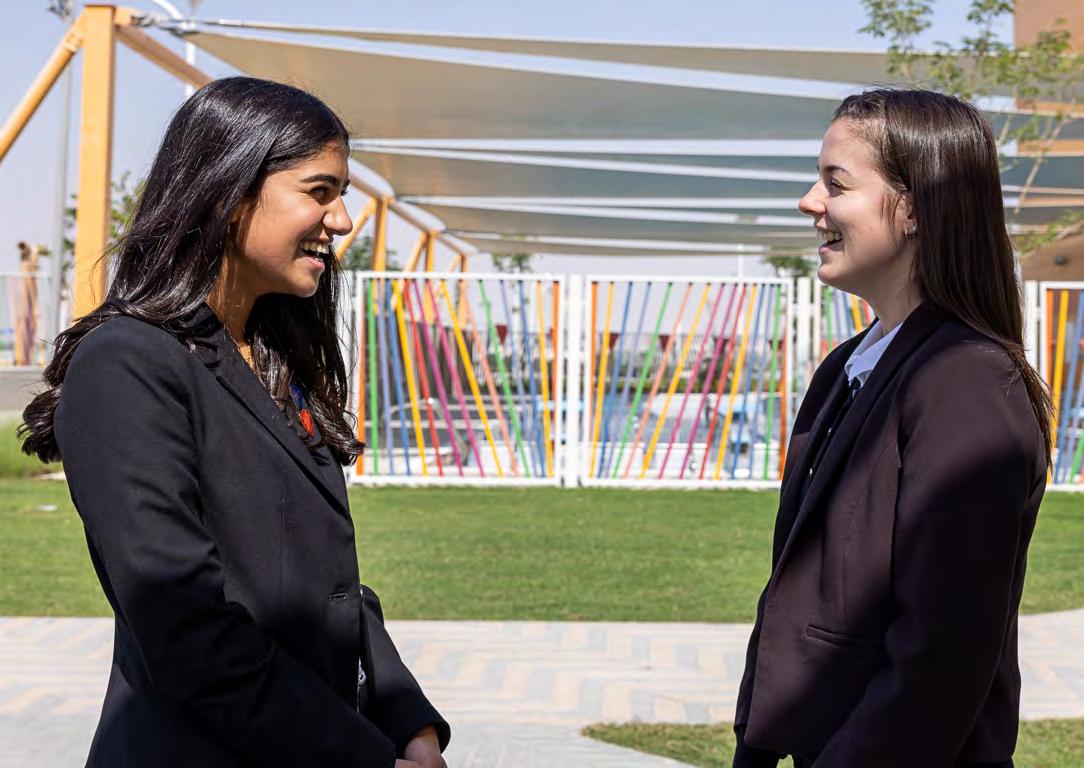
This year’s recipients, Khadija and Maryam Ghaly, are strong academically, supportive pastorally and exceptional sports stars. They are amazing role models to many pupils, of all ages, both inside and outside of the school. In short, they are outstanding Shirburnians. They are both prominent leaders in Cook House and have already completed their Level 1 Sports Leaders Awards. They are always at the front of the queue to volunteer to help, especially for anything that is sports-related, including being officials at Sports Day and leading football sessions for the Prep School pupils during their recent Transition Day. They attended the Ramadan Girls Festival and helped coach the Sherborne Football teams. They also supported the Interhouse Boys’ World Cup Festival in Lusail by refereeing many of the games. Both girls have also been selected as Youth Advocates for the Generation Amazing programme and represented Sherborne at a 3-day festival at Qatar Foundation last December where they made such a positive impression that they were invited to participate in a follow up documentary on gender equality in sport. Congratulations to them both.
I commend the pages which follow to you and hope that you will enjoy reading about everything which has continued to happen despite the challenges of the pandemic. I challenge every pupil to excel in all areas of school life, and perhaps next year you will be the recipient of The Principal’s Award.
Nick Prowse Principal

While we did not see a return to ‘normal’ school arrangements this academic year, we have welcomed the return to 100% attendance for pupils. As you will no doubt recall, the only interruption was, resulting in a brief return to remote learning, when the number of COVID-19 cases spiked at the start of 2022 following the impact of the Omicron variant.
- Roy T. Bennett
The 2021/22 academic year did, however, see the return of many of our enrichment activities and pupils being able to socialise at breaktime, albeit in ‘bubbles’ and with staggered breaktime arrangements for year groups. Perhaps the most significant movement back towards normality was that, at last, our older pupils were given the opportunity to sit externally set and marked examinations to determine their BTEC, i/GCSE, AS Level and A Level grades. For these positive developments we must be grateful.
Continuing on the positive front, there was also a landmark in Sherborne Senior School’s history this academic year with the much-awaited move to the new site adjacent to the Mall of Qatar.
Although due to the pandemic, and the resulting MOEHE and MOPH precautionary measures, we have yet to fully utilise some of the new facilities, all have enjoyed and benefitted from the numerous and attractive
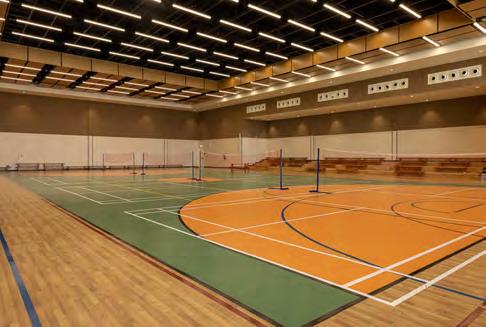

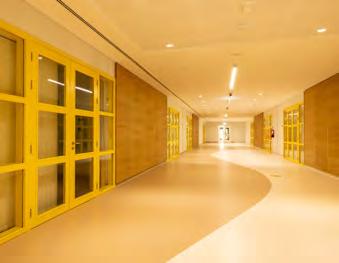
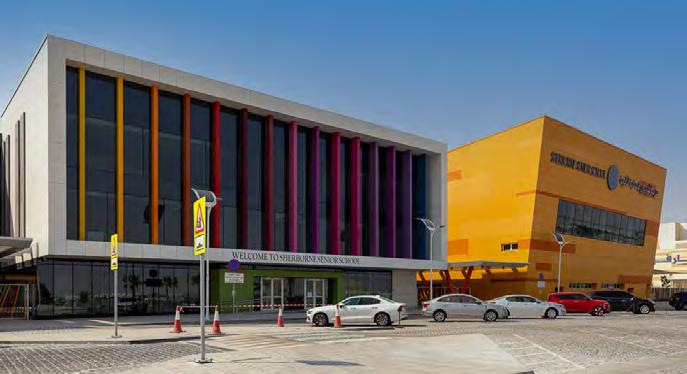
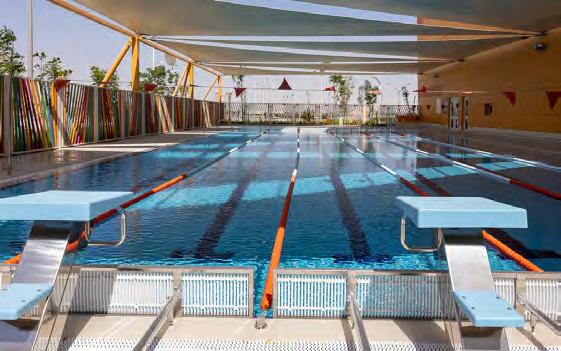
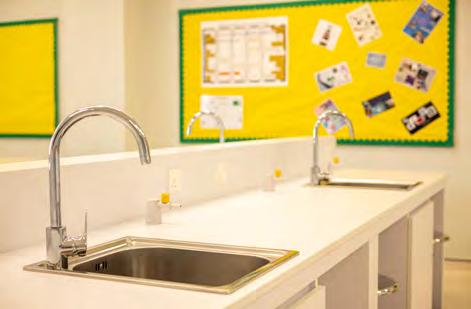
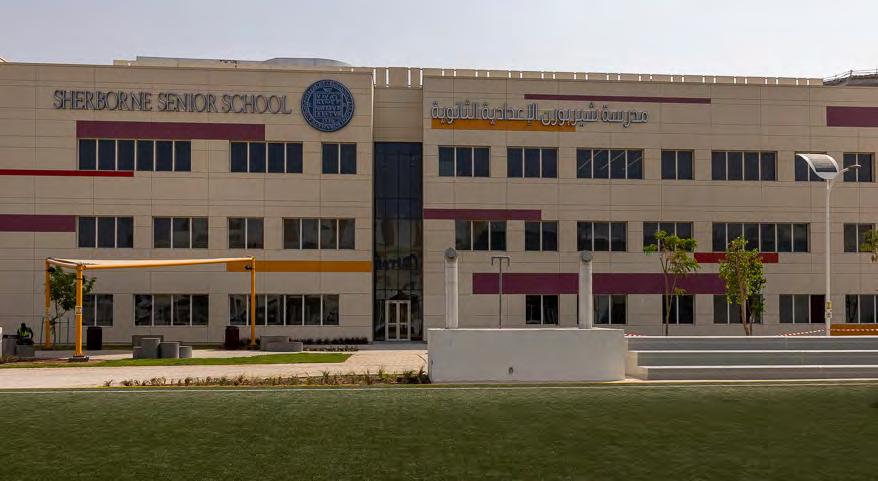

outside seating areas, the bright spacious modern classrooms and other internal areas, and the additional sporting amenities at our new site.
Following the move, planning began from the very start of the 2021/22 academic year to expand our curriculum, with new courses across all year groups, from August 2022. Additional staff have been appointed for the next academic year and, among other developments, 2022/23 will see the addition of Design and Technology (initially in Key Stage 3 and Key Stage 4), Global Citizenship (in Key Stage 3 and Key Stage 4) and Travel & Tourism (in Key Stage 5) to our already extensive academic programme. Options, and subject combinations, at i/GCSE and AS/A Level will be greatly enhanced next academic year.
‘When I was 5 years old, my mother always told me that happiness was the key to life. When I went to school, they asked me what I wanted to be when I grew up. I wrote down ‘happy’. They told me I didn’t understand the assignment, and I told them they didn’t understand life.’
- John Lennon
Our priority this year has been to continue to keep our children safe and happy. We have remained fully committed to doing all we can to support the social and pastoral needs of the pupils. This was praised in both of the external inspections that we have had these past 12 months (details of the inspections to follow).

‘Kites rise highest against the wind, not with it’
– Sir Winston Churchill
It would be remiss of me not to thank the entire school community for their continued resolve. Let’s hope, and pray, that we start the next academic year with the arrangements and opportunities we all enjoyed prepandemic.
Sherborne Senior School had its best examination results to date in 2021. One of the most pleasing trends has been the continued rise in pupils achieving top grades. Below is a summary of the examination highlights from the May/June 2021 examination session.
• 49% of all i/GCSE grades were a grade 7, 8 or 9 (equivalent to the old A/A* grades). This compared with just 29% of grades being the top 9 to 7 grades in England.
• 91% of all grades were a grade 4 or higher (equivalent to a C grade or higher). In comparison, in England 77% of all grades were a grade 4 or higher in 2021.
• There was a 100% pass rate (for the third year in a row).
• 93% of pupils achieved 5 or more passes at grade 4 or higher (up from 91% in 2020) and 85% of pupils achieved 5 or more passes (including English and Mathematics) at grade 4 or higher.
• 15% of pupils did amazingly well achieving a grade 7, 8 or 9 in all their subjects. This was a jump from 8% in 2020.
• For 47% of the pupils at least half of their grades were a grade 7, 8 or 9 (up from one-third of the pupils in 2020).
• 34% of all grades were a grade A – up from 30% in 2020 and 22% in 2019.
• 58% of all grades were either a grade A or B – up from 50% in 2020 and 40% in 2019.
• 80% of all grades were in the A* to C range – up from 74% in 2020 and 54% in 2019.
• The pass rate at AS Level was 98% – up from 96% in 2020.
• 7% of pupils did exceptionally well achieving an A grade in all of their subjects.
• Over a half of the pupils (56%) achieved at least one grade A in their AS Levels.
• Two thirds (67%) of the AS Level pupils achieved a grade C or above in all of their examinations.
• 35% of all grades were an A* or an A.
• 55% of all grades were in the A* to B range.
• 84% of all grades were in the A* to C range (up from 83% in 2020).
• The pass rate at A Level was 98%.
• 20% of pupils did exceptionally well achieving an A* or an A in all of their subjects.
• Almost half of the pupils (49%) achieved at least one grade A or A* in their A Levels.
• 66% of pupils achieved a grade C and above.
In May/June 2021 the BTEC Level 3 Subsidiary Diploma in Business results were equally impressive. As in all previous years, all the pupils achieved at least a pass (BTECs are graded as either a Fail, Pass, Merit, Distinction or Distinction*). There was one Distinction, four Merits and three Passes in 2021.
Despite the ongoing challenges caused by the pandemic, pupils completing their AS/A Level studies in 2021 continued to secure places in top universities in the UK and worldwide.
Business-related subjects, law, history, politics, medicine, biochemistry, dentistry, engineering, and computing remained the most popular courses in 2021.
Below is a list of just some of outstanding institutions, and courses, that our pupils gained access to.
Course: University:
Aeronautical Engineering
Loughborough University, UK
Business Qatar University, Qatar
Business Management University of Manchester, UK
Computer Science
Dentistry
Dalhousie University, Canada
Aydin University, Turkey
Engineering University of Manchester, UK
English Literature and Linguistics Cardiff University, UK
History
Human Resource Management
International Politics
King’s College London, UK
Saxion University of Applied Sciences, Canada
Cardiff University, UK
International Relations University of York, UK
Law and Economics
Medicine
SOAS University of London, UK
New Giza University, Egypt
Medicine Qatar University, Qatar
Medicine Cairo University, Egypt
Medicine University of Nottingham, UK
Politics Georgetown University, Qatar
Politics University of York, UK
Psychology
Radboud University, Holland
Having had to be repeatedly postponed due to the pandemic, Sherborne Senior School was inspected twice during the 2021/22 academic year. The first inspection, in November, was the Qatar National Schools Accreditation (QNSA) for private schools. The second inspection took place in April and was undertaken by Penta International.
The State of Qatar launched the QNSA in 2011 as an initiative to ensure that all programs offered by private schools are up to international standards in terms of performance and quality. The accreditation system provides quality assessments on schools based on their academic, educational, and administrative performances.
There are three possible outcomes to the QNSA accreditation visits:
• Denial of accreditation - for schools achieving an average less than 2.00 on all standards;
• 3-year QNSA accreditation - for schools achieving an average within the range 2.00 – 2.49 on all standards; and,
• 5-year QNSA accreditation - for schools achieving an average within the range 2.50+ on all standards.
Sherborne Senior School was awarded a 5-year QNSA accreditation (the most positive judgment) at the end of November 2021.
The school was praised on:
• the diversity of teaching strategies and activities.
• the behaviour of pupils - and the high level of respect between teachers and pupils, and between pupils.
• the quality of pupil feedback.
• our curriculum - including the options in Key Stage 3, 4 & 5.
• the support we provide pupils - including university guidance.
• our facilities and resources.
• the thoroughness of our policies and procedures.
• being an effective communicator.
• having effective management across the school.
• the overall positive and friendly atmosphere.
The Department for Education has put in place a voluntary scheme for the inspection of British schools overseas, whereby schools are inspected against a common set of standards that British schools overseas can choose to adopt.
Penta International is approved by the British Government for the purpose of inspecting schools overseas. As one of the leading inspection providers, Penta International reports to the English Department for Education (DFE) on the extent to which schools meet the standards for British Schools Overseas (BSO). The purpose of BSO inspections is to provide information to parents, teachers, senior managers, and the school’s management on the overall effectiveness of the school, the standard of education it provides and its compatibility with independent schools in the UK. An essential part of the inspection is considering the extent to which the British character of the school is evident in its ethos, curriculum, teaching, care for pupils and pupils’ achievements.

Sherborne Senior School was judged as providing a high quality of education, with significant outstanding features, for all its pupils and we fully met the BSO standards. Many strengths were identified including:
• the positive and friendly atmosphere within the school community. A high level of respect between teachers and pupils, and between pupils, was commented on.
• our high quality curriculum, which is distinctively British, that has been effectively adapted to the local context.
• effective leadership and management across the school.
• high quality premises and accommodation.
• outstanding welfare, health, and safety of the pupils.
• outstanding pupil spiritual, moral, social, and cultural development.
• outstanding information provision.
Drawing upon some of the many positive comments, below are some extracts from the BSO report:
• “Pupils enjoy an outstanding learning environment.”
• “Pupils develop their self-knowledge and self-confidence, preparing to face the challenges of the contemporary world.”
• “...a well-planned and flexible curriculum that is designed to meet the varying needs of the pupils.”
• “...a curriculum that aims to inspire all groups of pupils to develop a lifelong love for learning and to embrace challenges so that they reach their full potential.”
• “Sherborne Senior School celebrates diversity and aims to create global citizens who are dynamic, creative, independent learners.”
• “...excellent progress in KS4 and 5.”
• “The school successfully enables pupils to develop their personal skills and qualities.”
• “...a very multicultural environment which values diversity and promotes the respect for the traditions of the local pupils as well as of the international ones.”
• Pupils have “...positive attitudes towards learning as well as towards each other.”
• “The pupils show respect for one another, for their teachers and for their environment, clearly meeting the schools’ high expectations on behaviour.”
• “The school fosters and enhances a feeling of togetherness and friendship.”
• “...teachers create a positive and friendly learning environment, in which all pupils are able to clearly articulate their thoughts and feelings.”
This academic year we welcomed the following teachers to Sherborne Senior School:
Mrs Afaf Turkmen
Mr Brad Reynolds
Mr Caoimhin McCartney
Mr Chris Martin
Mrs Collette Ingram
Miss Edel Martin
Mr Fasal Choudhri
Mr Peter Pallett
Mr Robert Morley
Arabic & Islamic Studies Teacher
Head of Sociology & Psychology
Mathematics & Science Teacher
English Teacher
Business & Economics Teacher
Moder n Foreign Languages Teacher
Business & Economics Teacher (returning)
Sociology & Psychology Teacher
History & Politics Teacher
Changing schools can be a challenge and moving to another country, especially if you have a family, can be unsettling. Starting in a new school, in a different country with your family, during a pandemic is therefore not easy at all. Without exception, all the new teaching staff have settled in well at Sherborne Senior School and we are all so pleased that they took the plunge and joined our school community.
As is the nature of schools, and all organisations, we sadly say farewell to some colleagues at the end of this academic year. Many of the teachers below have dedicated many years to the school, the longest serving being Mr Ball, Mr Hake and Mr Robey.
Mr Dan Keefe
Mr David Ball
Deputy Head Pastoral
English Teacher & Head of House
Mr Dillon Wolfe Lear ning Support Teacher
Mrs Julie Hart Lear ning Support Teacher
Miss Aliyah Mohamed
Mr Ed Hake
English Teacher (moving to Sherborne Qatar School for Girls’)
Head of Drama & Head of House
Miss Tahnia Hafeez Biology/Science Teacher
Mrs Becki Wolfe Head of Perfor ming Arts
Mr Graham Robey Physics/Science Teacher, Enrichment Coordinator & Child Protection Officer Boys’
Mr Jason Lloyd Chemistry/Science Teacher
It is sad that the above dedicated and valued colleagues are leaving Sherborne, but we wish you happiness, health, and prosperity as you embark on the next chapter in your lives. We ask that you keep in touch and please do not hesitate to reach out if you need anything.
I must pay tribute to one particular colleague Mr Dan Keefe, Deputy Head Pastoral. The Deputy Head Pastoral is a key member of the Senior Leadership Team with the main responsibility for pastoral care, pupil well-being and offering pupils a wealth of opportunities beyond the academic curriculum.
Mr Keefe’s efforts and vision have helped cement our reputation in the region as being a caring institution that puts as much emphasis on academic excellence as it does on the well-being and pastoral care of its pupils. The House system has been enhanced under his direction, pupil voice has been developed considerably and student leadership opportunities are now a strength of the school.
Mr Keefe has also been primarily responsible for implementing the COVID-19 precautionary measures and managing these safety measures. It’s largely down to Mr Keefe’s diligence that the school has functioned so well, and with so few disruptions, during the pandemic.
Despite the continued constraints imposed by the pandemic it has still been a year of many achievements and one to look back on with fond memories.
The intention of the Qatar Shirburnian is to capture the highlights of an academic year for posterity.
I hope you enjoy reading ‘The Qatar Shirburnian 2021/22’.
Take care and keep safe,

Stephen Spicer Headmaster
The first year of senior school can appear a daunting prospect; the transition from preparatory school is an academic milestone which no pupil will easily forget. When our Year 7 pupils joined us in August, they brought with them enthusiasm, fun and an eagerness to meet every challenge. We have watched in admiration and will think of our youngest pupils fondly for many years to come as we watch them grow and continue to impress on their journey through the senior school.
As Year 7 tutors, Mrs Ranglall, Miss Martin, Mr White, Mr Mortimer and Mrs Ramezani hold our pupils in particularly high esteem. The children have immersed themselves fully into all that Sherborne has to offer; whether academic, Interhouse or the enrichment program. Some of the highlights include an energetic PSHE scavenger hunt, teamwork and organisation in the pupil organised chess tournaments, demonstrations of mindfulness in the use of our miMove application, the regular tutor group band practise and competitive contributions to the Qatar University Young Scientists Program.
“Moving to the senior school felt like a big step and not an easy one either. But, amazing teachers like Mr Pallett and Mr Thompson made it easier and so much fun.”
By Juraj Kovacic,
Year 7
“The transition to senior school was a tough one, especially with online learning. But, defying all odds Year 7 rose to the challenge and have thrived this year. From National Day celebrations to our twice weekly Interhouse competitions, there is never a dull day in Year 7! Despite all the challenges, we have shown incredible resilience and amazing teamwork! This first year in senior school has been fantastic!”
By Mamoun Ibrahim, Year
7
“Everyone in the senior school are so thoughtful and understanding. They are all so nice and I am really thankful to be a part of Sherborne.”
By Jordan Msefula,
Year 7
Mrs Williams
Head of Year 7

“a curriculum that aims to inspire all groups of pupils to develop a lifelong love for learning and to embrace challenges so that they reach their full potential”
BSO Report, April 2022



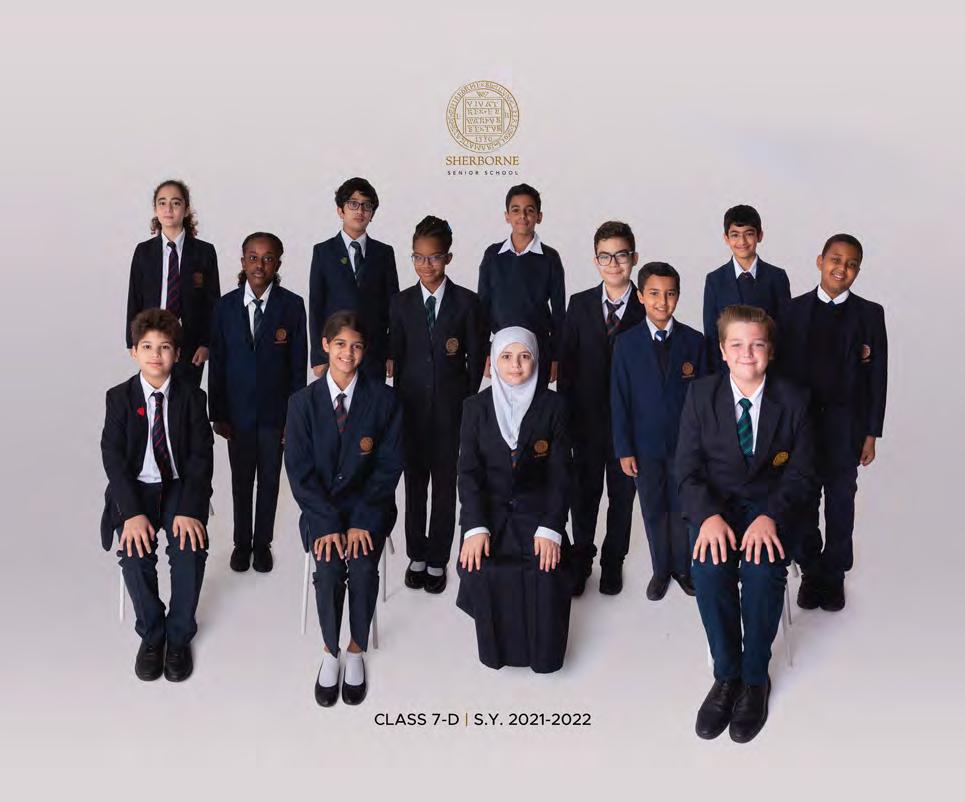

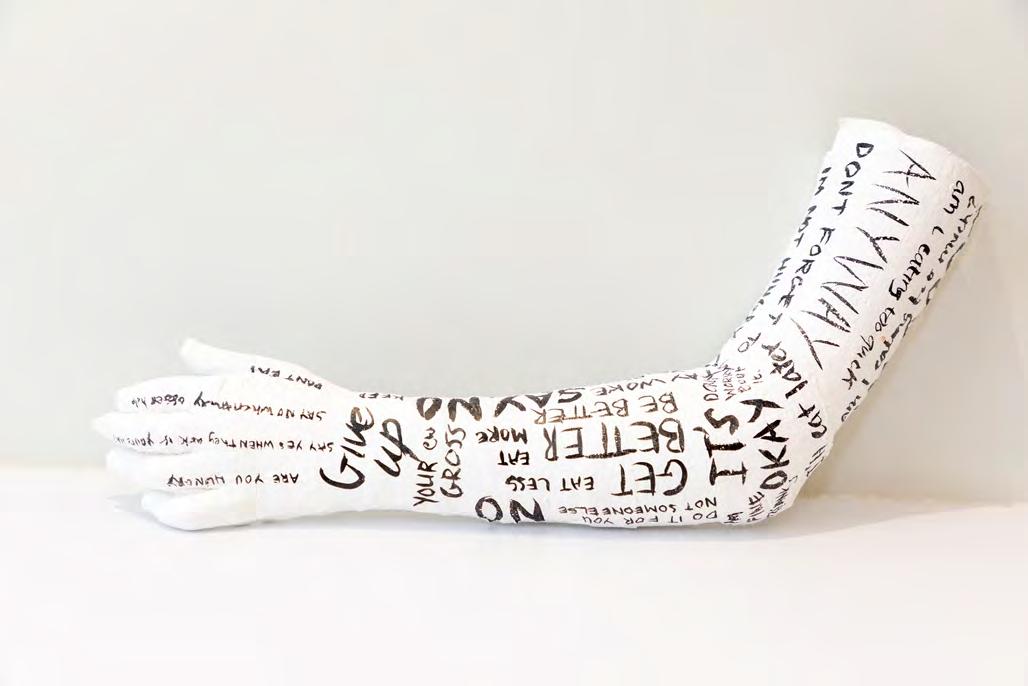
By
Our year started off in a state of excitement as we moved into our brand-new state of-the-art building by the Mall of Qatar! The new school is huge, spacious and has very modern aesthetics that makes us proud to say, “This is our school!”
Aside from the many classrooms and science laboratories that have enhanced our learning experience, we were particularly excited by some of the new facilities such as the robotics suite and the large astroturf. Having access to great facilities really helped us to look forward to the years ahead at our school.
During the course of the year, we, as a year group, have experienced a variety of experiences that have helped us grow as a community and as individuals. These include PSHE days and form time. We have discussed and completed activities about school values and teachers have educated us on how to be mentally and physically healthy in order to get the most out of our lives.
InterHouse has had lots of fun activities too, such as the charity walk where houses competed to see who could complete the most laps of the Astro Turf. During Interhouse in Ramadan we had a lantern designing competition and a charity donation event; where every house donated daily essentials into boxes and at Eid it was distributed to the people in need.
“During the year we have again had small learning interruptions due to COVID but Sherborne took on the challenge and provided us with a combination of blended and online online learning with both live and recorded lessons. Year 8 pupils have persevered and shown great resilience to overcome the challenges they have faced this year and as Qatar continues to relax restrictions, we look forward to the challenges and opportunities that the next year will bring.”
Chi Yee Chong 8A, Yusuf Haq 8C Year 8 School Council Representatives
Mr McKendry Head of Year 8

“The pupils show respect for one another, for their teachers and for their environment, clearly meeting the schools’ high expectations on behaviour.”
BSO Report, April 2022
With the move to a brand new campus, finally being provided the opportunity to rejoin their peers after an extended period of remote learning, and going through the process of choosing their i/GCSE options, it has certainly been an eventful year for pupils in Year 9.
The year started with a focus on well-being and reflection as pupils looked back on their experiences during the pandemic. “The new norm” was slowly adopted by all, as the academic year slowly began to get underway. Tutor time was used to develop more resilient learners whilst highlighting key aspects of forming a healthier lifestyle. It is hoped that recommendations made by pupils have assisted in creating a more balanced approach to learning.
In the Summer term, Year 9 pupils were involved in taster sessions for new subjects, which would be on offer to them in Key Stage 4. The sessions took place during PSHE and pupils had a choice of Business, Economics, Sociology, Psychology, BTEC Creative Media, and Photography. Pupils were enthused by the sessions and they provided them with invaluable support to make suitable option choices.
Joining Year 9 as your Head of Year has been a truly remarkable experience. Pupils have displayed high levels of maturity throughout the year, as well as ensuring that every day is filled with positivity and enthusiasm. A big thank you should also be passed on to the Year 9 pastoral team Mr Tracey, Ms O’Neill, Mr Asif, Mrs Malik, and Mr McCartney for their superb efforts this year. Additionally, a special mention to Mr Kinlan and Mr Wolfe for all of the behind the scenes support that has also been provided.
Mr Collins
Head of Year 9

“Pupils develop their self-knowledge and selfconfidence, preparing to face the challenges of the contemporary world.”
BSO Report, April 2022
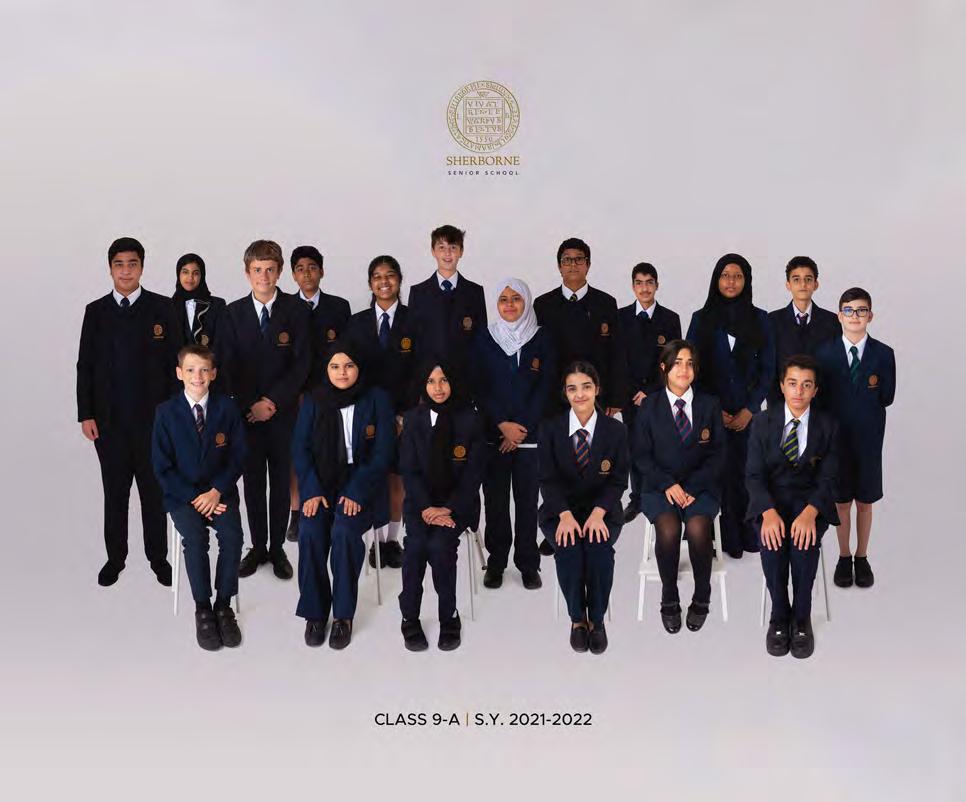
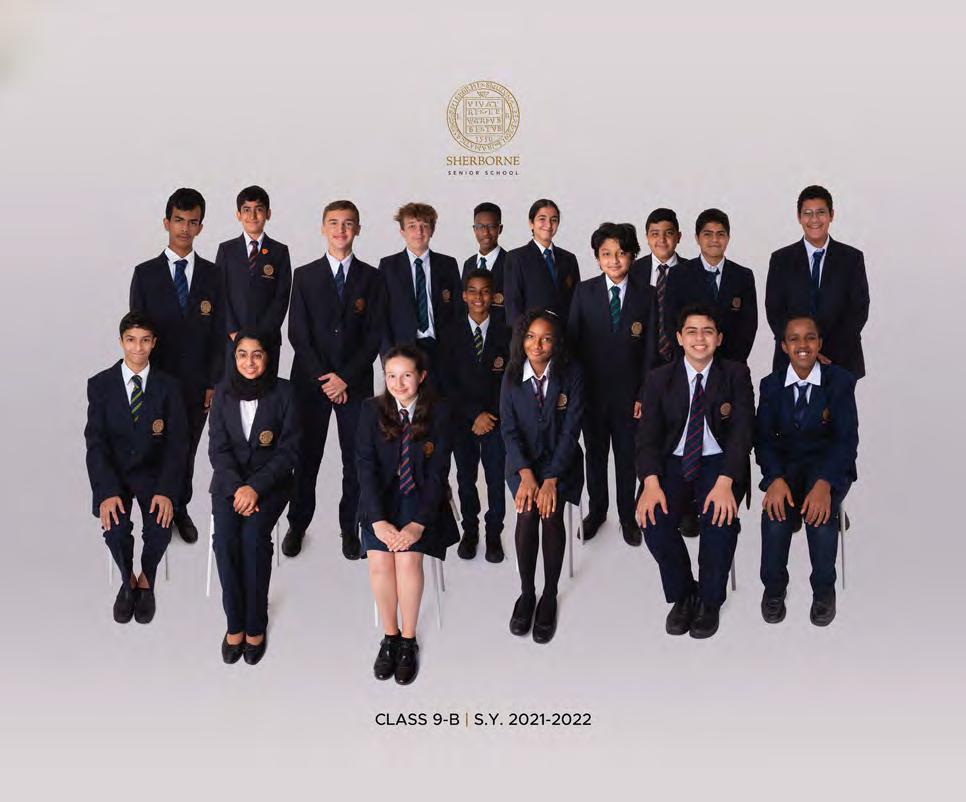


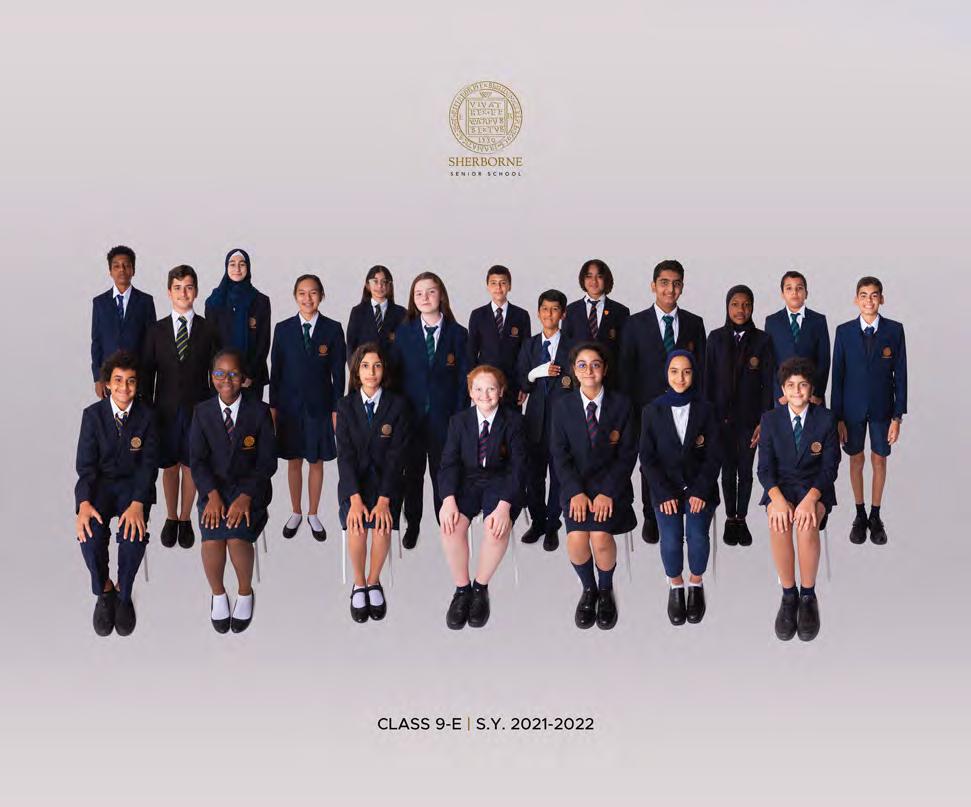
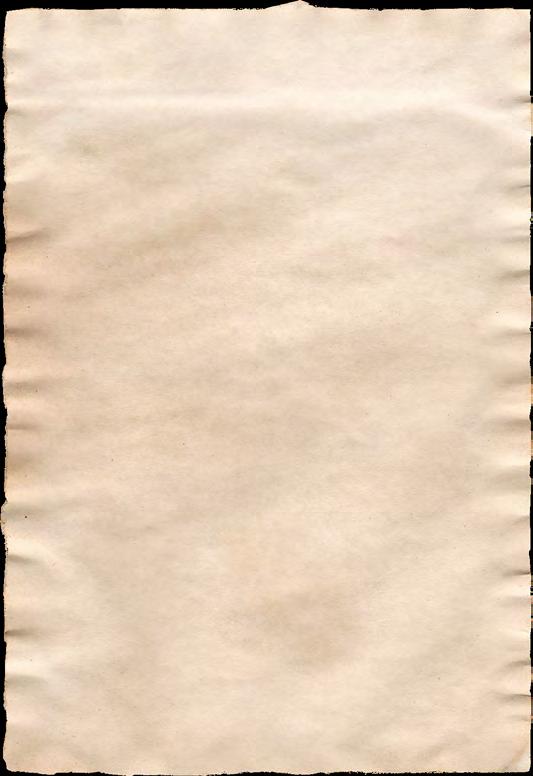
To be told that everything you have ever loved never belonged to you.
Forced out, but it doesn’t matter because ‘it was never yours’.
Falling catastrophes, just waiting to ruin the lives of so many.
The screaming of the media and glamourised deaths blowing your ear drums until they bleed.
Stepping into a land so unfamiliar, unwelcoming, uninviting.
I want to go home.
What home? ‘home’ is no longer a place I recognise.
Instead, a war zone and the blood of so many lies, unrested, in the place I once slept.

You have to embrace the change; it’s this or the screams, gunshots and lingering smell of death.
So you do, everything about yourself no longer identifiable by the eye of the past.
I want to go home.
What home? The only assured safe place you had was burnt to an ashy demise.
The faint tear stains left on your cheeks burn with each memory.
Innocent screams still invading your every thought.
I want to go home, but I don’t know where that is.
By Evie Tobin and Eshal Raheel, Year 9
As we reflect on another year, I can only marvel at how robust and adaptable the Year 10 pupils have been. Starting formal examination classes can be daunting and when you throw in the uncertainty caused by the COVID pandemic, they become even more difficult. I am delighted to say that as a year group, they have risen to these challenges and continued to flourish.
Due to their unique circumstances, and for the first time in Sherborne Senior School’s history, Year 10 were afforded study leave as they had their first taste of what an examination season feels like. Shortened to less than two weeks in order to avoid missing too many lessons, it gave the pupils their first exposure to how to prepare for multiple examinations in successive days as well as the plethora of rules we must follow ranging from what equipment we can and cannot use to how we conduct ourselves when entering an exam hall. As is usual for this year group, the pupils rose to the occasion and were simply outstanding. This augurs well for their formal examinations in the summer of 2023. The future is bright for the Year 10s and when they reflect on their achievements this year, they can do so with a great deal of satisfaction safe in the knowledge that they are doing everything possible to achieve considerable success in the years to come.
“This year, for all of Year 10, has been quite a challenging one with us starting the year online and then going back to school fully. All of us starting the i/GCSE course (getting to do the topics we’ve chosen – along with the mandatory lessons – and learning much harder material) has put us in much deeper waters. This year has been a complete rollercoaster with us being back in school where it’s not blended, meeting new people, and having completely different coursework. Easing this transition was and still is our teachers! We’ve bettered our ways to revise, to make notes, and become much more studious individuals. I believe that starting the first year of our i/GCSE course has been wonderful, despite being difficult, because I personally learned a lot from my peers. We all found the year quite different from our previous ones, improving our teamwork, communication, and social empathy for anyone doing exams. Finally, I am very excited to see what the next year holds and the exams all this time spent studying will be worth, but for the time being, I’m very grateful to my teachers and my colleagues for not only their educational support but also for their emotional support.“
By Sana Ali, Year 10
As the academic year is coming to an end, I cannot help but reflect on the highs and lows we have faced this year. Year 10 has been a very different experience than Year 9, I learned a lot of different things and I have been getting prepared for what Year 11 will hold with my i/GCSEs.
This year began with a difficult blend of learning from home and coming to school, but thankfully that all is now behind us, and the future looks much brighter.
I wish all my classmates and fellow students a peaceful and relaxing summer, and I wish them all the best with the mock exams and i/GCSEs they and I will face in Year 11.
By Khalid Al Marri, Year
10

Mr Oldridge
Head of Year 10

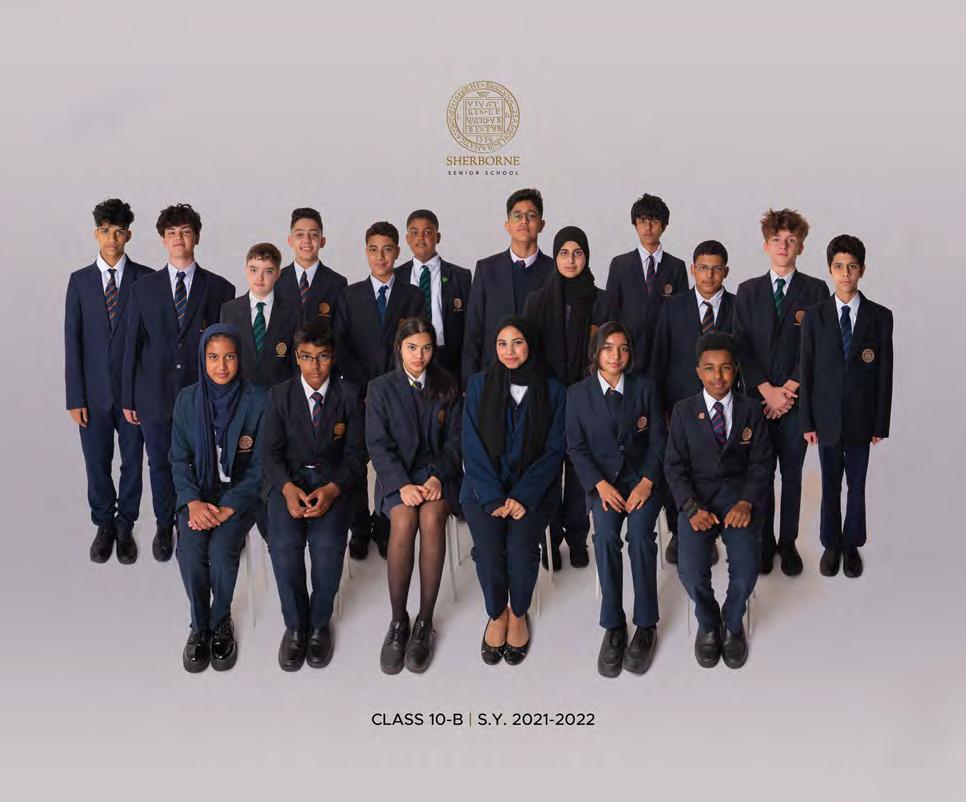
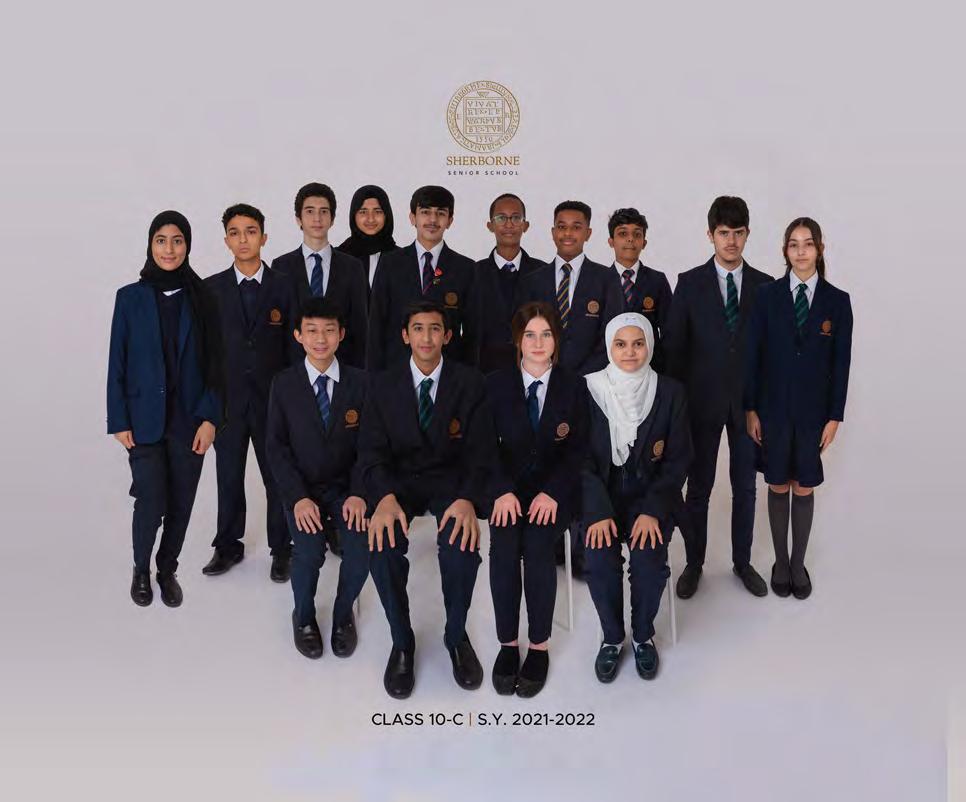


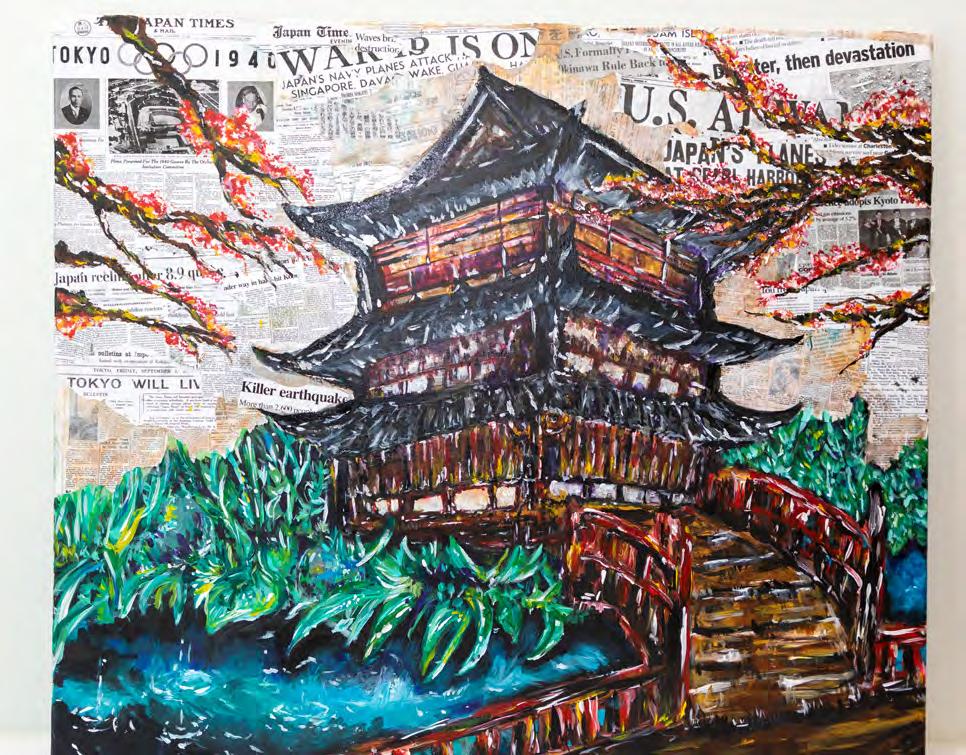
It is now time to say goodbye to a group of eightynine vibrant, unique and individual personalities who have reached a key milestone in their educational journey. Among them are emerging leaders; patient individuals, resilient, team workers who in a dignified manner have completed their Key Stage 4 journey with some great achievements and memories. Under very high expectations, they have continued to build on their strong foundation for the next milestone of their lives. I am extremely proud of the pupils who have flourished in numerous achievements in the academic, enrichment, sporting, house and PSHE activities. A special focus on building leadership (including sports leadership) among a vast majority of pupils lead to planning and running a number of activities and educational sessions that were delivered by pupils themselves – thus honing their skills in building empathy, reliability, risk-taking and effective communication. Therefore, many of the PSHE workshops were run by pupil leaders with aplomb. I am particularly thankful to the School Council representatives for participating in the decision-making process and creating awareness of pupil voice.
It is an exciting time for all pupils as they embark upon the next stage of their educational journey; at the same time, we bid farewell to some of our dear pupils who will be leaving Sherborne. We wish you a smooth transition back to your home country.
As my final message, I reiterate the message to all from our final assembly:
“Be the coffee bean when you are hit with an adverse situation. React like the coffee bean in water to achieve your best flavour”.
The highlights of this year are not complete without the acknowledgement from an excellent team of pastoral tutors.
“It has been an absolute pleasure being your form tutor, 11A! Thank you for being such a wonderful tutor group and making this such a memorable year. You have all developed into fantastic, intelligent and well-rounded people. Despite the difficulties of lockdown and restrictions, over the past few years, you have rose above every challenge life has thrown at you and came out shining! You are an inspiration to the younger pupils at Sherborne. From the bottom of my heart, I wish you all the best of luck in all of your future endeavours. Stay hungry; stay foolish.”
“I had a wonderful year with 11B. My only regret is that I did not get to enjoy their company in Year 10. It was a pleasure to see them handle the pressures of examinations with such a degree of maturity. I will also miss the Rummikub games!”
Mr Morley, 11B
“I have had the pleasure of leading this tutor group for the last two years. I remember the relief we all felt when we returned after having online lessons. Our form room became a place of comfort where we celebrated achievements and discussed your concerns. I am proud of the young adults you have become and I hope you get the results you deserve. Good luck in the next stage in your journey and I will look forward to seeing you next year if you join our Sixth Form.”
Mr Thompson, 11C
“It has been an absolute pleasure to be 11D’s form tutor for the past 5 years. I have SO enjoyed watching you mature into wonderful ladies and gentlemen whilst successfully navigating the unprecedented challenges the past few years have thrown at you. You are brilliant, hardworking, funny and kind individuals and I know you will have a life filled with success. Enjoy!”
Mrs McCormack, 11D
“The last two years have been a pleasure and a privilege – I witnessed you grow into an amazing group of young adults. You have been witty, welcoming, friendly and warm – never lose that!
I have enjoyed our times together, from discussions on conspiracy theories, to our attempts at yoga to our Pixar shorts, and not to forget our cat videos! Thank you for being such a lovely part of my time at Sherborne Qatar.
I hope you get the results that your hard work deserves, and I wish you and your families a safe and happy future. I am sure whatever your next steps, you will face the challenges and adventures with fortitude and optimism. I wish you success wherever you may go.”
Ms Hafeez,11E
This year we also celebrated our Year 11 pupils and their successes and the Gala Dinner 2022 marked this momentous occasion. Here is a lovely speech by one of our Year Representatives of the School Council:
“If you want to go fast, go alone, if you want to go far, go together.”

Miss Ebrahimi,11A
I’m sure the majority of you have passed by this quote. But have you ever stopped and considered what it meant? And only recently have I began to grasp its main central idea.
I don’t want to bore you with the basics of teamwork, but honestly it really is the foundation of a thriving environment. Especially during these challenging times where the world seemed to stop, the walls and barriers seemed to grow and have ultimately divided us from one another. We’ve not only had to juggle our personal lives but also the many responsibilities that come with title “student”, and on top of that face the many adversities that arose during the two years. We’ve been overwhelmed with the incessant work, waves of exams and the colossal amount of stress. Yet we’ve managed to continuously handle it with persistence and patience - it is clear how resilient we’ve been, and I’m sure if we continue combining these elements, we will excel and hopefully achieve and go beyond our aspirations.
Without a doubt, we have passed a substantial milestone, we’ve passed the difficult and exacting fraction of the two years and now with only two months to spare - I hope we continue to work harder, aim higher and perpetually strive for more.
On behalf of myself and my classmates, I would like to express the immense gratitude to all of the Teachers who helped us come this far. Your support and efforts will always be remembered.
And as summer quickly approaches, and as we’ll go our separate paths, I hope we all continue to grow and learn, to succeed and prosper and most importantly continue to cultivate kindness. Finishing our GCSEs will be a transition, a transformation, a signifier that a significant change has been accomplished, that a new stage has arrived. Finally, I hope we all continue to work hard and learn, for we are all stronger when we are educated and use that education for the betterment of society.
Thank you, I wish you all the best of luck.

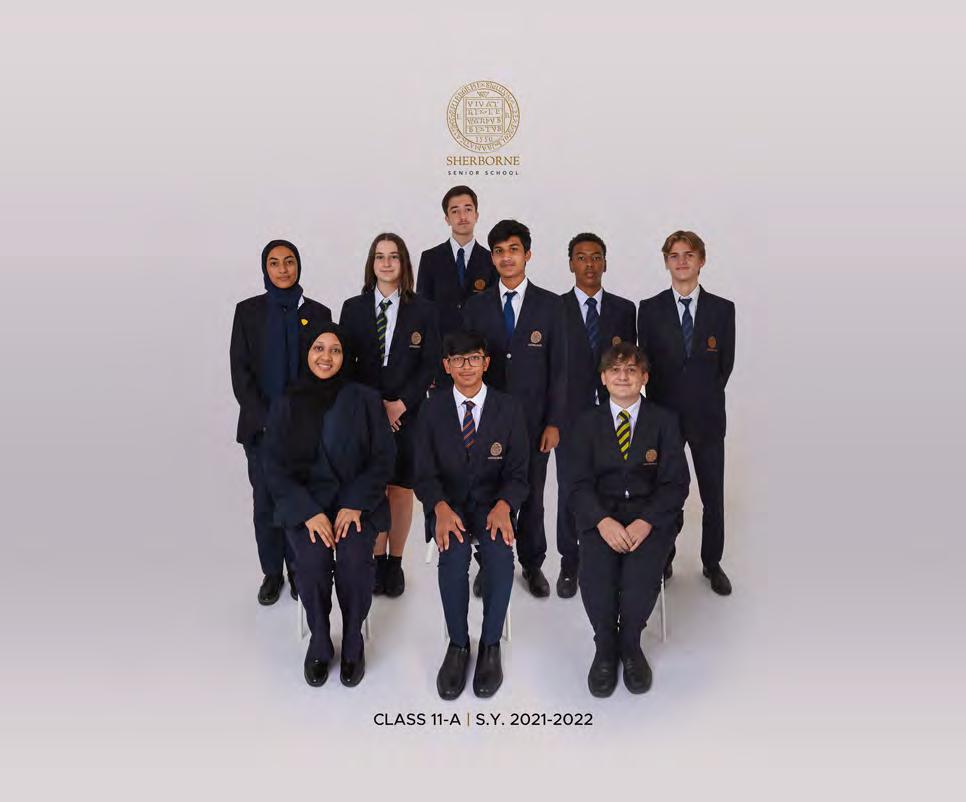





I laced up my grass-stained, once-yellow Nike Dream Speed football boots. My hands trembled slightly as my heart thudded piercingly in my throat, but I forced myself to steady I then stuffed my shinpads into my red socks, pulled them over my shins, and stood up.
‘Breathe, Houda, breathe,’ I told myself, willing the blood pumping in my ears to lessen. I then looked up, scanning the jam-packed, buzzing changing room for a black-and-white striped captain’s band. I tur ned and twisted my neck, looking for it.
‘Aha!’ It was right under the sea of sodden sports bags. I walked over, picked it up and slid it onto my right ar m. That gave me a feeling of resolve and hope. Maybe we could still win this game.
I clapped my hands together. ‘Right, ladies, listen!’, I commanded. The thunder of chatter immediately died down as an ar my of red-clad girls tur ned simultaneously towards me. I smirked. My voice never failed me. ‘Girls, it’s nearly time to go back on. I understand that this game seems impossible to win. The ref has obviously got it in for us and Everton obviously aren’t the friendliest lot,’ I cited. A mur mur of agreement passed over the girls.
seem intimidating, but the fact that it’s still 0-0 says a lot. We need this win if we want to stay at the top of the title race, so this last half is crucial. So, come on Liverpool Ladies, let’s get this win!’The girls burst into cheers. ‘Yes captain!’, they shouted.
W ith spirits much higher, we all left the musty, sweaty smell of the changing rooms and stepped back into the cacophony of jeers and boos. But we didn’t mind. I was so focused that the blue Everton fans seemed light years away. I clapped some teammates on the back as we took our positions on the pitch. It seemed

massive, the goals too far away. But we had to do this.
The pot-bellied, bald referee blew a neon whistle. The Everton striker kicked off, passing back smoothly to her centre-back. She crossed the ball to the right-winger, creating a beautiful, seamless arc as it travelled. They played so faultlessly.
I gritted my teeth. ‘Press,’ I ordered. Our defenders moved forward, putting pressure on the right winger that had possession of the ball. She tried to get past by feinting right but pushing the white ball left, but Yousra didn’t fall for it and neatly stole the ball off her, scanning the field for an open red shirt.
‘Cross to Fatima!’ I hollered, pointing to the left wing. Yousra planted her left foot firmly next to the ball and dug her right foot under it, allowing the ball to soar weightlessly in the air before landing perfectly, impeccably at Fatima’s feet.
I grinned broadly. Everton may be good, but we were definitely better.
Fatima drove the ball forward, dipping her right shoulder to confuse the blue defender but steered left. The defender slipped and fell.
I could see Fatima smiling as she dribbled up the field to meet the next one. She dragged the ball behind her left foot, feigned going forward and tried to sweep the ball between the iron defender’s tree-trunk legs.
She wasn’t having it.
Furiously, she yanked Fatima’s brown, sweat-slicked ponytail and slammed her harshly to the ground. A dull, sickening crunch echoed through the stadium.
I spun around angrily, looking for the referee. I pointed at the scene, outraged. But he simply shrugged and mouthed ‘play on’.
I was livid.
I scanned the field haphazardly, looking for the damned ball as Fatima groaned in pain.
‘I’ll get this goal no matter what,’ I whispered to myself through gritted teeth.
As I wiped sweaty strands of hair off my blotchedred face, I spotted the ball at the feet of a blue centre-midfielder. My brows furrowed into an evil grin and I charged for her.
She could’ve never seen me coming, I was far too quick. I neatly plucked the ball from her feet and tapped it through her legs. Driving forward, I faked right, then left; pushed the ball smoothly to the right, leaving the defender behind in a haze of confusion.
Next was the tree-trunk defender.
Her piggy little eyes were squinted in an evil smirk as she , ‘you’re next’.
But I was ready for her.
I twisted my back towards her while flicking the grass-stained ball up with my feet into the air so that it arced over her head. She had no chance. She could only stare at the ball in bewilderment as it travelled over her.
I was already behind her to meet the ball. I took a touch using the instep of my right boot and I sole-rolled the ball forward to face the goalkeeper. A malicious smile was etched onto her face as she clapped her gloved hands together, daring me to shoot.
‘Is that a threat?’ I questioned mockingly. I took a fake shot at the bottom-left corner, relishing the moment as she fell for it, diving with a horrorstruck face into that corner. I then dragged the ball in a V-motion using my left foot, dug my foot under it and nestled it beautifully into the top-right corner.
The final whistle blew, and I was met and mobbed by an enormous army of ecstatic, screaming red shirts.
By Maryam Ghaly, Year 11
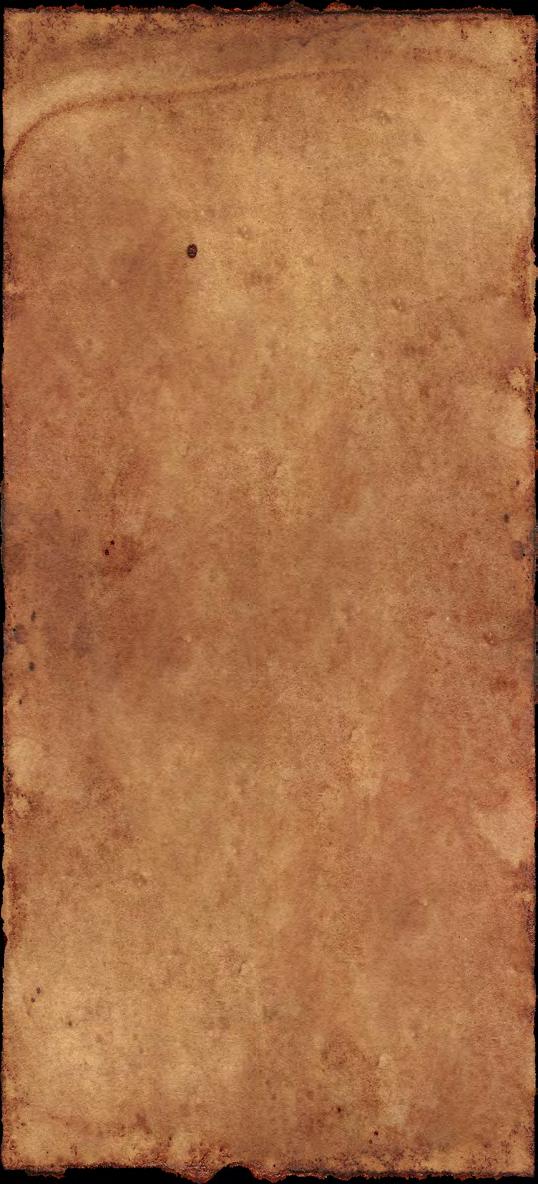

It’s an exciting time to be at Sherborne Senior School in the Sixth Form. Even though there were still challenges presented by the pandemic, starting our school year with a brand new Sixth Form with all the potential the new facilities will provide, was a huge bonus.
Once the new furniture arrived, we got a real taste of just how good our new facilities will be. The common room has really taken shape and there are plans for further additions, once we are allowed to provide refreshments. The open plan study zone and the quiet study rooms themselves, have proved especially popular.
With the further easing of precautionary restrictions, we can look forward to a return to normal, hosting events and leading the school. Even with many of the restrictions still in place, we managed to host the first “University fair” in the Sixth Form Centre, with 5 universities along with “Score Plus and the “British Council” represented. We were also able to run a “life skills challenges” afternoon during the last PSHE day when our Sixth Form leavers we set a number of challenges to help them cope with the challenges they are likely to face at university next year. The ironing and cookery challenges proved to be the most popular!
It has been, as ever, an honour to have supported our Sixth Form pupils in the next stage of their journey. I have been impressed by the hard work, commitment and dedication of our Sixth Form pupils who have been role models to the rest of the school.
I was especially pleased that we were able to organise and run the first Senior Gala Dinner for the pupils in Years 11, 12 & 13. There is a separate feature about this event elsewhere in the Shirburnian, but suffice to say it was a roaring success.
For our Year 12 pupils who have made the transition from the lower school, I would like to congratulate them for their contributions to the life of the Sixth Form this year. These contributions certainly mark them out as being a mature and resourceful group of pupils who are always willing to support our Shirburnian values. For those in Year 12 who are leaving us this year, I would like to take this opportunity to wish you all the very best on what I am sure will be an exciting and fulfilling future, wherever you happen to be studying.
For our Year 13 pupils, about to embark on the beginning of their adult lives, I would like to thank you all for the contributions, you have made, throughout your years at Sherborne, to making Sherborne the success it has become. It is through your mature and diligent approach to your studies that you will, I am sure, enjoy further success wherever you plan to study next year. I would also like to take this opportunity to thank our head and deputy head boys and girls; Sam Kinnaird-Barr, Mohamed El Sayed, Butool Abedi & Areen Al Hyassat, for all your support and hard work this year. Along with all the senior prefects, you have made another challenging year much easier to deal with. I thank you all for your hard work, support and encouragement.
And finally, to all of you leaving the Sixth Form this year, I would like to wish you every success in your endeavours for the future and hope that the values which you have demonstrated whilst in the Sixth Form, help to inspire you to ever greater achievement. You leave with all our very best wishes and hopes for the future.
Mr M Hamlin Director of Sixth Form

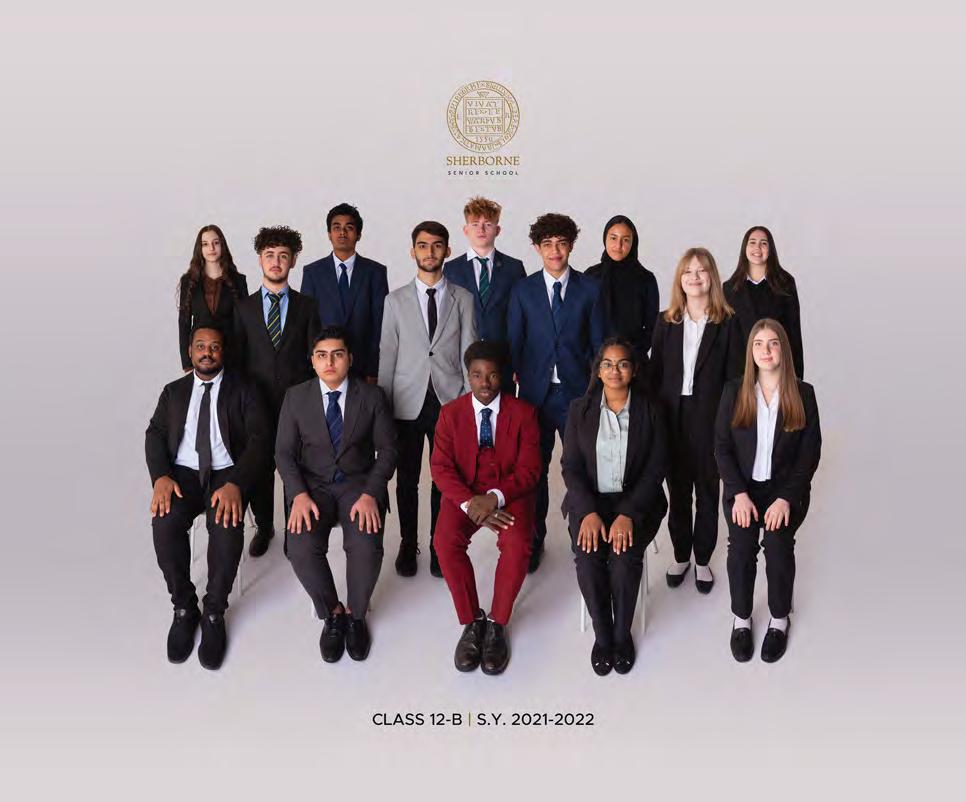

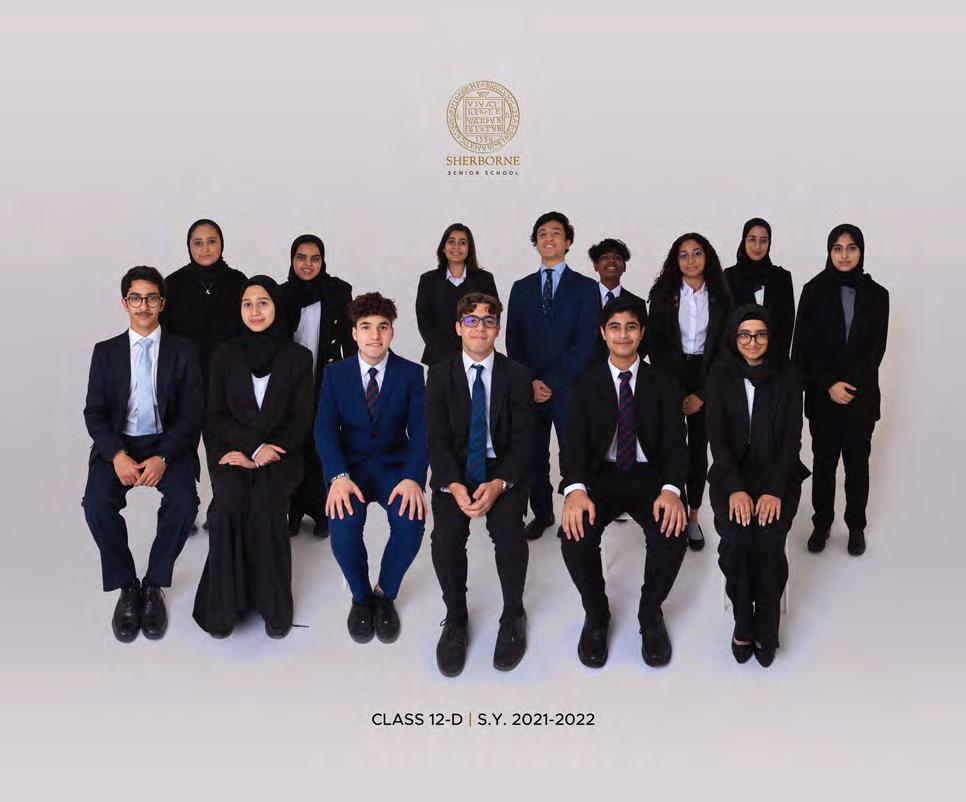

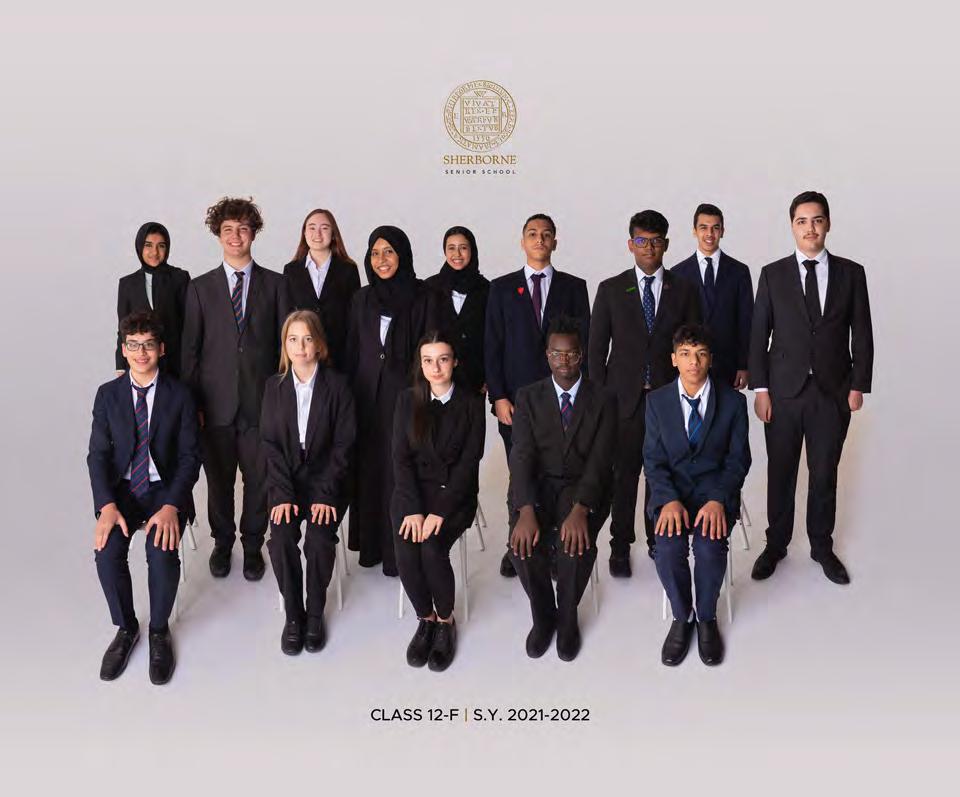


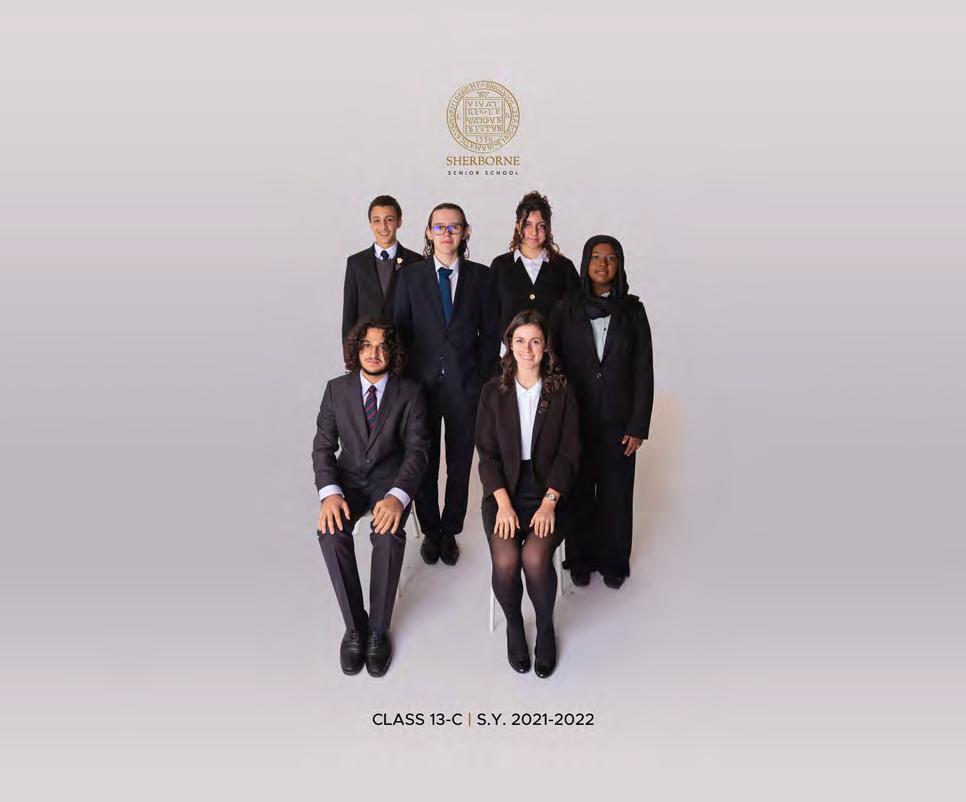
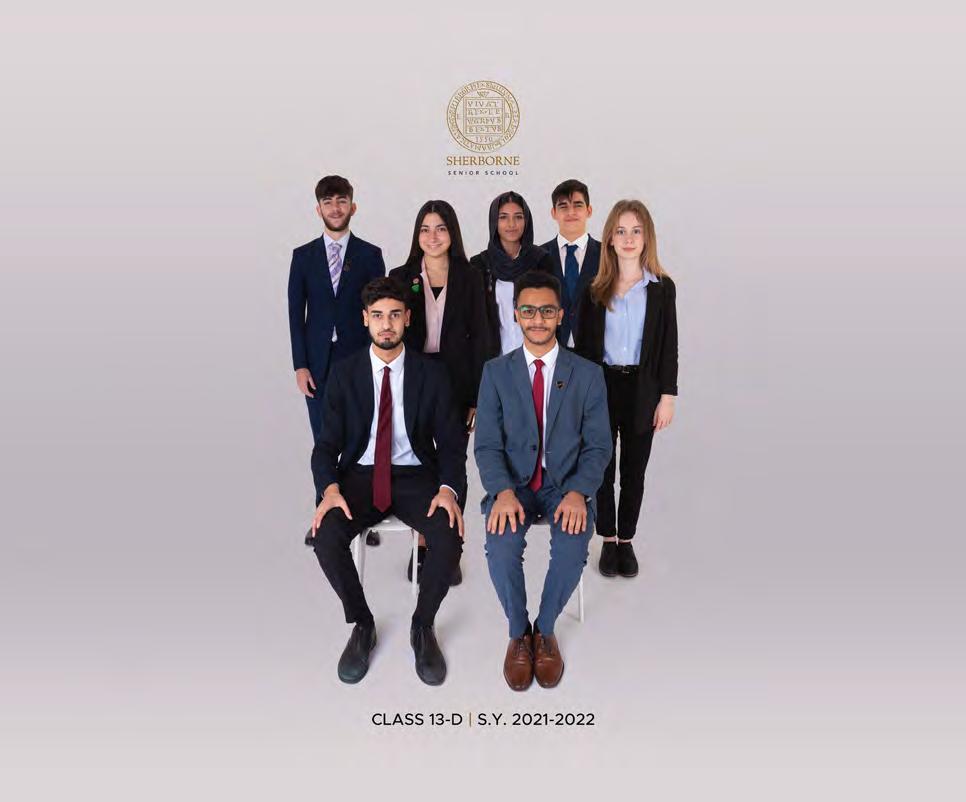
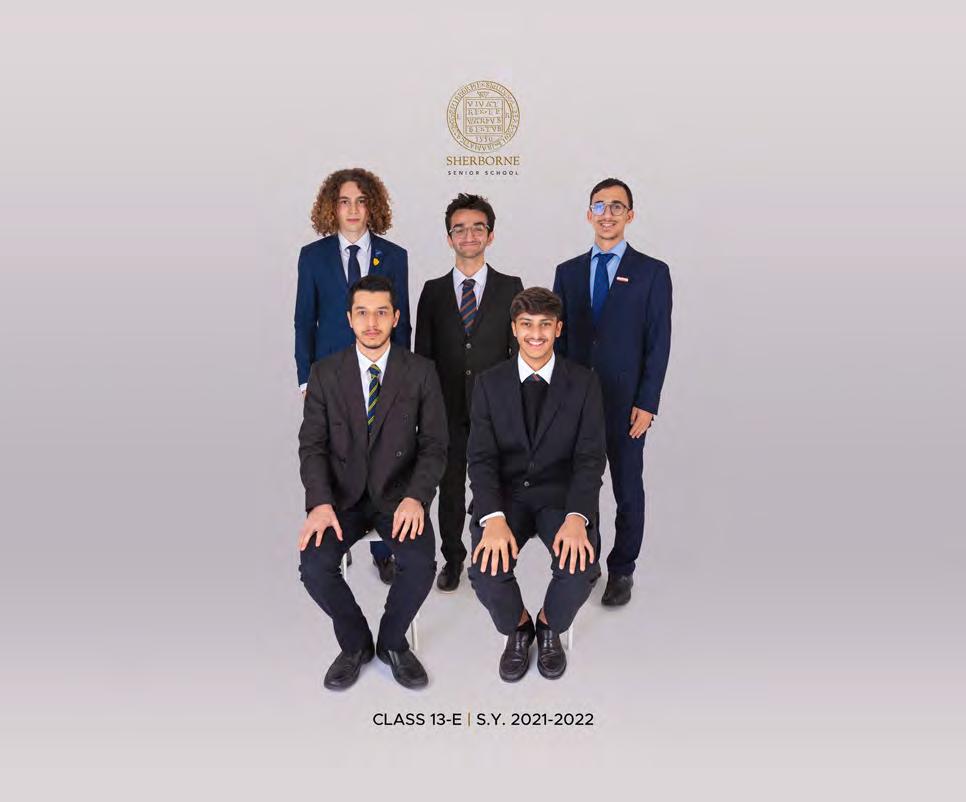
Congratulations to all in 12A for achieving so much in such unusual times. Throughout all the uncertainties, a barrage of new challenges and the ups and downs of readjusting to the ‘new normal’, you have all shown tremendous spirit and true integrity to reach the end with your heads held high. I’m sure you will all go on to do well in whatever you choose to do – you may well do it in your own distinctive ways, but I feel the future is very bright for each of one of you.
Mr Leeder, 12A
It is fantastic to see how much you have all matured and I hope you feel prepared for the next phase in your life. Know that education does not stop you from making mistakes, but it inspires you to learn lessons from them. Grab every opportunity that comes to you, this way you will be able to shape your life in whichever you
wish. For those of you leaving us this year, I wish you all the very best for the future and please pop in if you are around. “
Mr Arts, 12B
“12C are a unique bunch and it has been a pleasure getting to know each and every one of them – I am proud to have been their form tutor this year. They have brought positivity, humour and warmth to the form, as well as just enough drama to keep it interesting! I wish them all the very best of luck for their AS exams and know that they will be successful, managing the twist and turns along the way with resilience and determination. Here is to a great year next year, whether carrying on into Year 13 or moving on to new adventures!
Mrs Wolfe, 12C
I would like to begin by saying it has been an absolute pleasure tutoring you, 12D, this year.
You are a talented group of wholesome individuals who have carried yourselves with maturity and professionalism. Your wide ranges of humour have never failed to make me laughespecially our louder members! Moreover, I have admired how well you all treated one another, demonstrating the kindness and support you have all needed to get through this challenging year. I have thoroughly enjoyed getting to know each and every one of you, learning about your interests and aspirations, and would like to wish you all the best in your next steps.
Ms Mohamed, 12D
It has been an absolute pleasure and a rewarding experience to see you all developing as young adults. Having the opportunity to get to know you as individuals and to share in your accomplishments throughout this year has been
extremely fulfilling for me as your tutor. May you continue to seek excellence as you move on to pastures new whether it be continuing your educational career at Sherborne or embarking on a new and exciting chapter in your life. I wish you all the absolute best for your future endeavours.
Ms Rudling, 12E
It has been a pleasure to be your form tutor this year 12F. You have made my life as a tutor very easy this year through your approach to your studies and the helpful advice you have passed on about life in Qatar. I still remember the first day when I was being shown around the new school site by some of you as I had only just left my period of hotel quarantine! I wish you the best of luck in the next step of your own journeywhether it is at university or with the school next year - and hope to hear about your future successes.
Mr Martin, 12F
I have thoroughly enjoyed having you all in my tutor group this year. You are a lovely group of individuals who have so much to offer and I know that I know that whatever direction you take your spirit and kindness will take you far in life. I hope to hear about all your exploits in the future. Wishing you every success.
Farewell to 13A
Who could predict what a hard year it’s been,
And all the things we have seen, But come through it you have done,
And on the way we have had some fun.
So off you go to adventures new, I hope all of which is enjoyable too.
Butool to your Social Sciences adventure, Sam a year to think it through, Rose to your sporting endeavours anew.
Omar further study of Politics and
Economics, Natesh and Daniel Business Studies abound, Libby a year of experience on Cornish ground. Areen to study Dentistry, in a new country.
What a plethora of directions you all go in.
My words of wisdom are simply this,
Go and enjoy, for time goes so fast,
And I hope you all find university a blast.
Ms Gregory, 13A
What an incredible journey this has been! I have known you all in some capacity since Year 10 so I have seen all the ups and downs and highs and lows. It has been a pleasure to support you and back you along the way. You are all amazing in your own right; your skills, your characters, your strengths, your kindness. I am absolutely sure that you will go on to be successful in wherever life takes you. I will always be here for further support if required, a teachers job is never done! Wishing you all the very best. (Shaheen, it was truly a crime that you were removed from our form haha!!!).
In the words of the Prophet Muhammed sws; “Be in this world as though you were a stranger or a traveler/wayfarer.” Go, travel, explore, and enjoy life to its fullest.
I am so excited for you; you have so many adventures that lie ahead.
Ms Sultana,13B
I want to wish you all the very best for your next chapter in life. You have come so far in just the short amount of time I have known you and it has been a genuine honour going through this year with you. I have enjoyed learning so much from you all, whether that be about biology, music, TikTok, religion, or humour and
I have enjoyed teaching you so much about…well, hopefully something! Being a ‘guide on the side’ of your final journey here at Sherborne has been a wonderful experience and I sincerely wish you all the luck in the world with whatever comes next in your life. Do not be a stranger!
Mr Pallett, 13C
It has been an absolute pleasure to be your form tutor during your time in Sherborne’s Sixth Form. I am so proud of your determination, resilience and good humour during the most challenging of times. It has been rewarding to see you all mature and grow into the confident young adults that you now are. I am confident that you will all achieve the results you deserve when the A level results are published in the summer and look forward to hearing from you in the future with updates about your chosen pathways.
Ms Parsons, 13D
To the five gentlemen in 13E, it has been my absolute pleasure to be your form tutor in my first year here at Sherborne Senior School. I will always have cherished memories of our daily chats, working together to create your university references, and our intense but healthy debates! All five of you are unique, resilient, and tenacious young men and I am sure each of you will fulfil the potential you are brimming with. Until we meet again, farewell, good luck, and always remember to ‘strive’!
Mr Reynolds, 13E

On Thursday 31st April we had our inaugural Senior Gala Dinner for pupils in Years 11, 12 and 13. It was held at the White Palace function rooms on the Pearl, part of the Yasmin Palace Restaurant. The event was to celebrate those in Years 12 and 13 who are leaving Sherborne Senior School this year, as well as to celebrate the milestone of finishing Year 11 and the lower school. The event was extremely popular and those that attended enjoyed the dinner buffet alongside photo opportunities with their friends overlooking Porto Arabia.
After dinner, with a few words from the Director of Sixth Form, Mr Hamlin and the Head of Year 11, Mrs Hamlin, the Head Boy, Samuel Kinnaird-Barr and the Head Girl, Butool Abedi make a short speech to mark the occasion.
Representatives of the Year 11 School Council Executive Committee: Habiba Shehata and Abdelrahman Ghanem sprinkled the evening with their heartfelt and witty speeches.
There was then the highlight of the evening with an opportunity to relax and unwind with the pupil awards which celebrated the fun side of life at school. These entertaining awards were voted upon by the pupils themselves, with the winners receiving comedy awards to match the category that was won.
• Fearless: Joud Al Hares
• Life of the party: Basel Elfaki and Daisy Kinnaird-Barr
• Pack leader: Maryam Ghaly
• Innovator: Isabella Ventorim
• Comedian: Ali Awadallah
• Chatterbox: Zeyad Mosharraf
• Class clown: Adam Suteu & Sameer Mohammed Sameer Issa
• Insta star: Tamim Abdulfatah and Zeina Hassanein
• Gentle Giant: William Selwood
• Drama queen: Omotoyosi (Zainab) Olagunju
• Best female duo: Nadeen Khalil and Ella Haddad
• Best male duo: Mikyle Awan and Ziyad El Ansari
• Class clown: Amr Abu Shehab
• Most likely to become a millionaire: Mohamed El Sayed
• Biggest spender: Tameem Elnaas
• Most likely to get away with murder: Aaron Swindell
• Most likely to have a reality show: Nadeen Yosif Khalil
• Most likely to become president: Butool Abedi
• Most likely to die in a zombie apocalypse: Areen El Hyassat
• Most likely to kidnap Mr Hamlin: Sulaiman Khan
• Drama queen/king: Hadeel Dossa
The evening closed with some further photo opportunities and a chance to reflect on an evening of celebration and fun. We hope to make this event an annual celebration to mark these important milestones in our pupils’ lives.
Mr Hamlin & Mrs Hamlin

”Laugh. There’s humour to be found everywhere, even your darkest days there’s something to have a joke about.”
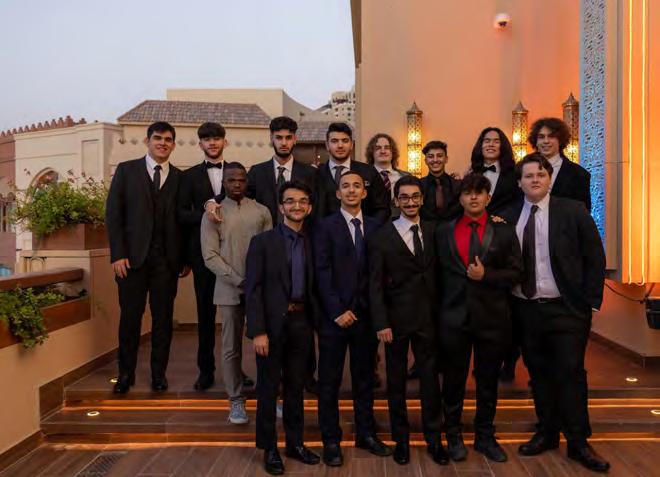

”Be generous and kind because you can’t take it with you. When you’ve got something to give, give it without hesitation.”

”Don’t worry about other people’s opinions. Everyone’s a critic, but ultimately what they say only matters if you let it.”
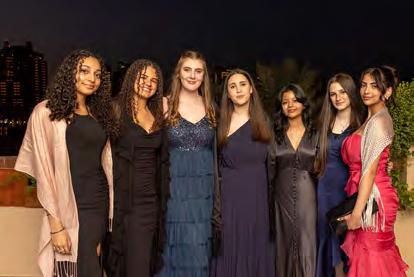
”Whatever you do, always give it a good go. Don’t be afraid of failure and disappointment.”

”Don’t take yourself too seriously. People who take themselves too seriously are boring.”
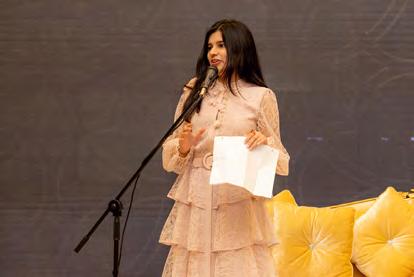
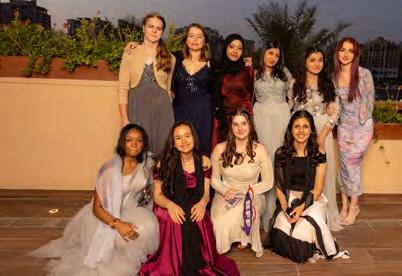
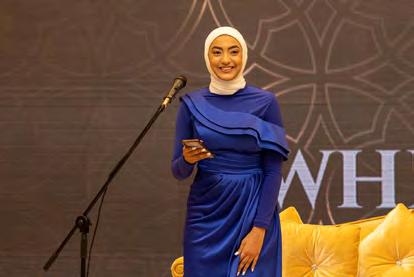
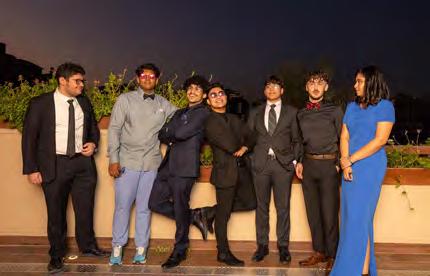
”Don’t take yourself too seriously. People who take themselves too seriously are boring.”

”Be yourself. If someone doesn’t like you, they’re either stupid, blind, or they’ve got bad taste. Accept who you are, you’ve got no one else to be.”
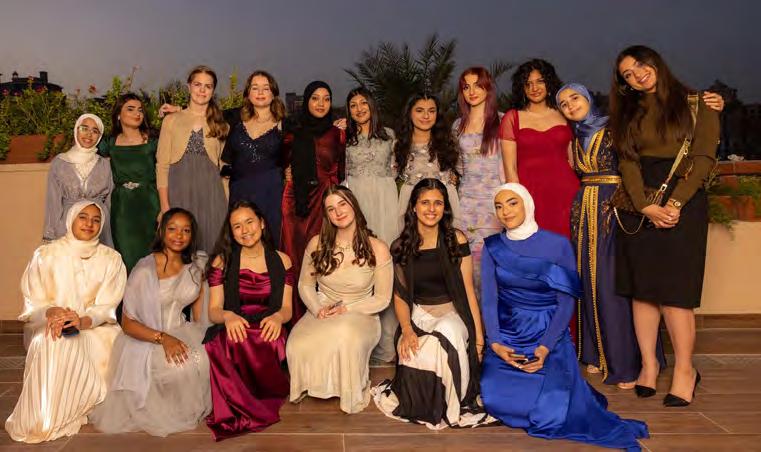
”Never, ever, ever, ever give up. Keep on punching no matter what you’re up against.”





“The school fosters and enhances a feeling of togetherness and friendship.”
BSO Report, April 2022
The members of the School Council are voted for by their peers. They provide an important “voice” for all pupils making suggestions on areas such as the structure of the day, uniform, enrichment and mental health, and raising pupil concerns especially relating to the impact of COVID-19 and returning to the ‘new normal’. Pupils in Year 11 and 12 are shortlisted for interview by the Heads of School, whilist other years pupils apply for the role as Form Reps, and Year Assemblies.
This year the School Council has done a tremendous job in highlighting the benefits of being educated at Sherborne, impressing the inspectors from BSO and QNSA with their maturity, awareness and enthusiasm. The names of the School Council members are listed below:
YEAR 13
Gul E Butool Abedi – Head Girl
Samuel Kinnaird-Barr – Head Boy
Areen Al Hyassat – Deputy Head Girl
Mohamed Elsayed – Deputy Head Boy
YEAR 12
Fatima Al Hajri
Raja Hasnain Shahib
YEAR 11
Habiba Shehata Abdelrahman Ghanem
YEAR 10
Sana Ali
Mohamed Abdelrahman
YEAR 9
Najlaa Al Hajiri
Nuran Abdalla
YEAR 8
Chi Chong
Yusuf Haq
YEAR 7
Mousa Al Hares
Ali Shah


Sherborne has been vital in my development over the last few years. The close-knit community, the access to many different enrichments activities, the constant support from teachers in academics and much more has helped strengthen and develop me into the well-rounded person I am today. Sherborne will always be seen as my foundation when I look back at my school years in the future.
By Samuel Kinnaird-Barr, Year 13
Firstly, I would like to congratulate my fellow students for reaching such a vital milestone in life. I would also like to take this opportunity to thank all our teachers and the school in general on behalf of all 2022 leavers. Thank you to all our subject teachers for adapting their teaching to a completely unforeseen pandemic. Thank you to all our form tutors for providing non-academic support, especially for their help with university applications. A special thank you to Mr Hamlin for trying to make this difficult year memorable. This includes organising a go-carting trip outside of school and of course the Gala Dinner, an extremely sweet and unforgettable night. Thank you also for organising tonight’s event: Sherborne’s very first Graduation Celebration. These events add much to making the Sherborne Sixth Form experience even more enjoyable.
As young adults, we are all discovering our distinct paths and moving onto new beginnings. I know that we will all cherish the memories that we have made at Sherborne and take forward all that we have learned. What we learned over the years is far greater than what textbooks have taught us. The Sherborne values displayed by many students here in their day-to-day lives are commendable. We are kind, honest, and dedicated individuals who work well together, creating a profound sense of community at this school. These Sherborne values that make us well-rounded are essential in future endeavours and success.
The great philosopher Rumi once stated, “you are not a drop in the ocean. You are the entire ocean, in a drop.” With most of us either attending university in September or choosing to take a gap year, this lesson is important to remember. All of us will go onto meet new people, make new friends, and pursue our own goals. Life will be overwhelming at times, perhaps causing us to feel lost, but you must remember and believe that you are complex, valuable, and worthwhile. In sight of larger ambitions, you should not forget to live in the moment.
I wish everyone the best of luck on their future endeavours and hope that we take lessons from our years at Sherborne.
Thank you and farewell.
By Gul E Butool Abedi, Year 13
This school has been a huge part of my life. I am very grateful for the all memories and friendships I have made during my time here at Sherborne Qatar.
I am also very thankful to have been a part of the Senior Student Leadership Team, along with my peers. It was a great experience and we hope to have made promising changes to our school. We are all very appreciative of our teachers and heads of year who have supported and encouraged us to do our very best and transition smoothly between each year. Sixth Form has been has been wonderful, especially at the new campus. It truly has been a memorable 5 years for me and I hope the rest of the school enjoys it’s time time here as much as my year did.
By Areen Al Hyassat, Year 13

At Sherborne we believe that our pupils are the “leaders of tomorrow” and also in looking after the physical, social and emotional health of our whole school community. Health Champions is a new iniatitive started this year, which support and promotes both aims.
Targeted at Year 7, Year 8, Year 9 and Year 10, each Form has a nominated a Health Champion who act as role models, and help deliver brief presentations to their tutor groups on prominent health matters. The Health Champions have been mentored by pupils from Medical Club, who have created a series of short PowerPoint presentations on topics like sleep, screentime, nutrition and hydration, dental health and exercise.
The Medical Club Leads train the Health Champions in how to deliver the presentations. The Health Champions then lead a session in a Form-Time at the start of a week, with the purpose of stimulating discussion around the given topic. To help pupils evaluate and reflect on the topic further, each pupil is asked to keep a diary relating to that topic for the week, with a view to consulting with parents in order to change routines or habits if necessary.
Special mention goes to Shahad Al Shaheen Year 12, Lina Dossa Year 11 and Raima Naweed Year 12 who have led on the training and creating the powerpoint slides.
Quote from Rameen Arefen, Health Champion, Year 9:
“Since COVID-19, many of us have put our mental and physical health on hold, which has resulted in us feeling more stressed and tired than usual. The Health Champions program is an initiative aimed to help students improve their health and raise awareness about important matters relating to our well-being. Through presentations and activities, the Health champions educate students in their classes on a variety of topics, from oral hygiene to the importance of sleep schedules to help them be more active and fit, as well as health aware. They are important ambassadors and a crucial part in the school’s goals to create a healthy, safe and nurturing community.”
The importance of this role is reinforced by Lucca Hanna, Year 7:
“As a Health Champion, I promote a healthy lifestyle to pupils and teachers by motivating them to take part in more physical activity and adopting good eating habits. This project has been greatly successful in raising awareness of how physical and mental health are interlinked and their importance for one’s well-being.
During my time as health champion, I have delivered several speeches with topics ranging from personal hygiene, active lifestyle, mental strength to facts about the human body.”
“...a well-planned and flexible curriculum that is designed to meet the varying needs of the pupils.”
BSO Report, April 2022
YEAR 7 HEALTH CHAMPIONS ARE:
Meher Ayob, 7A
Lucia Hanna, 7B
Ibrahim Abdalla, 7C
Zeena El Gebely, 7D
Syed Hussayn Shah, 7E
YEAR 8 HEALTH CHAMPIONS ARE:
Zara Ahmed, 8A
Maryam Al Kaabi, 8B
Renad Abdelrahman, 8C
Al Reem Al Hajri, 8D
Abbas Ahmed, 8E
YEAR 9 HEALTH CHAMPIONS ARE:
Faye Al Assadi, 9A
Hamda Al Naimi, 9B
Rameen Arefeen, 9C
Omotayo Olagunju, 9D
Omar Al Masri, 9E
YEAR 10 HEALTH CHAMPIONS ARE:
Abdullah Hamud, 10A
Karam Saleh, 10B
Rebecca Mathew, 10C
Daniel Saldanha, 10D
Elio Karam, 10E
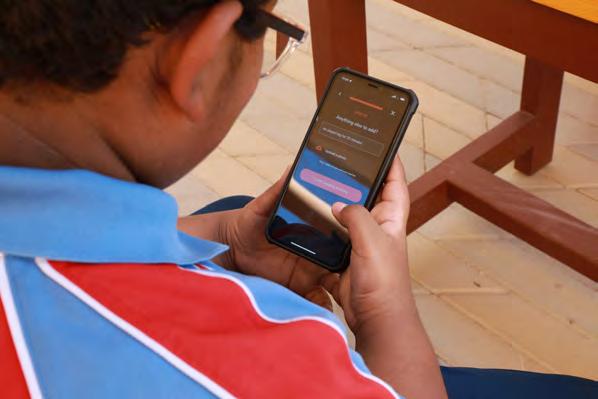
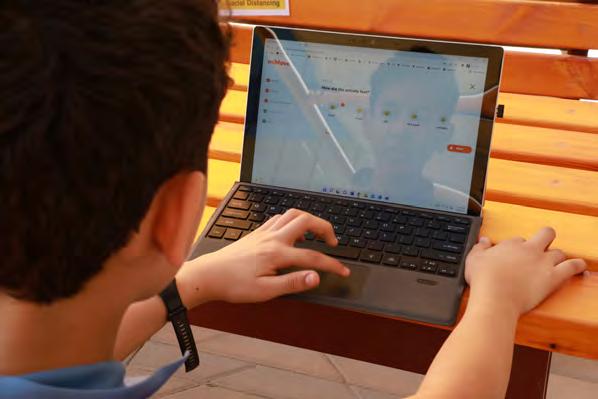


The Ministry of Education and Higher Education (MoEHE) announced changes at the end of the previous academic year for all schools in Qatar which impacted on how the department was run. It became mandatory for all Qatari pupils and Arab passport holders to study Arabic as a First Language and Islamic Studies in Arabic whilst all Muslim pupils, regardless of nationality, needed to study Islamic Studies in Arabic or English.
In Key Stage three pupils studying Arabic and Islamic Studies as a First Language continued with the MoEHE course, developing their language skills and further understanding the foundations of their religion. Pupils learning Arabic as a second language developed their speaking, writing, listening and reading skills with more of an emphasis on the speaking component of the course. In Islamic Studies for English pupils studied from the Isyllabus for School’s workbooks, which concentrate on a deep understanding of Islam (pillars of faith), Imaan (pillars of belief) and Ihsan (perfection of religion). Our i/GCSE and AS pupils have worked extremely hard to prepare for their examinations this year. We hope that they get the results that their hard work merits, inshaAllah.
The school had a QNSA inspection during the first term of school, where much of the focus is on the running of the three compulsory subjects; Arabic, Islamic Studies and Qatari History. The inspectors were impressed with the way the department was run and the provision the school makes for all the learners of different backgrounds. The first term ended up with Qatar National Day celebrations. Pupils were still under COVID-19 restrictions but managed to get involved in traditional Qatari games and an interactive quiz.
During Ramadan the department lead the with the Ramadan Charity Project. Pupils donated items that were distributed to approximately 100 local workers that work in the proximity of the school. Well done to everyone who participated in the Qur’an competition which took place in the second week of Ramadan. Special mention must be made of Maryam and Khadija Ghaly who have memorised the entire Qur’an and both coming in at joint first position. Khalid Al-Asfar and Nouran Shehata also came first in a different category for memorisation. Well done to all those who participated.
COVID-19 restrictions have made it a testing time for us all. Things are beginning to settle down and we look forward to going back to normal learning environments. With the upcoming World Cup, it promises to be a much more positive academic year insahAllah!
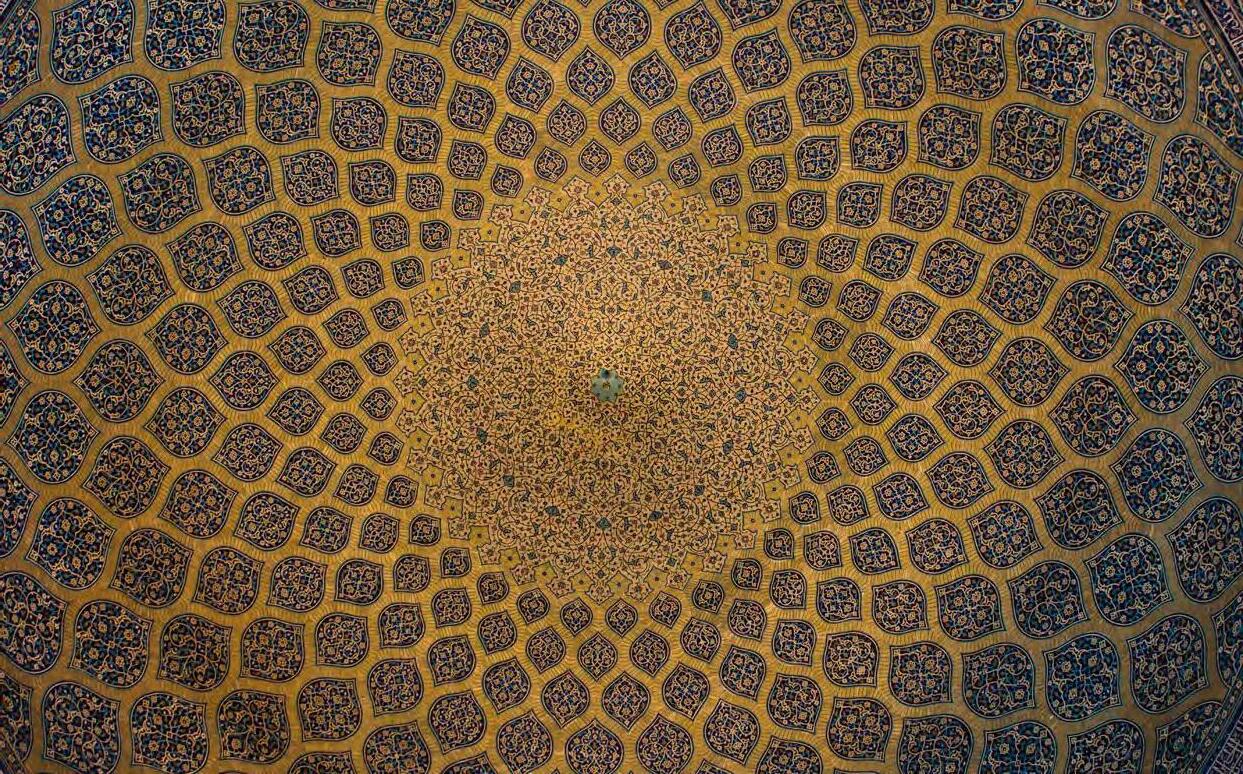
Mr Rahman
Head of Arabic & Islamic Studies
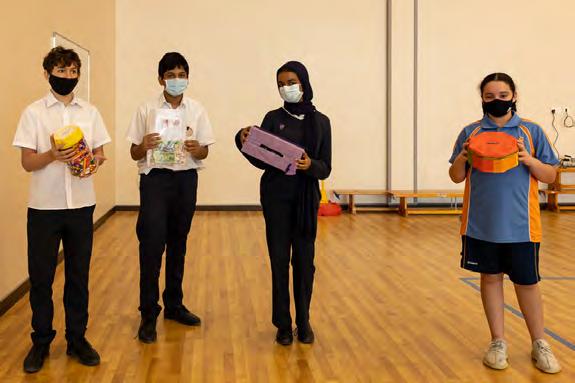
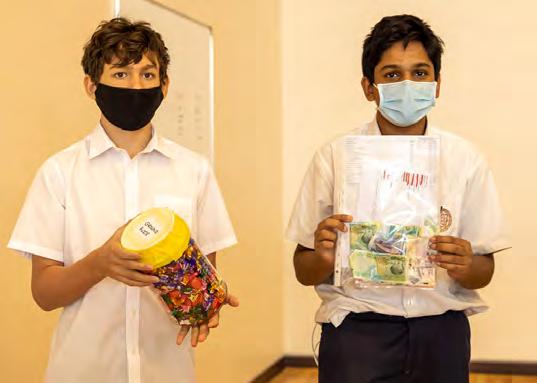
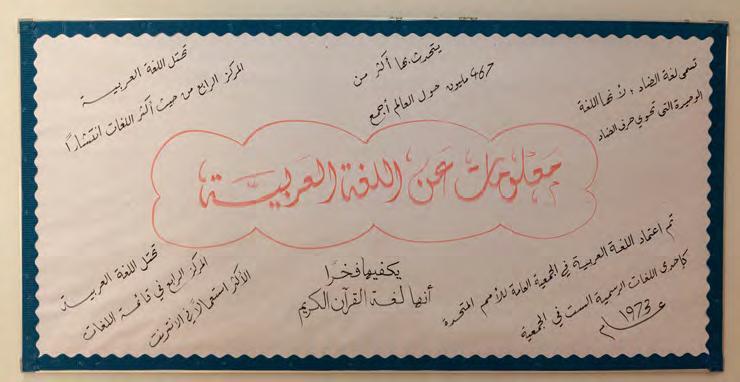
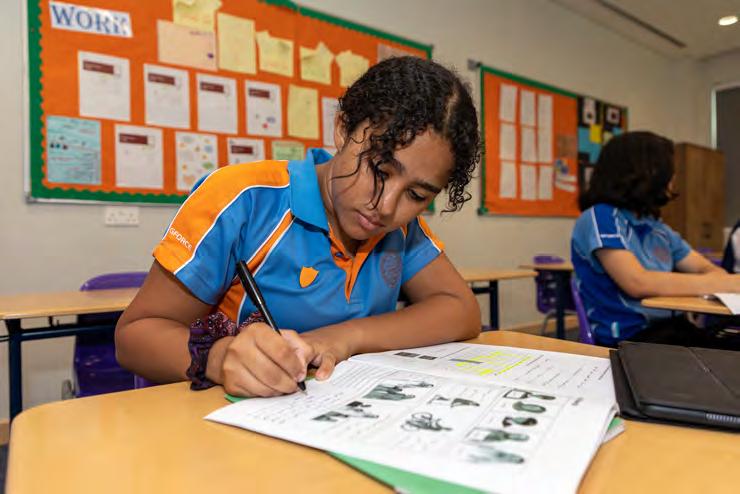
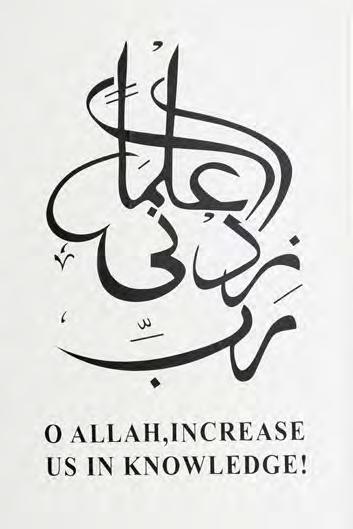
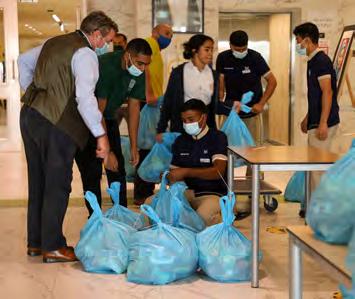

It has been a year of transition in Qatar History and Citizenship as the curriculum has been greatly changed. History is now only a small part of the syllabus as over 90% of the course is now focused on Citizenship, perhaps in response to the challenges Qatar has faced since 2017.
Pupils learnt about topics such as Rights and Duties, Democracy in Qatar and building tolerance and coexistence within the country. For the first time pupils were also tested and it was pleasing to see over 95% of pupils achieved a passing mark. Unfortunately, due to COVID we have been unable to take pupils on any trips, but we hope this will change next year as Qatar opens up.


We started the year with an exciting move to a brand-new campus, moving into large fully equipped art rooms. We have celebrated this move with an ongoing mission to display all the outstanding artwork the pupils have created, alongside developing a permanent gallery space to exhibits pupils’ artwork.
Despite the initial beginnings of online and blended learning both staff and pupils were eager and full of positivity to embrace the new academic year and whatever challenges were thrown at us due to the restrictions.
We have had excellent i/GCSE and AS submissions and as usual a very dedicated cohort of young and inspiring artists. In this year’s edition I wanted to showcase artwork that celebrates and underpins Sherborne’s, ethos of perseverance and tenacity. One such pupil is Marie Cabibihan who spent the entire Year 10 of her i/GCSE Art Course at home in isolation. The determination and positive mindset that is needed to develop and create artwork on your own is nothing short of miraculous.

One of the art department’s aims when moving to the new campus was to showcase pupils’ artwork to a greater audience. We have some amazing artists at Sherborne and we wanted to get pupils’ work out of the art studios and seen by a wider audience. In September we were delighted to announce the Artist of the Month Award. As well as celebrating the actual artwork, this initiative helps shine a light on the artists in question and gives an insight into the ideas and processes behind the finished work. Each month a pupil is selected from across all years for his or her effort, imagination and skill. An artwork by the chosen pupil is displayed in the reception for the entire month and is§ published on the school’s social media. Along with the artwork, an interview with the artist explaining the background to the piece helps give us a better understanding of the artistic journey.
Uneiza Haque, Year 12
Matilda Von Lutzow, Year 11
Haya Obaidan, Year 11
AlJori Al Kuwari, Year 12
Hamza El Sayed, Year 9
Serene Salem, Year 10
Habiba Shehata, Year 11
Embarking on any i/GCSE, AS or A Level Art course requires tenacity and skill and the artwork represented in this year’s edition showcases this. The above artists are an inspiration for our budding artists in the lower years and it is very pleasing to see a Year 9 pupil, Hamza El Sayed, achieving Artist of the Month. As we start to return to normality we hope next year to launch new competitions and indeed organise trips again to visit galleries and exhibitions. The Art Department is immensely proud of the artwork the pupils have completed this year.
The Art Department
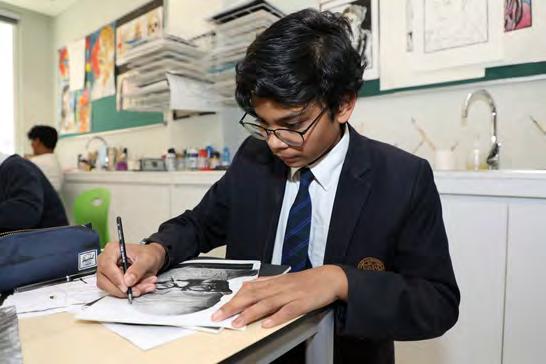



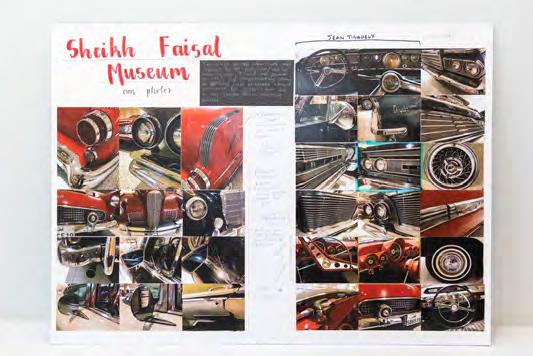
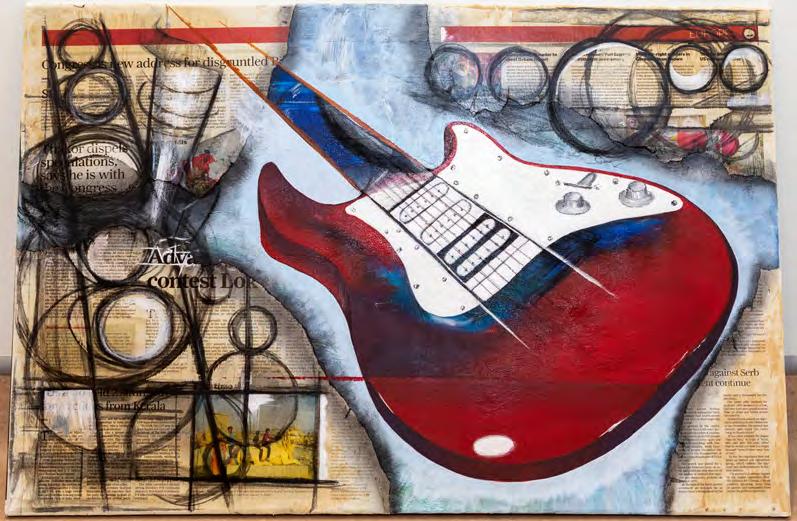
In the first half of the year, we welcomed Ghanim Al Sulaiti a 26 year-old successful Qatari entrepreneur to provide an intriguing talk to our pupils. Mr Al Sulaiti, the owner of a number of popular local brand: Evergreen Organics, Mylk and Botany spoke to our Sixth Form pupils about the rising trend of veganism. He also provided useful insight into how to overcome the challenges of owning a business during a pandemic. Interestingly, veganism and sustainability were topics that many pupils had a traditional perception of. However, this talk clearly opened the eyes of our pupils and motivated them to take a greater interest in making better lifestyle choices. This was in addition to opening up to the thought of being a vegan albeit whilst developing a greater understanding of why sustainability and veganism is a growing lifestyle trend among many around the world.
As part of our drive to enrich the business mind-set of three of our pupils, the business department took part in the Business Olympic Program for Schools (BOSS) in which we proudly obtained 17th place out of 95 schools globally. Sixth Form pupils, Muhammad Abdullahi, Mubarak Al Sulaiti and Andhrea Nicole, were the representatives for Sherborne Senior School. For titles of the best virtual managers, they were competing against teams from around the world across 46 countries for 12 weeks.
With the assistance of Revas Business Simulation Games, the participants were managing their own virtual travel agencies for 7 virtual months. During this time, they played 7 rounds, making realistic business decisions, and testing various strategies for introducing services to the market. Virtual managers were competing in 11 virtual markets adjusted to the time zones of their schools. The competition in every market was very fierce, and the level of some decisions surprised even the organisers of the competition.
Congratulations to our pupils for taking part in the competition! We are very proud of the fact that our school provides them with a space for development and gaining international experience. We are looking forward to the next edition of the competition!
Mrs McCormack Head of Business & Economics
“Sherborne Senior School celebrates diversity and aims to create global citizens who are dynamic, creative, independent learners.”
BSO Report, April 2022



This academic year started with a unanimous and collective sigh of relief from both pupils and staff alike when it was announced that face-to-face lessons would commence again after almost two years of blended or online teaching. We settled comfortably into our orange-zoned classrooms in the new school building near MOQ and got on with the job of educating and learning. We also welcomed Mr Chris Martin to the English team and he became the second male staff member ever in the English department!
The Year 7 pupils started off in form classes and then moved into sets once they had completed their first assessments and diagnostic reading tests. They seemed to have found their feet over the course of the first term and assimilated quickly into secondary school life. Pupils were introduced to a range of literary genres this year: ranging from poetry to Shakespeare in the form of ‘Macbeth’, autobiographical texts like ‘Boy’ by Roald Dahl, ‘Chinese Cinderella’ by Adeline Yen Mah and finally cross-curricular work with the history department on the slave trade - using the text ‘Freedom’ by Catherine Johnson.
For the Year 8 pupils, it was exciting to be able to do some competitive work after so much online learning and the highlight of this was the Dragons’ Den competition where pupils were expected to create and then present a pitch for a new product on the market aimed at teenagers. Pupils were assessed in their sets and then the finalists presented their pitches again in front of a panel of judges, including Senior Leadership Team staff members and the Head Girl. Ivy Tavola was the ultimate winner with her unique spectacles invention.
It was decided that the focus of the Year 9 scheme of work this year would be on current issues that affect many young people in other parts of the world; so, the Year 9s started off reading the true story of ‘Iqbal’ – a boy in Pakistan who was a victim of child labour. They ended their academic year by reading ‘Refugee Boy’ by Benjamin Zephaniah and focusing their studies on the plight of child refugees globally.
The i/GCSE classes of Years 10 and 11 were happy for the return to normality finally and the prospect of external examinations again. Staff worked incredibly hard, especially with the Year 11 cohort, to get back up to speed and practise the important examination techniques again. Both year groups focused on the language papers and as most pupils take literature too as an additional i/GCSE subject, the literature texts of ‘1984’ by George Orwell and ‘Othello’ by Shakespeare, as well as a range of poems set by the examination board proved challenging and engaging. This year the Year 10 set 1 pupils studied ‘Great Expectations’ by Dickens, while the rest of the year group analysed ‘Life of Pi’ by Yann Martel. We should not forget our Year 11 ESL class who worked steadily on their listening skills and spoken and written English for their final CAIE examinations in all three of these areas.
The department also offers two AS and A Level subjects: English language and English literature and the uptake for these subjects was pleasing this year with record numbers of pupils opting to continue their studies in English. Next year, the AS subject General Paper will also be added to the mix.
Finally, it is with some sadness that we say goodbye to two staff members: Miss Aliyah Mahomed and Mr Dave Ball. Miss Mahomed is moving over to Sherborne Qatar School for Girls to teach English there from August and Mr Ball, after six years at Sherborne Senior School, is taking up an English post in Panama. We say adieu but not goodbye to Miss Mahomed, as we are certain that as a department, we will still have regular contact with her. We thank her for all her hard work and dedication over the past 18 months. We say a very fond farewell to Mr Ball who some of us have worked with for the duration of his years at Sherborne Senior School. As the only male member of the department for most of his time with us, (and for a long time as the youngest member of the department), he held his own, won our hearts and will be sorely missed. We wish him all the best with his new ventures!
Miss Castaldo Head of English

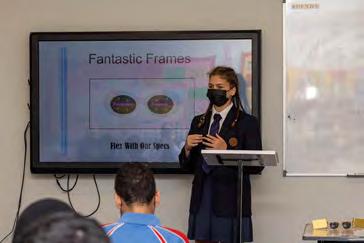
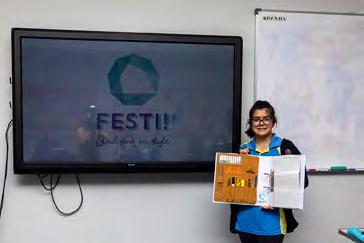
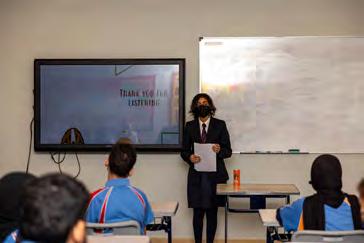
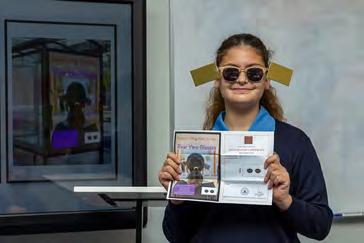

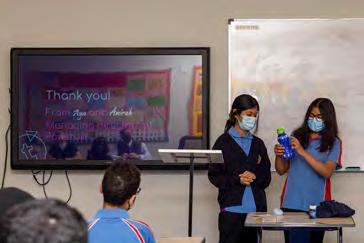

I stood upon the battlements, looking out upon the glen. What did I see? Nothing less than an army in surrender and in retreat, for their leader’s head was now affixed upon the battlements - the traitor MacDonwald’s, if I am to be specific.
But after such a battle, devastating the land and stealing the lives of so many of my brave men, was a respite, but a small rest, afforded to me? Nay. For the Lord of Norway and his army stood near; and that could not be allowed. So, forth Banquo and I charged, rallying our remaining men as we went. I do not believe the Norwegian expected such a bold strategy, for soon did he fall back with his army, rushing away from my post. And so, the battle was won.
As I stood beside my horse, the charge finished and a feeling of euphoria engulfed me. One of, if not my greatest, victory had just unfolded before me. It was an amazing feeling, one of utter glee.
“But” thought I, “I must think of the next step.” And so, I consulted Banquo, “What do you think the Norwegians shall do?”
“I believe they will remain at their current position. But now, my friend, we must go to King Duncan. I am sure a victory feast is awaiting us.” said Banquo.
With the battle behind us, we rode for King Duncan’s castle. But, once we rounded a bend of the road, Banquo’s eyes lay upon three ragged people perched atop a heath. He called out to them, and soon I did too. “Speak, if you can; what are you?”
“All hail, Macbeth, hail to thee, Thane of Glamis.”
“All hail, Macbeth, hail to thee, Thane of Cawdor.”
What? Thought I, Thane of Cawdor? Me? But the third woman had not said her words yet.
“All hail, Macbeth, that shalt be King hereafter.”
A feeling of confusion crept through me. I was not destined to be the King, for noble Duncan had already this position. They told Banquo a similar tale, predicting his future. I called to them, told these sooth-sayers to stay, to tell me more of my future. They vanished, disappearing to nowhere, and once again, I was alone upon the road with Banquo. But now, many more thoughts were rushing through my head.
Once we arrived at the castle, Duncan showered praise upon my head, to which I replied I was doing what I was ordered to do, and that it was my duty.
It was not long before Duncan revealed to us that his son, Malcolm, would become Prince of Cumberland. It was a time of celebration to be sure, but for me, the words spun round my head. I would have to become the prince to achieve the position of King. I prayed to the stars, to hide my plans and wishes.
By Arnav Anup Singh, Year 7
I looked at the lush green trees surrounding me, my only companions. Their rough, uneven coats of drying bark, covered by a plethora of exotic green vines, were each engraved with a unique pattern of spikey cracks. I guess that’s what made them so tantalisingly attractive to me, their uniqueness; something that had been forcefully snatched away from me at a very young age.
Without warning, my mind contracted with unbearable pain, as an unwelcome river of nostalgia flooded me…
A perfect world! A perfect world? In my world, there is no global warming, no war, no hunger, no pain, and also no choice. Is living in a safe, protected world where you are constantly shielded from the common dangers of everyday life, worth giving up your uniqueness, your freedom, your identity for?
That was the question I asked myself as I studied my reflection with disgust in the bathroom mirror. My black hair was combed neatly and my ugly blue eyes glinted as my sharp facial features twisted into a menacing scowl. The government bred us, as if we were dogs, making sure, carefully, that we all looked alike: blue eyes, black hair, same height and same weight. Our city was closely monitored by cameras, in extreme violation of freedom and privacy, yet nobody seemed to care.
That was when I realised I was different. In fact, different was an understatement; I was a lion in a flock of sheep, and slowly but surely people were starting to notice that. They said that the rules and regulations were for safety, for happiness, for security, and anyway, why choose a dangerous path and struggle for freedom when you can just live an easy, protected life? They were tortoises, carrying around large heavy shells that protected them but slowed them down. Their protection and ensured safety cost them their progress and free spirit.
Rejected by society, I decided to leave behind my gray world… For the next few weeks, I collected supplies for my runaway mission, packing basic necessities and stocking up on stolen food from the city’s kitchen. I knew that in order to survive, I had to be prepared. As the days passed, my courage seemed to shrink like the waning moon, letting my ensnaring nervousness grow, until, eventually, the day came.
Finally, I thought as I bade farewell to my previous home, it was time to see the real world: a wild, unpredictable, and most of all, unique world…
By Harshini RamKumar, Year 8
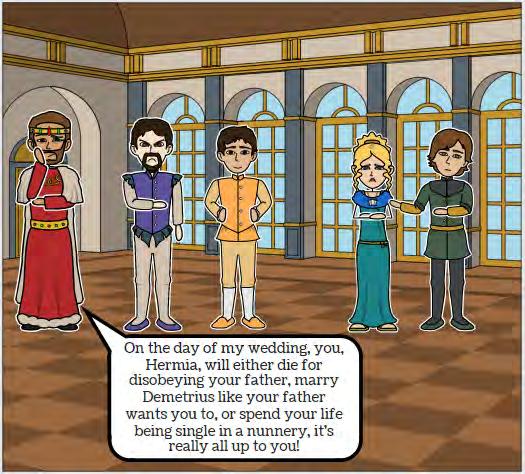

By Shireen Khan, Year 8
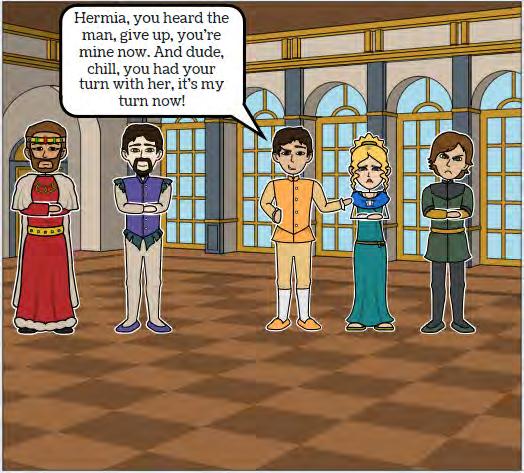
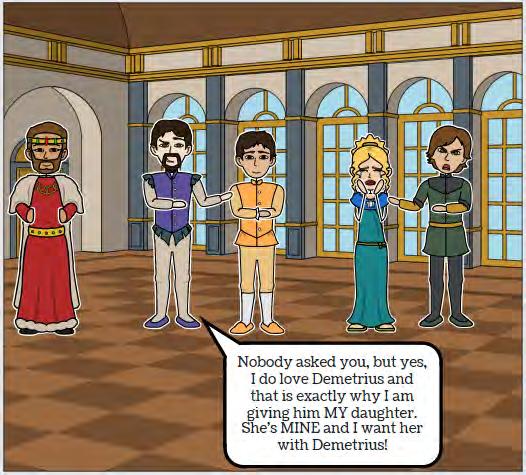

“...teachers create a positive and friendly learning environment, in which all pupils are able to clearly articulate their thoughts and feelings.”
BSO Report, April 2022

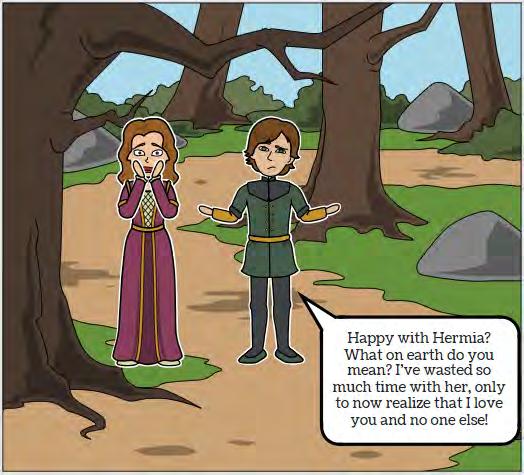
By Shireen Khan, Year 8


Dylan awoke to the sound of his own startled gasp. Beads of sweat cascaded down his pale, soft skin and his long, black hair perfectly rested on his broad shoulders. He sprang off his threadbare mattress and checked his alarm clock.
It was the third day of not taking his government administered pills and the effects had started to feel overwhelming. He could wake up whenever he wanted, feel his emotions and plan his own day. He should have felt light and liberated, but he was totally terrified. Nobody could know that he was breaking the most important law of land, so he had to try to conform to his usual routine in case his parents started to smell a rat.
In a similarly grey box-house a few straight streets away, Molly had awoken a few hours earlier and anxiety
was gnawing at her brain like a caged rodent. She looked out of her bedroom window and observed all the controlled citizens wearing the same clothes, getting into their black cars at the same time and leaving for their government assigned jobs. Looking at the process from the outside felt like watching a horror film; how had it taken her so long to mentally step outside of the sickening system?
The two teenagers boarded on the school bus at the prescribed time and travelled in stony silence. Only when they were alone at break time did they dare to discuss their situation.
“It’s not enough to just quit the pills,” Dylan insisted. “That’s only going to change us. We have to change the system and save everyone else.”
Molly shook her head so that her government regulated, long, blonde plaits brushed her shoulders.
“How can we possibly do that?” she frowned.
“They’re sharks and we’re minnows. We can’t fight this.”
‘Yes we can!” Dylan insisted as his blue eyes narrowed with determination. “Meet me outside the Ministry of Control at midnight. I’ve got a plan.”
After an ordered day adhering to the strict timetable, the pair went back to their homes, ate their bland rations, and incessantly checked their state-controlled watches. As midnight approached and the streets were eerily silent, they crept through the dark night until they reached the imposing, grey stone building.
“We have to find a way in,” Dylan whispered. “We need to find out how much they know.”
“We can’t do that we’ll get caught!” Molly protested.
“We might. But we might not,” Dylan stood firm.
“All I know is, we’ll regret it if we don’t even try.”
They looked up at the CCTV cameras that perched on the roof like vicious guard dogs waiting to attack. With pounding hearts, they backed up against the wall and slipped through the shadows until they reached two small, dark doors at the back of the intimidating building. They could see a glimmer of white light shining from under one of them, and hear the distant sound of muffled voices from within.
Suddenly, the door creaked and the voices bellowed near to them. They quickly darted into an alcove and, with wide eyes frozen in fear, they held their shaky breath and waited. As soon as the two dark figures exited the building, Dylan darted out of the blackness, caught the door with his foot and silently slid inside. Molly rushed to follow him.
They were in.
They tiptoed down an empty, narrow corridor, until they reached an enormous steel door. Dyan gently pushed it with the palm of his hand and Molly quietly gasped as it slowly opened. Inside, a vast wall was covered, from floor to ceiling, with flat screens. In the dim light, they caught sight of a single, red button on a metallic pillar in the middle of the expansive area.
Dylan was irresistibly attracted to it like an eagle to its prey. He lifted his hand, with his forefinger poised and ready to press down, when the doors flung open abruptly and the room was flooded with light.
They both jumped and Molly shrieked with fear. There, standing in the doorway, was a tall, bald, menacing figure in a fitted, black suit.
He looked them up and down and snarled, “I’ve been expecting you.”
By Ivy Tavola, Year 8
When I got the internship at Mira Industries, my parents and I were overjoyed! Who wouldn’t be if their only child began their career interning at the most successful, revolutionising business in our community? My mother made a celebratory dinner in my honour, and we stayed up until curfew, high on happiness. Of course, my parents may have been overreacting very slightly, pulling on my choppy brown hair and pinching my cheeks until they ached each time I smiled.
As I was pulling on my nightclothes, I thought to myself, ‘I can’t wait for tomorrow.’
When I opened my eyes again, I was in an unfamiliar place. There was a lot of heat as if someone had turned the radiators up to the top setting. A few trees were scattered around the plains and there was a large, jagged rock protruding from the ground. A lioness sat perched on the rock - the light giving her an ethereal glow. How I knew what the strange creature was called I don’t know - words were flowing into my head that I had never heard of before, like ‘savannah’ and ‘sun.’ She noticed me standing there, and with a series of facial gestures like slightly raising a brow or tilting her mouth, said to me, “We’ve been waiting for you.” It didn’t feel menacing though and I felt like I had been here my entire life.
I looked around more and noticed a ruckus in the tall grass nearby but before I could step forward and get a closer look, everything went black.
I saw the lioness again the next night and this time she was taking care of three small lion cubs. I watched curiously as she tried to lick them clean, ultimately giving up as they escaped her reach. Two of the cubs had climbed on top of her, pulling at her ears for attention. What intrigued me most, however, was the smallest club. He, unlike his siblings, was sitting down peacefully, watching them fool around. He then faced me, head tilted to the side, staring at me curiously with piercing icy white eyes. The cub then jumped up, running towards me and making himself at home by my feet, brushing away his mother’s calls for him.
For months I had these dreams, each time learning more and more about these animals, and those which inhabited different places like, ‘oceans’, ‘deserts’ and ‘rainforests’, but I would always come back to the savannah, to the lion cub with piercing, icy white eyes, whom I had unofficially named Leo.
My dream started off as usual, in the savannah, this time by the waterhole. The Sun (which is actually a huge, fiery ball of gas suspended in space) cast down beams of light, reflecting off the water. Bright pink flamingos were relaxing by the side of the water, ruffling their feathers as hippos submerged themselves. Zebras were grazing, whilst antelope were roaming freely around the plains. The lions, who had grown impressively since I had first seen them, were laying on the rock I had seen their mother upon. Upon seeing me, Leo sauntered up to me almost lazily, nuzzling into my side affectionately. It all started as a dull thump; the vibrations shaking the ground like a heartbeat. Animals looked up in alarm as the pace quickened and that was when the first shot rang out. Time seemed to slow down as a golden bullet sliced through the air, lodging itself into the flank of a young elephant. It let out a sound which seemed like a cross between a hoot and a whimper, before falling to the ground to the ground with a thud.
The next moments were a blur as the distinct bang of another succession of shots bled out, death trailing behind them. Within seconds, the once pristine waterhole reeked of crimson blood as bodies fell to the ground. There was pandemonium as animals attempted to flee, only to be shot down mercilessly, until only one was left.
Leo sat in the centre of the bloodbath, alive but not unharmed. One of his ears had been shot clean off, whilst a front leg was bent at an unnatural angle. He growled as menacingly as he could as men in green, camouflage suits surrounded him, hundreds of guns trained on him at once. Based on how no-one spared a glance my way, I guessed that they could not see me.
As they were about to rain hellfire on him, a shrill voice shouted, “Stop!”
A woman clad in leather stalked up to Leo, soldiers parting for her like the Red Sea. Shooting two consecutive bullets at him, she dragged Leo by the mane, pulling him to eye level brutally.
“Night, night,” she whispered tauntingly, before letting him go, Leo falling limply to the ground.
She turned around and faced her mercenaries, arms raised awaiting applause. As though sensing my presence, she looked in my direction, smirking maliciously. It was then that I saw her face, and knew exactly who she was, who didn’t?
Her blood red lips were pulled in a cunning grin, beady eyes scanning everything as the sunlight made her pale skin seem translucent.
Leo was still laying on the cursed ground, panting heavily and gasping for air when I saw him disappear, as though turning invisible. Slowly, the bodies of all the martyred animals faded away, as if they were never there, a foggy purple mist creeping its way across the once thriving savannah and removing any trace of previous life.
I woke with a jolt, mind reeling. My face was hot and cheeks damp; I had been crying in my sleep. Confusion made itself comfortable in my mind as questions hijacked my train of thoughts – why would a woman like Sybil Mira kill all of the animals?
By Syeda Kulsoom Rizvi, Year 8
‘Where on earth have you been?’
‘Goodnight Rue! Goodnight Alfie!’ My aunt wished us as she softly kissed our heads.
‘What, can you tell us a story?’ I begged.
‘Okay Rue. But quickly!’ she agreed. As Rue started jumping up and down in excitement, my normally patient aunt began to tell us a story about our mother. ‘Your mother was a wonderful, kind person. She had travelled all around Earth and worked extremely hard to fulfill her dreams’. My aunt smiled as memories rushed into her head and flashed across her face in pleasure.
‘To become an astronaut?’ cried Alfie, my twin, innocently.
‘Yes Alfie. And to go to space!’ As she continued her story, my own breathing got heavier and deeper as I began to think about my mum. I wished she were here with us now.
My aunt finished the story, hugged us and turned off the light, biting her lip repeatedly as she walked away.
Waking up the next morning feeling ecstatic, I buzzed with excitement remembering this was the day we could go outside. Feeling desperate to leave, I impatiently woke up my snoring brother and laughed as I watched him realise that this was the special day, the day we had talked about for so long leading up to it. Grabbing my spacesuit, I rapidly threw it on and sprinted as fast as I could to my aunt’s room. The suit fell down my arms and legs, was cloudy white and filled me with cheer whenever
I saw myself in it.
My aunt was clearly as excited as us. ‘Today is the day. The one day when we can go outside… so let’s make the most of it!’ she screamed as she tightened our oversized suits. As we strolled through the spaceship, we passed multiple scientists who were still, today, working on making the planet more habitable for humans.
Finally finding our exit door, it automatically opened for us like gates to a heavenly place and we went out.
As quick as a flash, I sprinted outside and felt the fresh air brush against my spacesuit. Closing my eyes, I heard Alfie giggle with relief and let myself fall into a deep, relaxed state. Nothing was better than this.
‘I think we should do this more – it doesn’t seem so dangerous!’ Alfie exclaimed. After a few hours outside, my aunt brought us back inside.
I felt as lonely as one of the faraway clouds. ‘It isn’t fair. I’m not going to be able to do that for another year!’ I cried as I hugged my endearing aunt.
‘It’s just too dangerous, Rue’.
‘I want to go to Earth!’ I cried in frustration and thought about my mother.
‘One day. I promise I’ll take you’.
I could see my brother cross his face, puzzled by my reaction.
‘Aunty’, I asked, without expecting a reply, ‘where on Earth have you been?’
‘Oh, lots of places. The astronauts land where I used to live. I used to see them when they returned to Earth. A long time ago.’ My aunt’s tone suggested she wanted to change the subject.
Returning to my room, I buried my head into my pillow and sobbed. I just sobbed. Why am I stuck here? Why did my mother have to die like that? Why couldn’t she have died on Earth instead? Multiple questions rushed through my head until I realised something. Astronauts are still returning to Earth. I guess there would be no harm in joining them one day.
By Alba Confalone, Year 10
‘Where on earth have you been?’
Pushing and shoving. Pushing and shoving. The countless people that stood in the city square showed no regard for those around them. Distracted by the giant, brightly illuminated billboards and street lights, they displaced those who weren’t steadily grounded with their heavy bags and thick coats.
’59, 58, 57, 56…’ a voice announced over the blazing speakers. The crowd cheered in response – only a minute left to go. I never understood the excitement for New Year; it didn’t do anything for me, except the guilt of not having any resolutions. I wasn’t complaining though. Of course not, as this is one of the best nights for a pickpocket. People stood mindlessly, entranced by the numbers counting down, as if it was something they’d never seen before. Half open bags were carelessly slung over shoulders, just begging to be stolen.
I scanned my surroundings. ‘Who’ll be my next victim?’ I thought to myself, almost drooling at the possibilities. My vision narrowed: a young mother, covering her child’s ears to protect them from the booming voices around them. Perfect.
I made my approach – not bothering to tip toe as my footsteps were barely audible over the chatter of the crowds. Nestled between her arm and her torso was a cloth handbag. It was embellished with gold and was covered in gaudy patterned print. And the logo. The logo that had brought my prosperity thousands of times. The logo that found itself on extravagant bags which always held tremendous treasures inside for me. It was a sign. It was definitely a sign.
I forced myself to wipe the grin off my face. I took a few steps closer. Closer. Closer. I was right behind her. Sweet perfume coupled with the fresh scent of baby powder filled my airways. She smelt good. I shook my head, not allowing myself to be intoxicated by her smell. My calloused hand emerged from the pockets of my tattered jacket, inching closer. My nimble fingers felt for the zip and quickly undid it. My fingers were greeted with a soft, beige interior as well as some other items. A water bottle… spray perfume… lipstick… hand gel… nothing yet. I felt around a little more until a cool metal clasp brushed against my fingertips – a wallet.
I smiled to myself. ‘Bingo’. I looked around cautiously, assuming no one had spotted me with my hands deep in this woman’s purse… only to lock eyes with her child. He couldn’t have been any more than
two years old. Tears filled in his eyes and he opened his mouth to let out the most ghastly sound. His mother spun around as a result and… I was done for. She looked at me, then my hand, then at me again in disbelief before shouting, ‘Thief!’.
Yeah, I was done. Security heard her screams and I yanked my hand from her bag, the wallet still in my grasp. I hastily made my way through the crowd. Pushing and shoving. Pushing and shoving. Thankfully some moved out of the way, scared of being robbed themselves. Once I had escaped the thick of the crowd, I began running. My worn shoes took my down a side street, with security not far behind me. Their firm voices bellowed down the alleyways. I stifled a laugh; the thrill was as good as ever. I took a right, then a left, then another left, then a right, then a left until their voices became a faint echo.
‘Fools,’ I muttered to myself. All of them are the same. So naïve to think they can outsmart me in these alleyways. I knew this place like the back of my hand, like home. ‘Whatever’.
I sighed, my aching legs taking me home. I admired the sickeningly shining wallet in my hand. I wondered what was inside, tempted to take a look. I stopped myself.
I was home. I banged on the front door and I heard my mother rush to answer it. Her worried face softened with relief when she saw me. Her tender hands pulled me inside. The house was warm and the sweet aroma of honey and cinnamon drifted in the air.
‘Where on earth have you been?’ she asked, almost shouting at me. I giggled at her anger and let the wallet in my hand do the talking. She smiled, before embracing me in a gentle hug.
By Yukkta Thevarr, Year 10
As soon as the guards slipped away to apprehend my brother, I snuck my way in. All I needed was a loaf of bread, but with no method of paying. It might be precarious and I had to slip in and slip out. With so many people in the bakery, due to Friday sales however, it should be an easy task. I was so focused on obtaining the bread that it had completely slipped my mind that the guards would be back at any moment. I had to be quick and nimble if my family wanted any chance of eating. Whilst the bakers tried to figure out why the oven was not working, I laid my hand behind the glass and hastily pulled out the biggest loaf they had. The task was far from over.
I had to slide it inside my hood to keep it warm and hidden. With the loaf in my hood, and my hood over my head, I had to manoeuvre my way out without being caught, over the bakers constant yelling, “THREE LOAVES, WARM AND FRESH FOR ONLY £10!”.
I knew I could make it out, whilst keeping a low profile.
Making my way out of the bakery would be child’s play, like the intertwining of countless vines in an old cemetery. I had to make sure I made it out unscathed and unnoticed. As I made it out of the bakery, I smelt the fresh and cold February morning air. I felt a hand grab my shoulder.
Logically I thought I had not made it out unnoticed. I knew someone ought to have seen me, but I was not going to let my family remain hungry for the fifth day. With all the courage I had left after that heist, I looked up.
My heart rate returned back to normal over time as I saw my eldest brother behind me.
“Did you manage to grab anything?” Edward whispered soundly in my ear.
“I got the biggest one they had,” I whispered back so as not to arouse suspicion.
“Very good job Richter, now we will have enough to feed everyone for at least another week, so rest up this week and well go back next Friday,” he acclaimed quietly. We were about to make our way back home, when I felt another hand upon my left shoulder. Thinking it was Demarcus, my elder brother who had the role of diverting the attention of the guards to allow me to sneak in, I looked up with an immense smile. The smile did not stay for very long as I saw three guards behind my brother and me.
Stunned and shocked at how they had found us; we were ready to accept out fate. I was determined to make it out unnoticed this time. As we thought our fate was sealed and we were never to see our family again, Edward mouthed the word, “run,” whilst signaling in the backwards direction. I set off rapidly as Edward pushed back the guards, giving us enough time to make a swift getaway. Edward was the incredibly quick, and he caught up to me in a matter of seconds. Being out in these streets was like completing the same maze for the hundredth time; Edward and I knew the roads and back alleyways better than the backs of our own hands.
Fortunately, we were able to lose the guards by erratic movements and manoeuvering through the countless alleyways of London. Whilst we caught our breath for a moment, we pondered on the whereabouts of our brother, Demarcus. Demarcus was equally as fast as Edward, if not faster, so we eradicated the thought of him getting caught. Another thought ran us by. What if he had got lost? We then reassured each other of
Demarcus’s saying whenever our mother asks him to be safe and to not get lost, “I know the roads of London better than the hairs on my head.”
He also went out more frequently than both Edward and me, meaning that he would not likely be lost.
Fortunately, we made it home in one piece. I pulled out the huge loaf to the ecstatic look upon the face of my mother. My younger sisters came in to greet us as we had been gone for three hours, at least. I had pledged to my mother that I would not come back empty-handed today. Even if it took me the entire day, I would get food back to my family.
Edward also had a gift to give to our mother. His nimble and agile abilities had allowed him to pickpocket over £80. Edward gave our mother her birthday gift and kissed her forehead. Our mother was delighted, being the only parent to seven children.
It had almost been two and a half hours since Edward and I returned home, before Demarcus finally reached back home. Everyone was worried sick, thinking that he had been caught. Everyone demanded the reason for his tardiness. Demarcus went on to explain, “I knew that it was your birthday, so I used the money that I had pickpocketed to buy you flowers.”
The plethora of red, white, and pink roses put a smile on my siblings’ faces as well as mine but put tears in my mother’s eyes. Demarcus reassured her that they were not too expensive, but only cost £7 as he bought them off a very good friend of his. It was a pleasure to have Demarcus back home finally as we could now all eat after six long days of hunger.
By Syed Abdullah Gelani, Year 11
Opening the door to my grandmother’s room was not like stepping into the past, but like the past and present harmoniously melded together. You would expect the room to be musty or covered in dust, but the sweet smell of jasmine twirled about the spotless room with not one thing out of place.
The shelves we installed last month were now covered in flowers of every colour and lush green vines swayed in the air due to the open window.
The wardrobe took up an entire wall and had mirrors to make the room more airy and bright. Despite it being quite modern on the outside, the clothes within were definitely not from this era. In the back, there were dresses that were clearly once vibrant and delicate yet had faded with time. The other side was filled with fluffy jumpers and long skirts which my grandmother currently wore. Her youthful and fashionable taste was definitely apparent even through her current attire.
Only the smaller double bed in the corner had stayed constant all these years, which my grandmother had absolutely refused to throw away and had ended up just changing the mattress. The dark oak beams
had been recently sanded down by my father and uncle to smooth the previously prickled edges and the headboard was the slightest bit uneven due to the whole bed being solely my grandfather’s work. Blush pink sheets were tightly tucked in the sides of the mattress like a package and this was done each morning by my grandmother before starting her day.
My eyes slowly panned over to the trunk sitting at the end of the bed. It was not large by any means and matched the deep brown hue of the bed. When opened, the hinges groaned and winced in old age before revealing a leather album, full of pictures and scraps from decades ago. A simple photo right at the end of the book full of photos, movie tickets, letters and more caught my eye.
Slightly crumpled at the edges, a moment captured in time of my grandparents’ wedding day. No friends, no family, just the two of them, husband and wife, side by side, beaming at each other. My twenty-yearold grandfather wore a dark yet dapper suit with his arm lovingly wrapped around my nineteen-year-old grandmother, who was in a simple white dress she had made herself; adorned with lace around her middle and a delicate crown of small flowers sitting on her flowing hair, the same one that had been pressed into the very last page of the album. The beauty of the crown was still as breathtaking as it was in the photo, taken all those decades ago.
By Raihah Chaudry, Year 11


This year has brought a number of challenges as we continue to face a global pandemic. The pupils have preserved and have shown great resilience and determination as they returned back to school full time and have produced some fantastic pieces of work on One Note and their exercise books.
The geography department had some amazing results last summer in our i/GCSE and IAL courses which increased the popularity in the subject across Key Stage 4 and 5. This success alongside many others has been attributed to both staff and students hard work and dedication. In Year 8, as the pupils learned about the physical and human geography of Brazil, we also covered topical issues such as the World Cup which will be hosted in Qatar, looked at the various stadiums and mapped out the key qualifying nations. In Year 9, the pupils worked on creating an eco-friendly project for either energy, waste or water. A particular project that stood out was Daphne, Evie and Noor who created an excellent model on sustainability around Sherborne which included an urban farm. At Key Stage 4 the pupils attended a field trip to the Mall of Qatar site to learn about urban regeneration and rebranding of the local area. At Key Stage 5 we have been delighted with the enthusiasm and dedication of our Year 12 pupils whilst they have been learning about Global Challenges and Hazardous environments. The Year 13 pupils continued to prove that they are conscientious learners as they grappled with the challenge of writing a 60-mark report on Tectonics for Unit 4 in timed conditions, and continued to impress with their evaluative skills in essay writing.
Over the academic year we have continued to develop the Eco Club. Syed Abedi and Rameen Arfeen in Year 9 have organised a number of external speakers for the club where Heenat Salma and DEAP both hosted talks on the importance of sustainability, organic farming and how we can reduce our emissions. Under the dedication of our Geography specialists our classes across Key Stage 3 also worked on a variety of TNC presentations for Globalisaton. In particular, Nuran Abdulla delivered an excellent presentation on Nike where she examined the company’s origins, growth and development as a global brand, and the darker side of the corporations manufacturing.
The Geography department is incredibly proud of our pupils, they have coped tremendously with another difficult year and we wish them all the success for the future.
Mrs Malik Head of Geography



This year has been a great year for Eco Club as we have seen an increase in plantation around the school and moving to a new site meant that we are now using solar energy. This year the Eco Club did a plethora of things which included, planting flowers, vegetables, and other sort of things around the school. Spreading awareness and messages on how to combat the problems the earth is facing and how we can make a difference by doing small things such as closing the light and turning the ac off. Moreover, there was a push towards talking to eco activists and their journey with us having the honour of having multiple guest speakers come to the school and speak to us or speak to us via zoom. Our school has also improved on recycling and aims to get the green school award. In addition to all of this we opened a social media account where we have been posting about what we have done and what you can do to help the world. Therefore, this year Eco Club has not only been successful but has also brought new initiatives to help the school become an eco-friendlier place.
By Syed Muzammil Raza Abedi, Year 7
“...external examination results and value added, demonstrating excellent progress in KS4 and 5.”
Report, April 2022
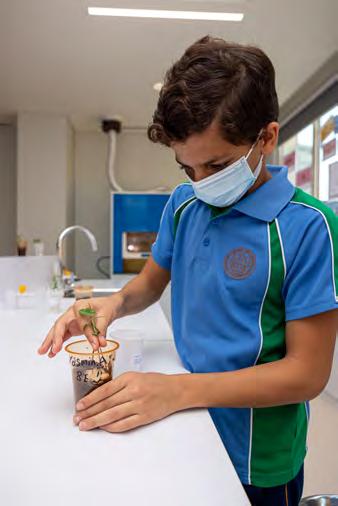

This year has been a year of collaboration with History department working with both the Art and English to further bring History alive. Our annual Remembrance Day culminated not only with our assembly but also an amazing display of the conflict poetry produced in English, sculptures of poppies made in Art, to accompany the wonderful History display.
Our Year 7 curriculum has taken pupils from the Romans through to Medieval Times ending with a new unit on slavery to accompany the reading of ‘Freedom’ in English. Pupils have been challenged to develop their source analysis and essay writing skills. They have made inferences, compared sources, undertaken research, produced fantastic presentations on aspects of Roman Life and given compelling speeches as the 3 main contenders for the thrown in 1066.
In Year 8 pupils continued their historical journey with a study of the Making of the UK and the Industrial Revolution. They have written essays on Henry VIII, explored Elizabeth’s I options for marriage, role played the Trial of Charles 1 and negotiated the perils of child labour: while in Year 9 pupils have researched the horrors of trench warfare, looked at the treatment of conscientious objectors, grappled the collapse of Tsarist Russia and the emergence of the World War Two dictators. They have written newspaper articles, created media posts and contemplated the effects of events.
Our examination classes in Key Stage 4 and 5 have developed their examination technique and knowledge of the course content. Year 10 pupils have grasped Hitler’s rise to power under the democratic Weimar Constitution and seen America turn from ‘the Golden 20’s’ into the depth of depression, while Year 11 followed the course of the Cold War with its growing tensions between the Superpowers. Year 12 extended their knowledge on Germany and explored the implementation and end of apartheid while Year 13 studied the development of the Civil Rights movement through to Obama’s Presidency and the Hot War in Asia. They have had to question, debate, assess and evaluate different interpretations to reach their own conclusions.
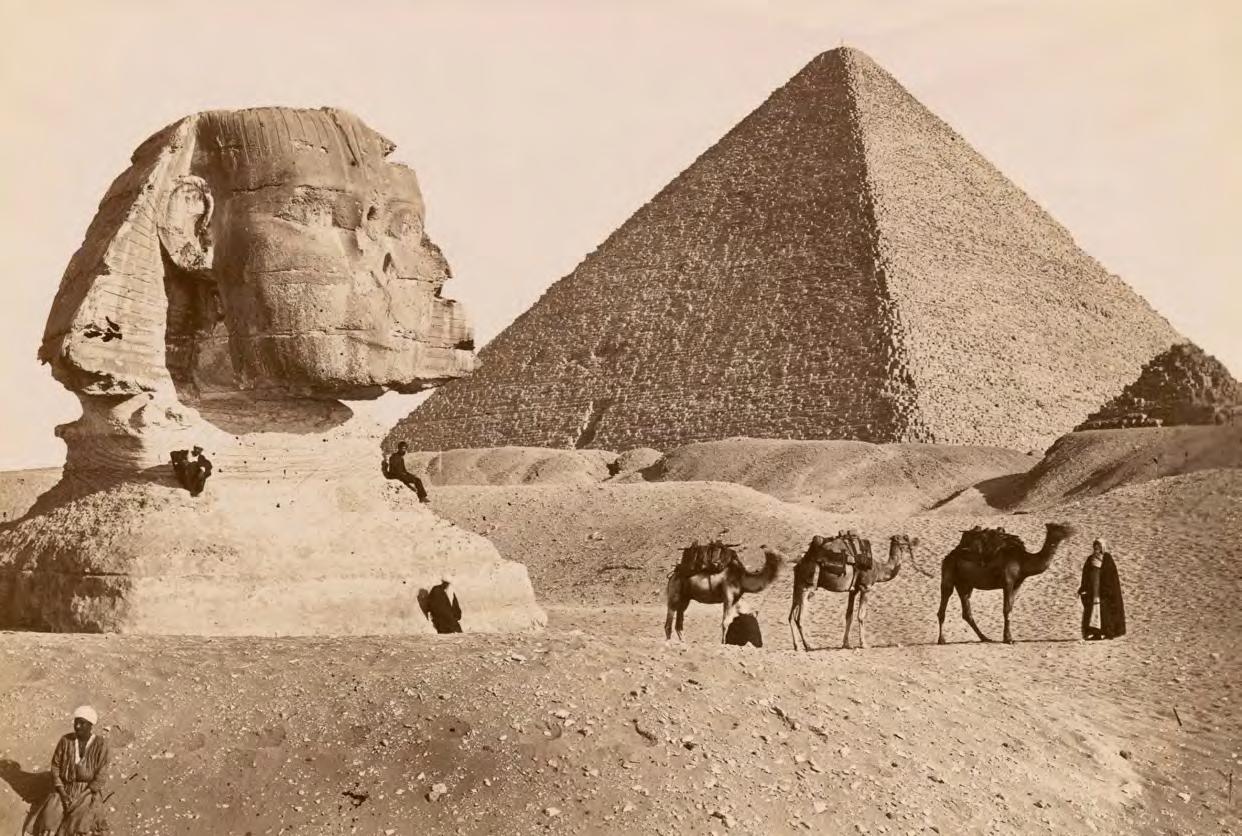

By Syed Ali Shah, Year 7


By Ayza Umar, Year 7
Hello, my name is Harald Hadraada and this is why I should be the king of England. First of all, I’m already the king of Norway, and have a strong army. I have experience in battle and in leading people. I have the support of the Vikings as well, and we used to rule England.
One of the other main contenders for the throne, Harold Godwinson, rebelled against Edward the Confessor with his father. He was not loyal to the king. He doesn’t have any experience being king or leading a strong army.
William of Normandy shouldn’t be king either, he hasn’t ever been a king and isn’t from England. People are saying he threatened Harold Godwinson into supporting him too.
Prince Edgar the ‘Atheling’ is not even a viable option for the role of king. He doesn’t have the support of anyone powerful, doesn’t have a strong army, and isn’t even strong enough to become king without the whole empire falling into chaos. If his father wanted him to become king, he would have said so.
By Jude Barakeh, Year 7
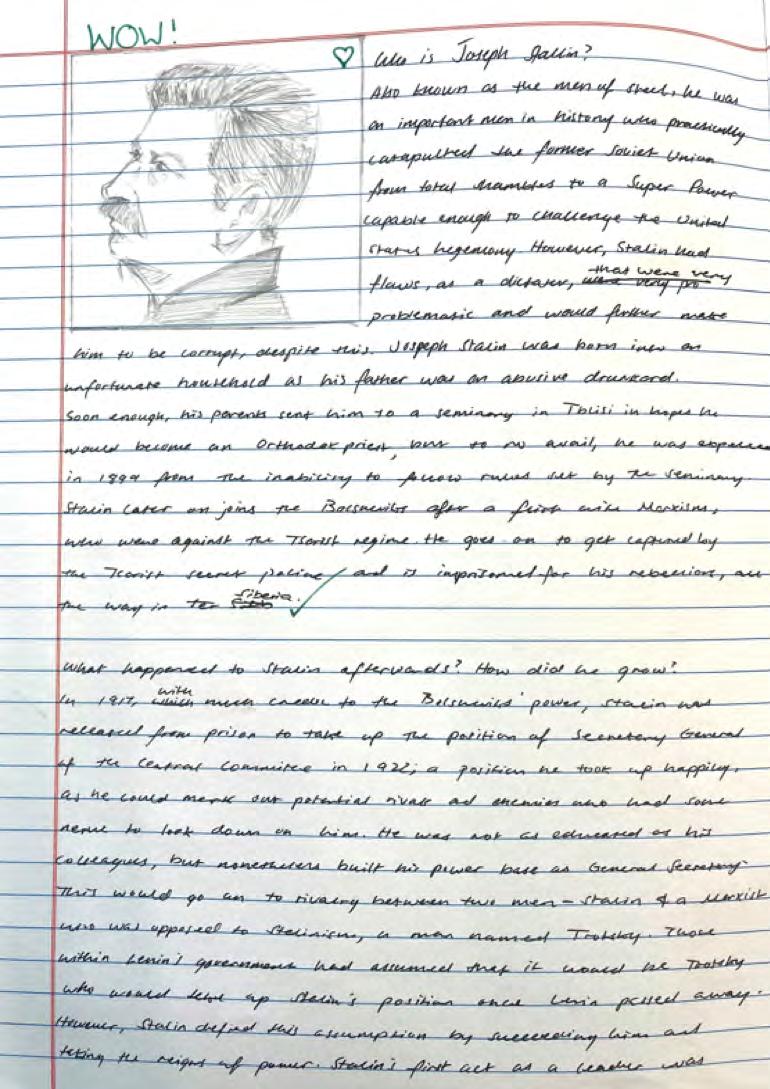
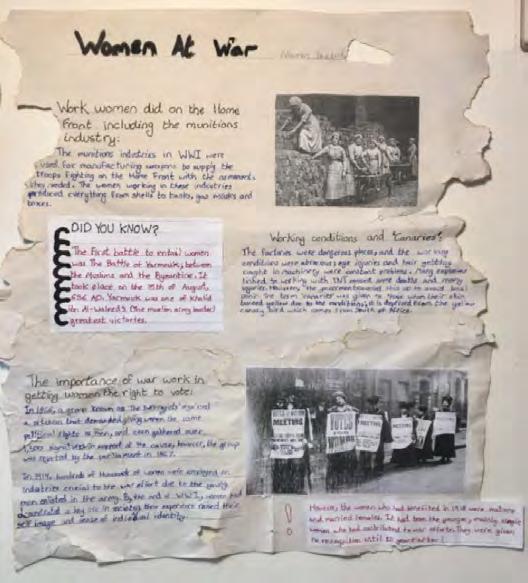
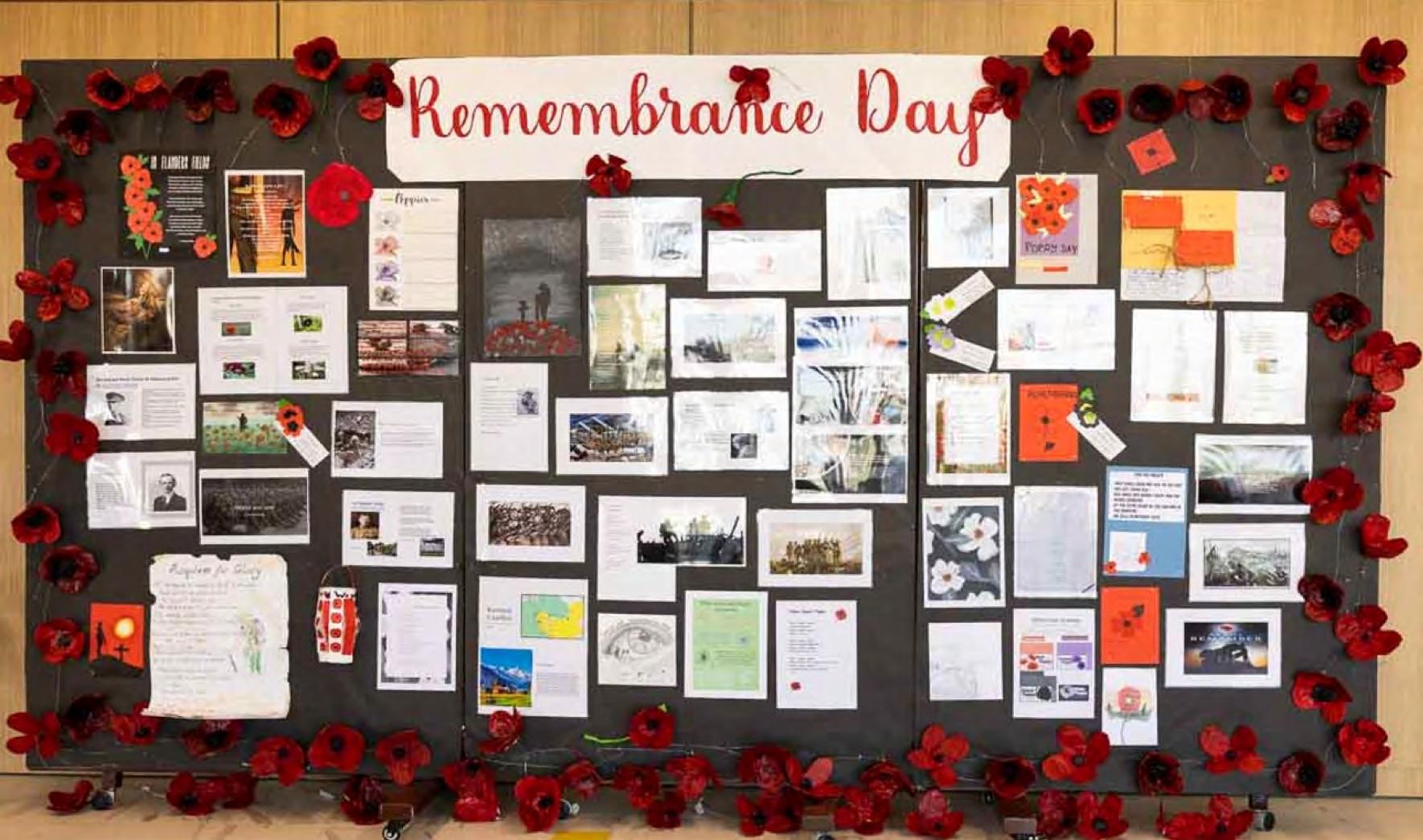

Another exciting year in both UK and US Politics has seen our Sixth Form pupils scouring the news for upto-date case studies to supplement their core notes and enhance their written responses to key political questions ranging from the constitution to electoral systems and the US separation of powers.
AS Politics focus on the UK has led to debates on the merits and issues with different types of democracy, discussions on to what extent the UK has a democratic deficit, evaluating Parliamentary scrutiny of government, analysis of different electoral system and giving comprehensive presentations on the three main UK parties. Pupils have been challenged with writing analytical and evaluative essays, comparing and contrasting different arguments given in sources and through the huge amounts of political terminology that they have has to amass.
Our A Level pupils have had to not only retain and expand the knowledge gained on UK politics, but to also look at political ideologies and US Politics. Having compared aspects of the core ideologies of Conservatism, Liberalism and Socialism, they have delved into Feminism and had to contend with the nature of a federalist system, the complicated system of choosing a presidential candidate and the relationship of Presidency with the legislative and Supreme Court. This led to several intensive debates including a fiercely contested debate on the US and UK constitutions of three rounds each with opening and closing statements. Rounds were scored and points awarded for focus on the question, providing relevant and accurate evidence as well as responding effectively to the opposing side, leading to the UK Team’s victory. This served as a prelude
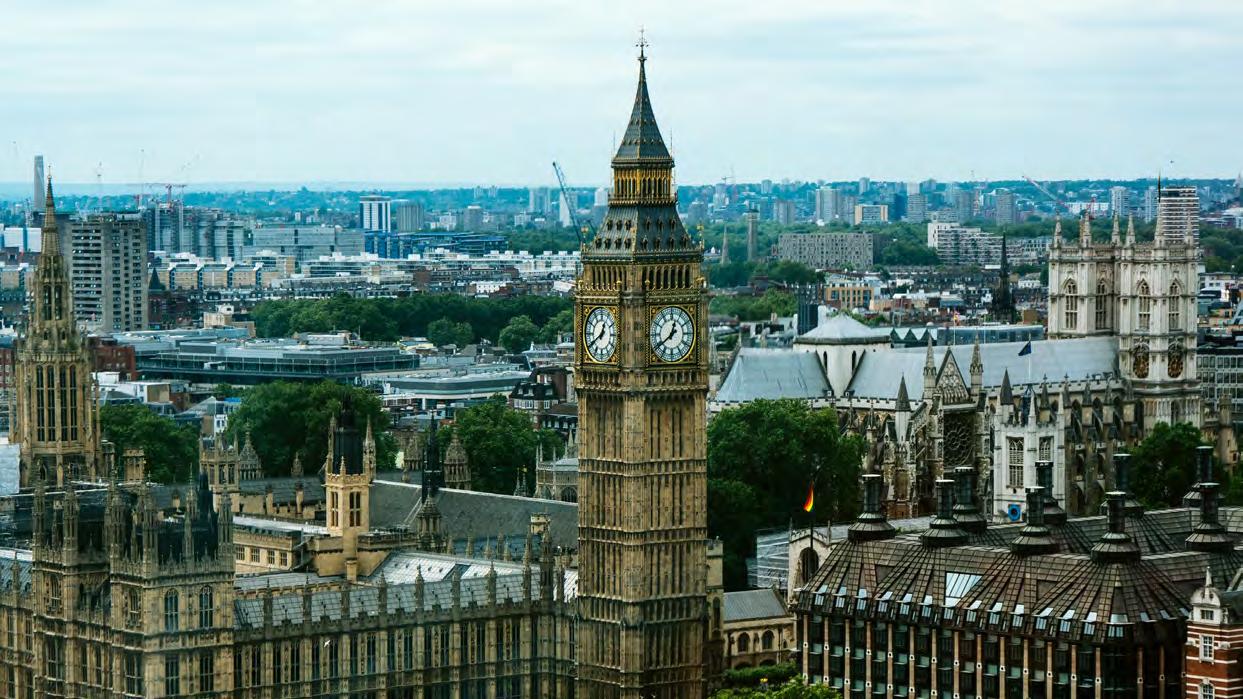
Electric vehicles (EVs) are the future. The challenges that developers face is massive, among some are the extensive research on battery management, customer accepting the new concept and charging infrastructure. Qatar is positioning itself as a leader in EVs in the middle east by rolling out hundreds of electric buses for the World Cup 2022. People usually cover smaller road distances in Doha, thus making it a suitable location to reach a goal of high number of EVs.
The ICT and Computer Science department has benefited a lot by integrating a policy for all pupils to own a laptop and use it in every subject. This has helped pupils to take more responsibilities in being more productive in school and at home with their work. We continued to use OneNote and Teams as tools to teach and learn. Pupils are more reliable with their devices and have built a better routine with their work.
Robotics have restarted at Sherborne Qatar and we purchased new devices such as the Lego Spikes. These are more adaptable to Key Stage 3 (Year 7, 8 and 9) where pupils have worked on different projects involving engineering and coding. The challenges have been more intense and pupils have gained a lot more through varioud competitions.
We had a mini tournament of Sumo-Bots, where pupils from the Technology Club built robots and competed after school. Robots with lethal features of sensors, arms, wheels and destructive designs were fantastic to watch and the excitement brought loads of inspiration for future competitions and aim to work in the robotic industry.
With over 70% of pupils gaining A/A* in Computer Science at A/AS Level, we continue to build a strong rapport of fantastic teaching and learning. We have several pupils who went to study ICT or Computer Science at universities and managed to send two of our best to Carnegie Mellon in Qatar and they are currently thriving. We hope to develop more talented young adults in this most rewarding field.
Mr Ranglall Head of ICT and Computer Science
“...a well-planned and flexible curriculum that is designed to meet the varying needs of the pupils.”
BSO Report 2022, April 2022
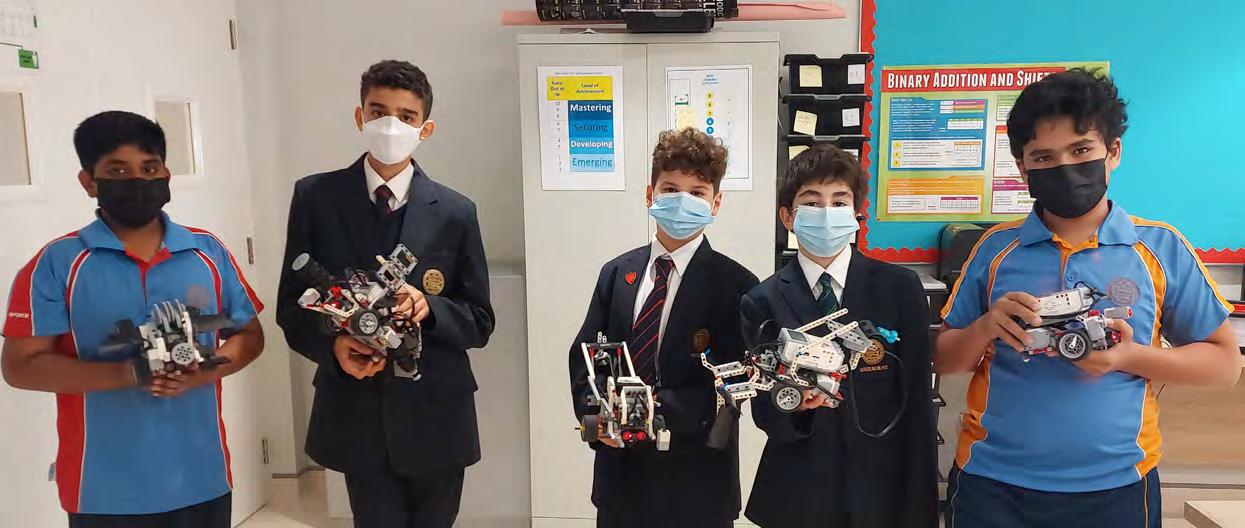




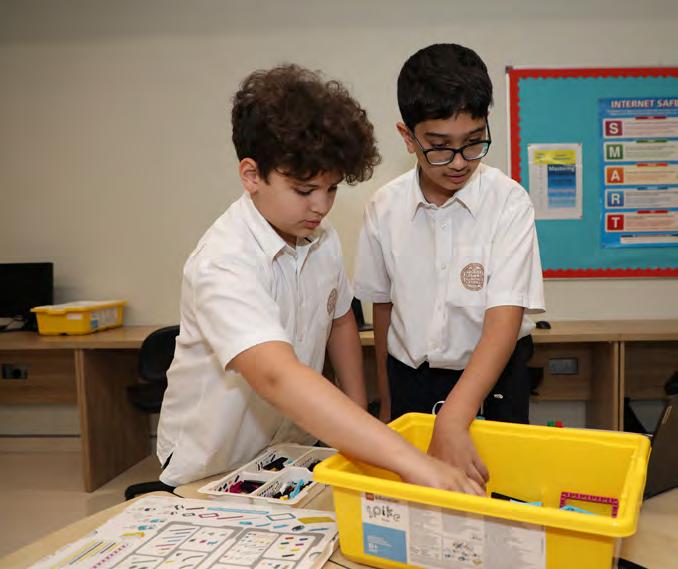
It has been inspiring to move into our new site this year with the whole mathematics department now located on the first floor at the MOQ site. The pupils have enjoyed the department’s state-of-the-art facilities and we are very much looking forward to building upon these in the coming years, with technology being an integral part of education today.
The use of technology has undoubtedly supported the department in delivering classroom and remote learning lessons. It has enabled us to provide an excellent standard of mathematics education to our pupils. The use of OneNote and Teams has supported us greatly in being able to model methods and concepts directly to pupils.
This year pupils in Key Stage 3 and 4 have been developing their understanding of Algebra, Shape and Space, Geometry and Data where they have strongly built upon their prior knowledge. As a department, we try to ensure that our pupils become accomplished mathematicians who can reason mathematically and interpret data across a wide range of topics.
In Key Stage 5 we are also pleased to note that we have seen an uptake in numbers in mathematics and further mathematics at A Level this year. It shows our pupils’ strength in depth and their desire to seek a greater understanding of this subject.
We have offered our Mathematics Challenge clubs during enrichment to our Key Stage 3, 4 and 5 pupils. The clubs allow pupils to undertake tasks that challenge their critical thinking and problem-solving skills. A particular highlight for the younger pupils has been answering the logic problems that generate insightful discussion.
We have had great success in the UKMT mathematics challenges this year. We had pupils undertake the Senior, Intermediate and Junior challenges which allowed them to showcase their mathematical reasoning and precision of thought in solving a wide range of problems. Within the Senior category, Niranjan Muthswamy managed to attain a Gold certificate. An outstanding achievement, especially for a Year 12 pupil. A special mention must go to Mohamed Elsayed, Year 13, who achieved a Silver certificate placing him highest in his year group. Year 9 pupils Eathen Imthias, Faaris Reagu and Youssef Ibrahim all achieved Gold certificates in the Intermediate challenge with Eathen being accredited the highest score in the school. We are waiting to hear the results from the recent Junior challenge as the pupils sat these at the end of April. We will report on these as soon as we are notified.
Looking ahead to next year, we have a new department member joining us who is very excited to teach at the Senior School and is looking forward to meeting all of her pupils. Finally, we would like to take the opportunity to wish all of our pupils in Year 11, 12 and 13 every success in their external examinations and look forward to hearing about their new and exciting ventures in the future.
Mr Robinson Head of Mathematics

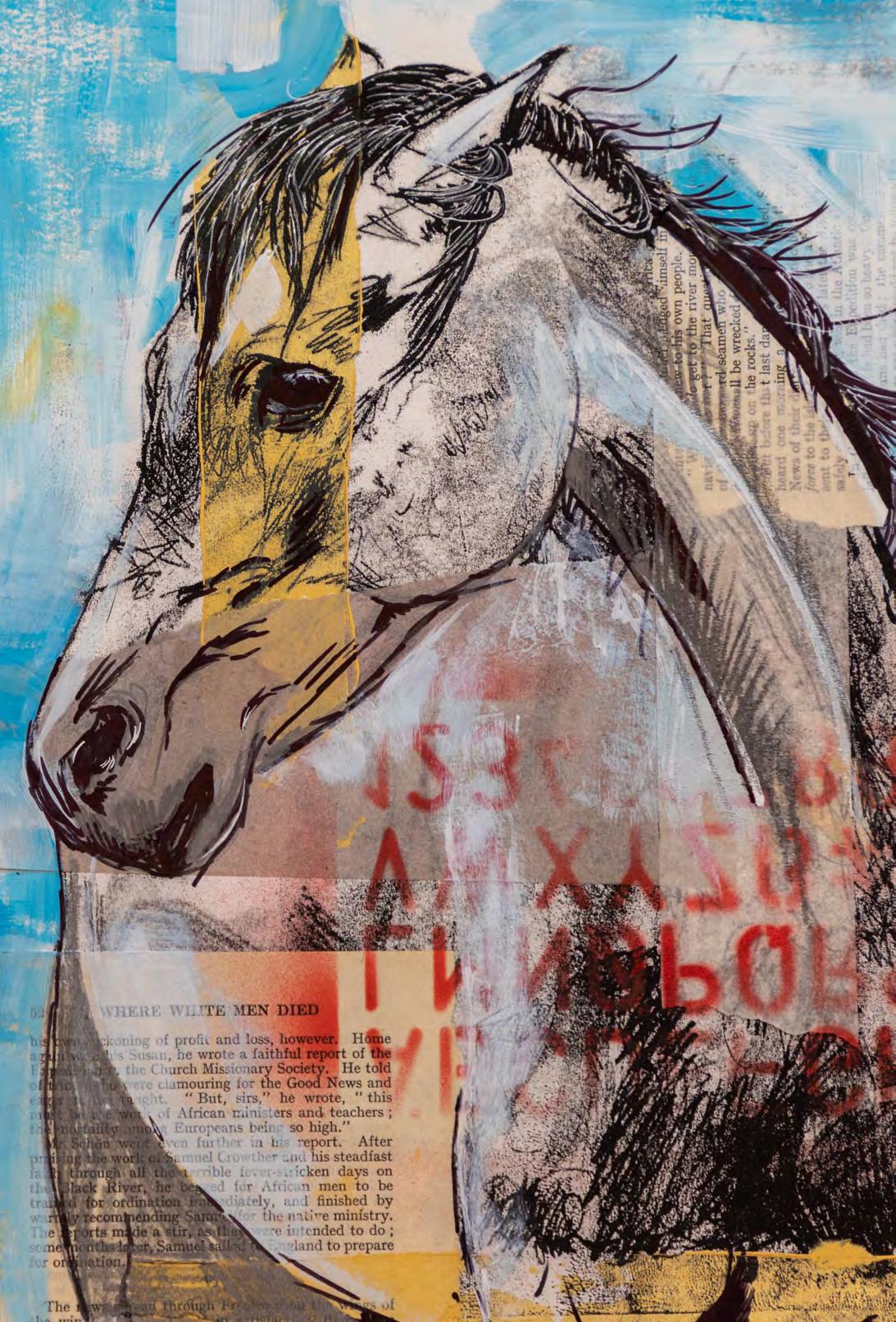
- Jennifer Lim
Media studies is not just about learning new and exciting technical skills, it is also about appreciating the skill and creativity which goes into the production of media texts. Just as analysing the different techniques used in the creation of a poem or novel helps you appreciate the talent of the writer, so does learning about media techniques help you appreciate the skill with words and pictures that the creators of a media text have to possess.
The media studies department has continued to develop since it began three years ago at Sherborne Qatar. With continued achievement in Years 10, 11, 12 and 13, we are successfully running an AS Level and A Level course for Years 12 and 13, and BTEC courses as an option for pupils in Years 10 and 11.
This success of this department is proof of the dedication and commitment of pupils taking media studies. Throughout this difficult period of the pandemic, Sherborne Senior School is incredibly proud of the pupils – especially as they are learning a completely new subject, under very difficult circumstances.
A Level pupils in Year 13 have studied a broad range of media topics and produced a great deal of development work for a music video. The pupils have been introduced to challenging theories such as postmodernism and media regulation; they have developed a wide range of video skills including using green screens and video editing techniques to produces music videos which are to a truly excellent standard.
AS Level pupils in Year 12 have been tested through their production work in learning Photoshop skills and producing their own website. As well as learning communication theories and developing their understanding regarding the production of meaning, pupils have produced publication work to a professional standard and developed a wide range of other skills including photography and digital image manipulation.
BTEC media studies pupils in Years 10 and 11 have also developed cutting edge media skills. Detailing research methods and techniques, developing production ideas and learning production skills for print and advertising have been among some of the areas covered by pupils in these year groups.
In addition, pupils have developed their digital presentation skills through the various software packages available. They have learned how to promote an idea and use technology to make their thoughts and suggestions more persuasive and interesting.
To accomplish so much while readjusting to life back in full time education has been an outstanding feat by all our pupils. Along with the rest of the staff here, I am very impressed with the professionalism and perseverance demonstrated by all our pupils here in our new school
Mr Leeder
Lead Teacher of Media
Studies


‘On
the other side of a storm is the strength that comes from having navigated through it. Raise your sail and begin’
- Gregory S. Williams
… after two years of careful navigation through the COVID storm, we now stand stronger and prouder than before, ready to raise our sail and begin a new teaching era…
The Languages department at Sherborne has always been proud of its interactive and kinesthetic methods of teaching, as social distancing and remote learning unexpectedly continued for a second year, we continued our battle to maintain the fun in MFL.
In the midst of all this, we welcomed a new addition to our department, Ms Martin, who soon became an integral and invaluable part of the team.
We continued with the impossible challenge of modelling good pronunciation or checking pupils elocution, all from behind a mask. We taught without using books or textbooks whilst, of course, maintaining social distancing…
With pupils rooted at their desks, no sharing of resources or group work making kinesthetic activities virtually impossible, the languages department has been, at times, unusually quiet… no running or getting out of chairs, no cuddly toy flying across the classroom, no treasure hunt… but this did not last long… But not ones to be easily deterred, the MFL department once again demonstrate its creativity, finding novel ways to deliver fun lessons and adapting to never ending restrictions. Soon Miss Cobo’s Year 8 class were filming a virtual cooking shows, Ms Arándiga’s pupils were playing the ever so popular ‘chair game’, Ms Martin’s Year 7 were playing ‘touch the colour’, Ms McKend’s Year 8 were taking us on a virtual guided tour of Qatar, and Mrs Khayari’s Year 9 pupils were enhancing their brain power developing their growth mindset! Proving once again that in MFL, where there is a will, there is a way!
But, far from being defeated by a global pandemic, for the second year running, Sherborne’s pupils and teachers rose to the challenges and truly supported each other through it all and learn many invaluable skills, as well as languages along the way, as reflected in these pupils’ quotes:
“This year hasn’t felt like a compromise. I believe that we have taken advantage of every chance we were given to make this year an academic success”
“Through this year, we had to learn to adapt to a completely different style of learning languages. While this included some negatives, we were still able to grow our love for the French language and culture through the teaching techniques of our teacher”
“We have had a fairly different year, from when we could write on the board, play card games, and have other forms of interactive learning. Despite this, I feel that the MFL, and the school as a whole, has adapted to an amazing extent. One thing that I loved particularly about this year is how lessons are still kept interesting and how we have discovered new yet effective methods of learning as a class.”
“Throughout the year, we have done many things in French. When I started Year 10, I thought that I would simply learn more advanced French. As time progressed, we did more than that. My Favorite activity was the project on food, we were simply asked to create a mind map on all the food classes. It was a fun and simple activity and I found it fairly interesting.”
“Despite lockdown, I found the online lesson fun and interactive. Occasionally, we also played Kahoots and other games to revise which was helpful.”
“It has been very difficult adjusting to the new way of learning, but I think we have managed with the new situation well and have learnt countless things from this. for example, all teachers and pupils have learnt a lot about technology which has improved our learning drastically because we can have all our notes organised online.”
Miss Mckend Head of Modern Foreign Languages
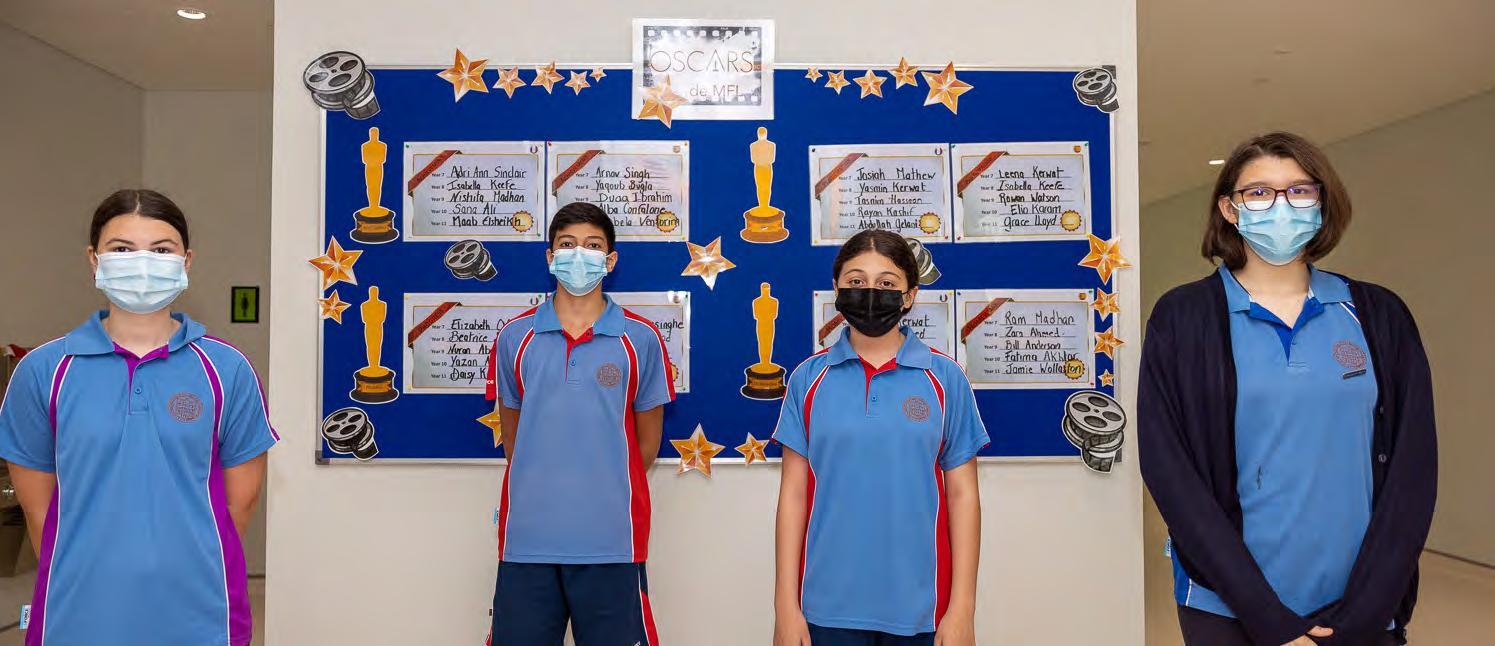

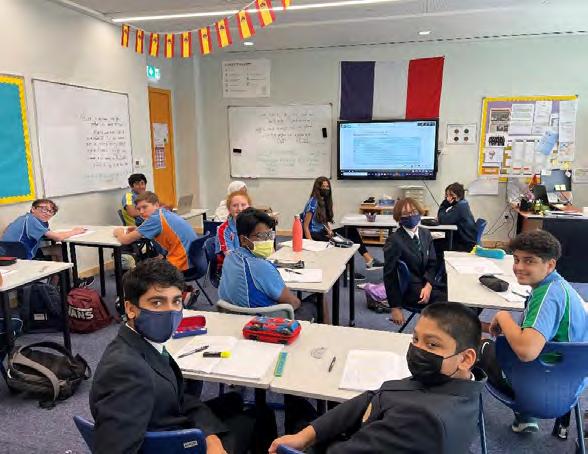
The Performing Arts Department has been delighted to return to some more practical elements of Music and Drama and we have seen a real creative mindset from pupils when approached with challenges and tasks. Pupils have explored the different elements of Performing Arts, effectively using technology to support their learning which has resulted in some excellent pieces of music and theatre.
In Key Stage 3 Drama, pupils have had the opportunity to work collaboratively to develop and perform pieces of theatre. Year 7 developed a number of skills, including vocal techniques and physical movement, and these were demonstrated in the storytelling of ‘Adventure Island’ in which they used soundscapes, physical theatre and dialogue to captivate and engage an audience. Year 8 delighted audiences with their puppetry where we saw some outstanding puppets and puppet theatres which were designed to communicate children’s stories. Year 9 engaged in physical theatre, stage combat and expressionism, learning about different ways to tell the story of Shakespeare’s ‘Macbeth’ on our beautiful new theatre stage.
Our i/GCSE and A Level pupils have devised and performed original pieces alongside extracts of the plays ‘A Streetcar Named Desire’ and i/GCSE scripted ‘The 39 Steps’ There has been some excellent and thoughtprovoking work emerging from the groups as they establish their creative process and unique performance styles.
The enrichment programme has allowed pupils to take part in an online performance of ‘Bad Auditions’ in which pupils from Year 7-13 collaborated to perform a series of terrible auditions from a variety of challenging characters. This was rehearsed and performed over teams and zoom. The characters were great fun to explore, and actors experienced creating their own costumes and settings for their scenes. We ended the year watching a showcase of previous school performances and celebrating the contribution of all pupils who have taken part over the past years.
Sherborne Qatar Radio has gone from strength to strength. Run entirely by pupils, the team have published engaging podcasts which highlight significant events in Qatar and across the world such as the ‘International Women’s Day’, the ‘Ramadan Diaries’ and an interview with renowned musician, Maya Azucena – the team has even been featured in Marhaba magazine! The pupils were delighted to take part in a Q&A session with the lead presenter of Al Jazeera, Kamahl Santamaria, where they were given a fascinating insight into the world of professional broadcasting.
We are excited to see where our pupils’ creative journey takes them next!


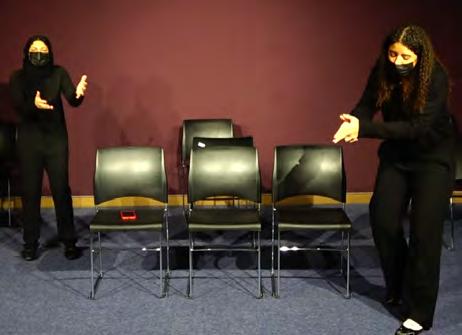
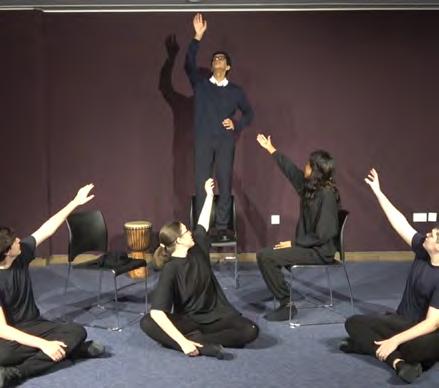
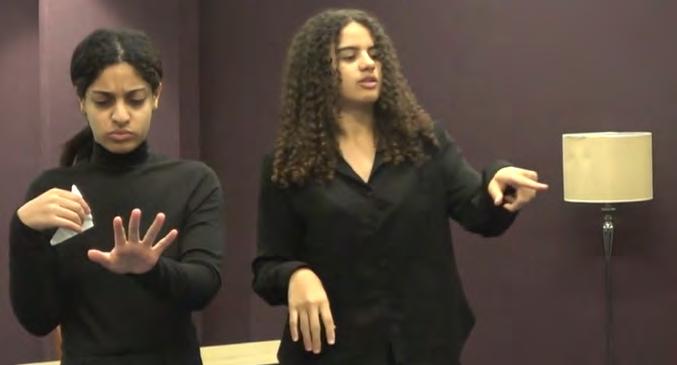

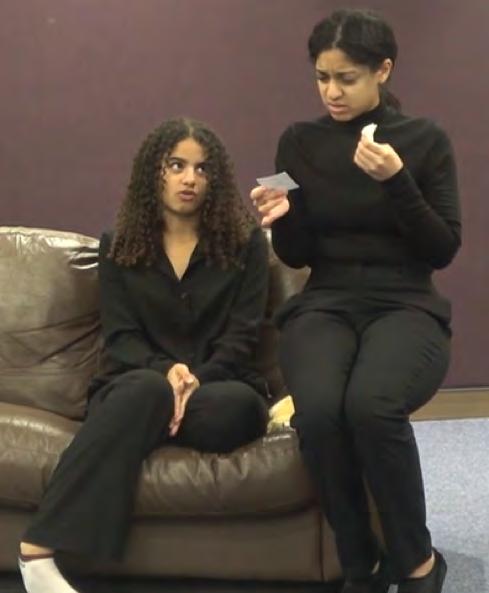

In Key Stage 3, pupils have explored a variety of topics, developing their understanding and skills in active listening, composing and performing. Year 7 learnt about ‘alternative instruments’ in the topic ‘Stomp!’ and shared original percussive performance pieces of their own, using household objects. Year 8 showed how they could take an existing piece of music and turn it into something new in their ‘Theme and Variation’ topic and Year 9 used online composition platforms to create an original film score, demonstrating their understanding of how music is used in movies to create a particular effect or mood.
Our i/GCSE and A Level pupils have worked really hard to develop excellent compositions and performances, worthy of a wider audience and we are looking forward to sharing their work with the community over the coming year.
This year, pupils had the privilege of performing on the main stage at the inaugural D’Reesha Festival in Education City. D’Reesha is the first of performing arts festival of its kind in Qatar, bringing together unique performances, from theatre, to music, poetry and storytelling.
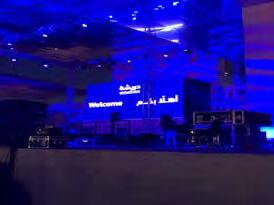
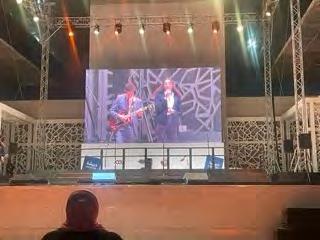


This high-profile event saw Sherborne Senior pupils perform alongside many notable artists and musicians, including the Qatar Philharmonic Orchestra. They shared and excellent selection of material including a choir performance of ‘This is Me’ from The Greatest Showman, ‘See You Again’ and the popular Arabic song ‘Fairuz’. We heard a fabulous Arabic poem from a Year 11 pupil and group of Year 8 pupils performed an original piece of poetry based around the Sherborne values. This was in addition to piano, guitar and vocal performances, and rounded off by a showstopping performance of ‘Don’t Stop Me Now’ from the Senior Band.
It has been such a long time since the pupils were last on stage and they conducted themselves with the upmost professionalism, enthusiasm and excitement. One of the organisers commented on their exemplary behavior - she was amazed with how respectful and polite they all were (although it was no surprise to us!) and even invited them back to represent the school at the closing ceremony. We are looking forward to being part of the event in the future as it grows.
Mrs Wolfe
Head of Performing Arts
Mr Arts
Head of Music
Mr Hake
Head of Drama
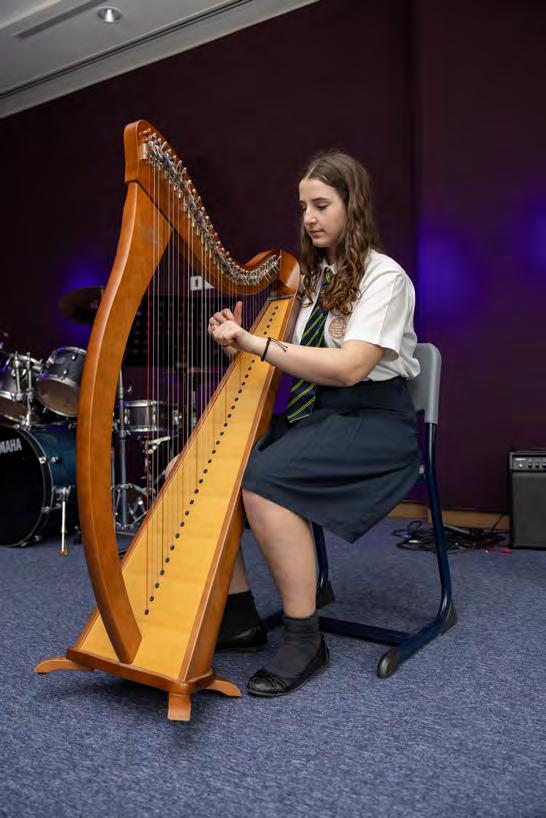
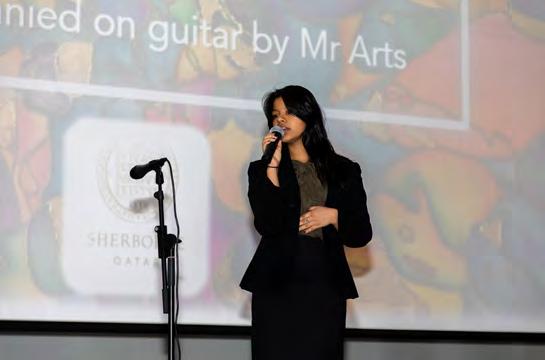

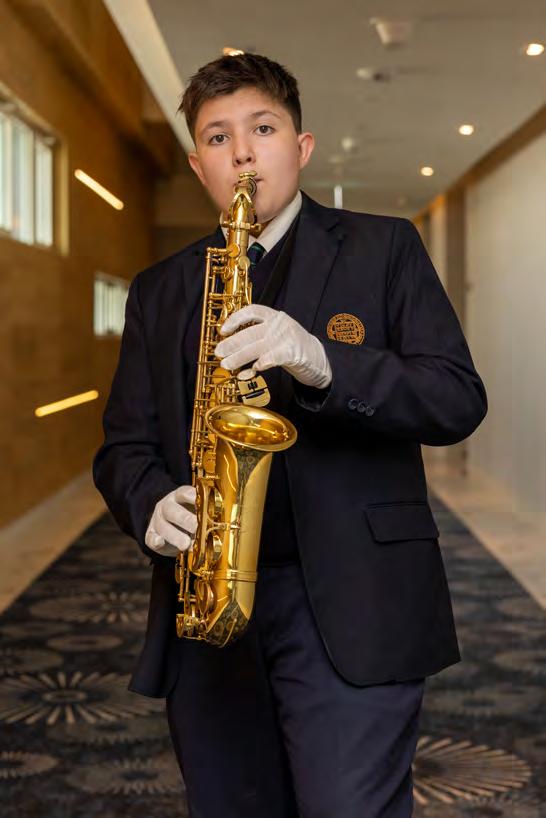
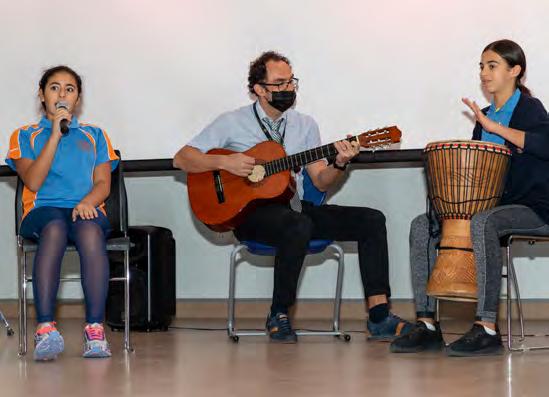
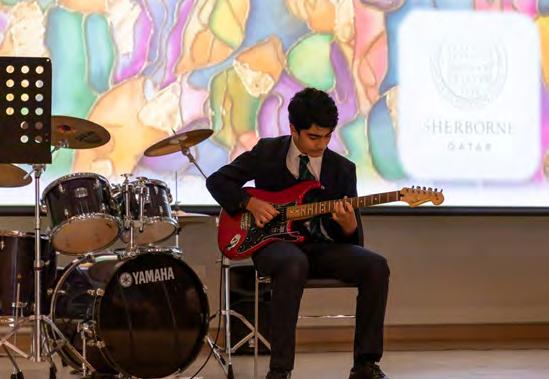
As one of the subjects most severely hit by the pandemic, PE staff and pupils have welcomed the green shoots of revival since the turn of the calendar year. PE lessons have taken various forms since August in response to COVID guidelines, meaning pupils and teachers have had to frequently adapt to new methods of delivery. Online PE lessons, blended PE lessons and practical lessons which comply with social distancing have all featured. Thankfully, we are now beginning to see something like normality, as the range of activities on offer has gradually increased, and we look to the future with positivity and the hope that we can start to use our new facilities to the maximum, and that inter-school fixtures and training sessions will be a huge part of school life once again.
Sherborne has been at the forefront of any developments that have happened in Qatar school sport this year. The U19 boys’ football team marked the 2-year anniversary of the first lockdown with our first fixture since that day, travelling to ACS and drawing an exciting game 4-4. For many of the boys involved it will be their first and last chance to represent the school as Sixth Form pupils, a particularly sad thought but we are also pleased that they had the opportunity to do so, even if just once.
Moving to the MOQ campus has certainly had its perks; one being access to our own swimming pool. As part of the AS Physical Education course content, pupils have been making use of the facilities whilst being assessed and filmed performing their Personal Survival skills. This has involved a 100m timed swim wearing two layers of clothing, holding a 6-minute huddle position and also using a straddle entry into the water. We look forward to next academic year when we can hopefully get more of our academic PE classes assessed in the pool for both GCSE, AS and A Level courses.

Sherborne Senior School participated in an athletics relay event in May 2022 at the warm-up track at Khalifia Stadium, which hosted the best athletes on the planet for the 2019 World Championships Athletics. The top 8 schools in both the girls and boys races had the chance to qualify for ‘curtain raiser’ at the Diamond League on the following Friday evening.
With little time to prepare and practice our pupils did a fantastic job in coming together as a team, conducting themselves superbly with their positive attitude and commitment.
The girls squad was made up of Sana Ali, Ana Ventorim, Hana Elahi, Jumainah Haq and Hadeel Albagha. Competing in Heat 4, the girls came 15th out of 20 teams overall, missing out on 8th place by only 4 seconds … that’s just 1 second each they that they need to find for next year.
The boys’ squad was made up of Jibran Ahmed, Ali Al Fayyadh, Max Saunders, Max Eite and Daniel Saldanha. The boys also came 15th but out of 22 teams, with only 3 seconds between them and qualifying in 8th place.
It was brilliant to see so many schools involved in an athletics event after 2 years of the event being cancelled for juniors due to COVID-19.
We look forward to getting more pupils out on our training track in school over the next 12 months and returning to participate again next year. Well done all those involved, and special thanks to parents for getting their child to and from the event.
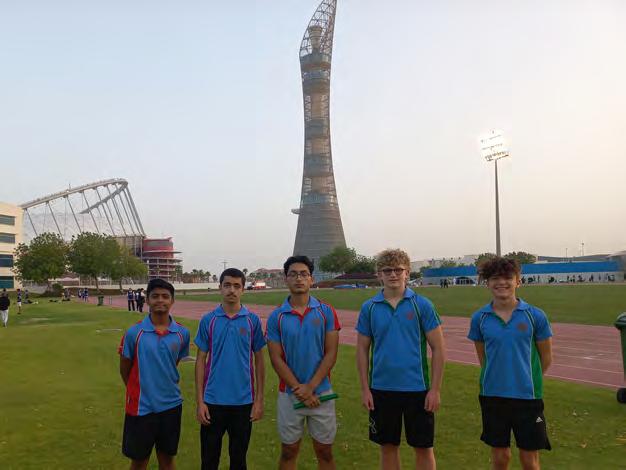


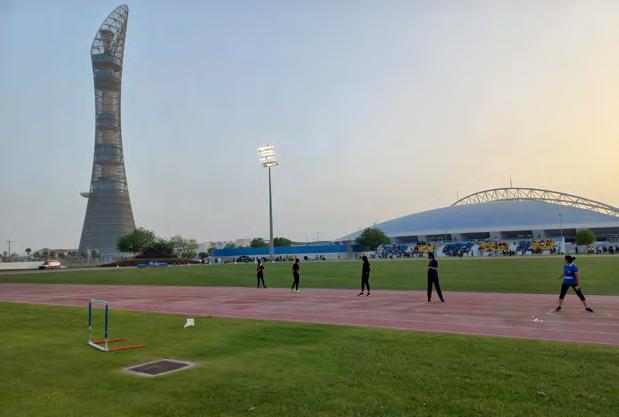
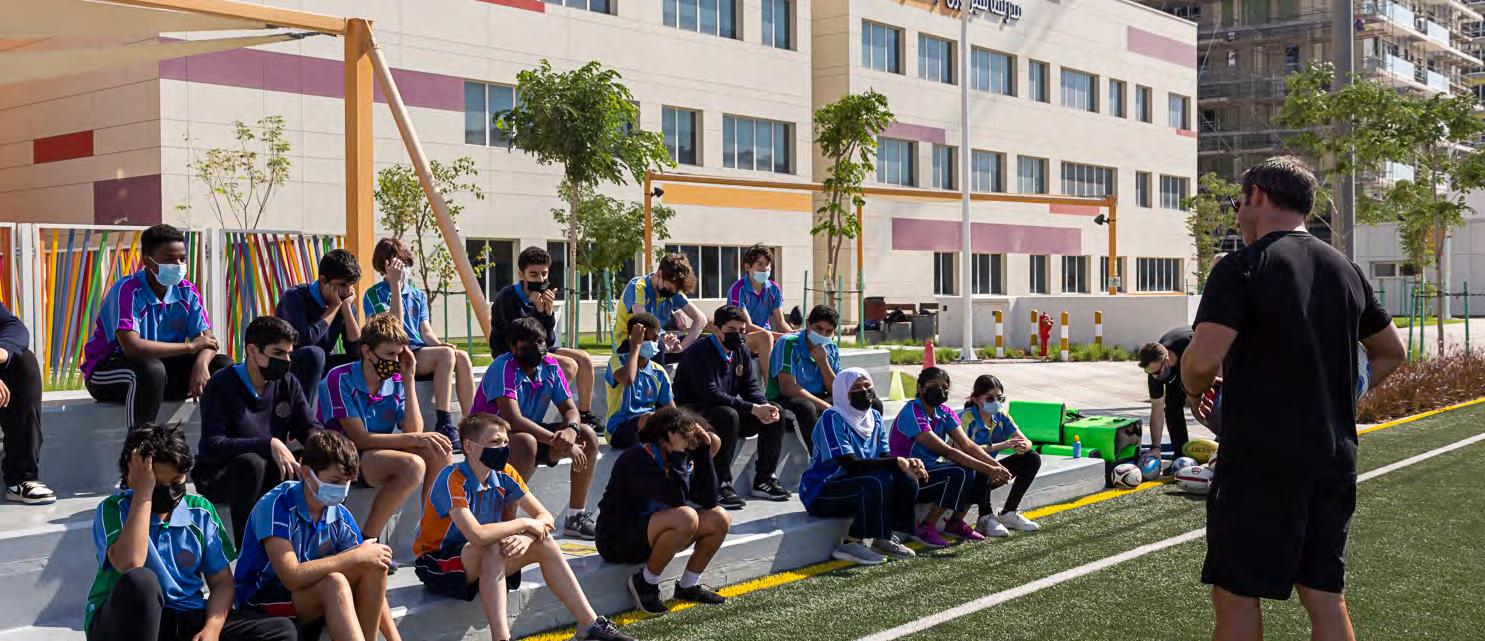
Sherborne Senior School was hugely thankful to Doha RFC for arranging for England Rugby 7s Legend Ben Gollings to visit school in November 2021. Ben is the career leader in points scored on the World Rugby Sevens Series with 2,652 points.
Ben focused his practical sessions on handling, decision making and game-based play. He worked with Year 9 in their PE lesson, before running a session for interested lower school, and then upper school, pupils afterschool. The coaching sessions involved over 50 pupils in total, helping prepare of our pupils for competitive fixtures (see below) and InterHouse.
Ben also delivered a Question-and-Answer session in the auditorium during his visit that was attended by pupils from different Houses. Pupils from our Sherborne Radio station took a lead on asking questions covering such themes as resilience, injury, obstacles and proudest moment.
Since his visit to Sherborne, Ben has become the coach of Fiji sevens team, the two-time Olympic Champions winning gold in both Brazil in 2016 and Japan in 2020.

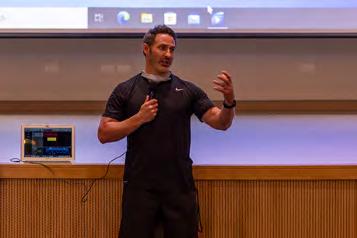
The PE Department has continued to encourage pupils to access competitive sporting opportunities in the wider community. A couple of examples of pupil successes this year are written about below.
Following successful trials in the Sixth Form on the Level 2 course, this year marked the first time we delivered the Level 1 course for pupils in Years 10 & 11. The course itself is a mixture of theory and practical work based around developing a young person’s life skills through leadership. These comprise of communication, self- belief, teamwork, self-management and problem solving. Pupils are taught how to identify these key skills in themselves and others and through a carefully constructed series of tasks and activities, they have the opportunity to develop and enhance their existing skills as well as developing new ones along the way. We had 26 Year 11 pupils and 13 from Year 10 embark on this journey with us and what fabulous groups they were. It was an absolute pleasure watching their confidence grow as they tried their hand at planning and delivering small activities to their peers; they listened patiently and intently to feedback and then refined their work to make it even better. They were then able to put all they had learned into practise, culminating in a whole school sports day, leading our younger Shirburnians through a series of Interhouse events at the end of their course.
Congratulations to all of those who took part. Their enthusiasm and willingness to try new things was wonderful to see and they undoubtedly ended the course knowing that the skills they continued to develop throughout will stand them in very good stead in the years to come.
“Sports leaders allowed me to develop a deeper understanding of the range of abilities and perspectives that people experience. I’ve come out of it with more empathy and innovative skills than I’d started with, as well as increased awareness of the inclusivity of every day tasks and activities”
By Haneen
“I am able to lead, adapt and develop a wider perspective of every person’s uniqueness”
By Abdelrahman
“I am now able to instruct others and lead my own activities. I have enjoyed working with other people”
By Aleena
“Becoming a sports leader has helped me with my confidence, especially speaking in front of a group. It has been a great experience”.
By Safeia, Year


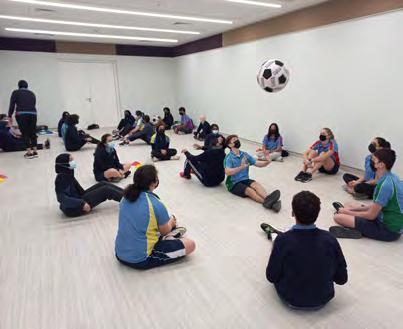


World Cup excitement is building!
The 2021 edition of the Arab Cup was held in Qatar between November and December. 16 teams played games across 6 stadiums in the biggest trial event before Qatar 2022. As part of our commitment to leadership and volunteering at major sporting events, we congratulate the following pupils who acted as flagbearers at Ahmad Bin Ali (Al Rayyan) Stadium for the game between Jordan and Morocco.
William Selwood
Maab Elsheikh
Nur Safeia Sharizal
Sophia Hixson
Syed Hasan Ali
Daisy Kinnaird-Barr
Shaheer Suleman
Syed Abdullah Gelani
Isabela Ventorim
Omotoyosi Zainab Olagunju
Amira Al Said
Beatrice Selwood
Isabella Keefe
Other pupils in school performed similar roles throughout the tournament, as well as acting as ball boys / girls, organised through their local sports clubs.
We hope that many more of our pupils will be able to access similar roles when the World Cup starts in November 2022.
Mr Keefe
Deputy Head (Pastoral)
Miss Price
Head of Academic PE
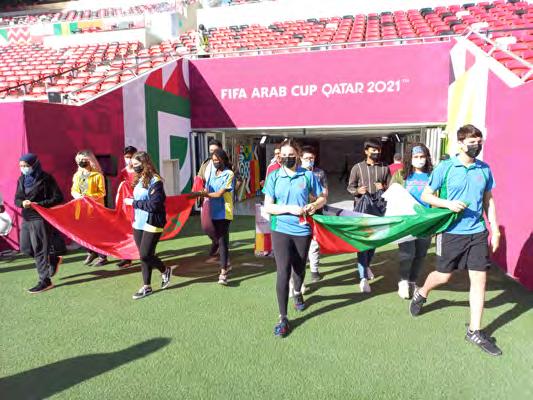


Sports Leaders Awards are only the start of the leadership and volunteering journey for many of our pupils. Maryam and Khadija Ghaly are just two examples of this. Whilst achieving their Level 1 Sports Leaders Award, they are also amazing role models inside and outside school. As well as being academically strong, they are prominent leaders in Cook House. They are always at the front of the queue to volunteer to help, especially for anything that is sports-related, including being officials at sports day and leading football sessions for pupils in Year 6 on Transition Day.
This academic year, both Maryam and Khadija became Youth Advocates as part of the Generation Amazing programme. Generation Amazing is Qatar’s flagship legacy programme based on “the power and appeal of football to inspire positive social change in Qatar and globally”. They participated in a 3-day festival at Education City in December, which included a talk on Women in Sport from Ibtihaj Muhammad, best known for being the first Muslim American woman to wear a headscarf while competing for the United States in the Olympics, as well as for winning an Olympic medal (bronze) wearing it. Maryam and Khadija made such an impression with their passion and enthusiasm that they were invited to be involved in a talk of gender equality in sport, and to be part of a documentary on the same topic. They are inspirational characters, attending the Ramadan Girls Festival in April to help coach our two teams, and also the InterHouse Boys World Cup Festival in Lusail in May to referee the games.
Maryam and Khadija explain more below about what it means to be Youth Advocates for Generation Amazing. They are both certainly “amazing” and worthy recipients of the Principal’s Award.
Honestly, becoming a member of the 2022 Generation Amazing Youth Advocates has been nothing short of life changing. It truly provided us, Khadija and I, with the platform we longed for for so long. We always truly wanted to change the way female participation in any aspect of life is perceived, whether it be in sports or education or any other field, especially when it comes to Muslim women. We passionately want to show that, no matter the gender or ethnicity, anything can be done. This, we want to show metaphorically through football, as for us it is a stress-relieving mechanism, that not only provides you with a healthy outlet, but teaches you vital life lessons, like consistency, how to be tactical, how to be relentless, how to communicate... the list is endless. So why shouldn’t everyone be allowed to experience this? That is the message we want to spread, and so we are extremely thankful for Generation Amazing and the opportunities they are providing for us to achieve this. The absolute highlight so far has been the International Women’s Day talk we held at Oxygen Park, where we discussed Islamic feminism and how it relates to sport, and many other topics related to female participation and empowerment. In the future, we hope to widely spread the message through GA that change should be brought about, regarding adversity in all aspects of life, and that it should end immediately. Because, identity is what creates diversity, and so what is sport without the beauty of diversity? We want to encourage all people, especially Muslim women, to play and learn and SIUUUU their way through life because what is football if it is denied to someone simply because of their identity?
By Maryam Ghaly, Year 11


Being selected for the GA Youth Advocates has been an amazing experience so far. Through the countless events and opportunities provided to us, we have been able to vocalise the changes we believe the world needs in order for it to become a better place, like Maryam and I’s talk on Islamic Feminism on International Women’s Day at Oxygen Park. GA gives you a space to discuss changes you believe can improve the community we live in and take action to bring about those changes mainly through the use football. As Youth Advocates, our main goal is to influence the younger generations to always look to achieve their goals no matter how difficult they may seem or what background you come from.
By Khadija Ghaly, Year 11
Mr Keefe was also asked to run a workshop for Generation Amazing at the festival focusing on making football inclusive to all regardless of ability, using the S.T.E.P. principle (Space, Task, Equipment, People), which forms the basis of our sports leaders awards. This meant that Sherborne was the only school in Qatar invited to present at the festival.

Sherborne Qatar is proud to be part of the Generation Amazing schools delivery and legacy programme. As part of our ongoing build-up to the Qatar 2022 World Cup Sherborne Senior School was delighted to welcome World Cup Generation Amazing Ambassadors Wael Gomaa and Ali Al Habsi to school. Wael played 114 times for Egypt and won the African Nations Cup 3 times played at centre-back. Ali is an Omani International who played in goal in the Premiership for Bolton, West Brom and Brighton. He was the first Arab footballer to win the FA Cup. The Ambassadors did a Q&A with pupils from our Generation Amazing football and multi-sport enrichment programmes about their careers and then did a range of football skills challenges with them.

With over 40 pupils attending weekly enrichment sessions at Senior School, complimented by additional sessions from Saner Hasan and BE Rugby, it was important that Sherborne Senior School ended our season with some fixtures against other sides.
The Qatar Rugby Federation organised a school “return to rugby” tag rugby festival at Onaiza World Cup training pitches in March 2022. Sadly, a few schools dropped out at short notice leaving Sherborne U12 and U15 mixed rugby squads to play two games each against Doha College.
In a series of really energetic and exciting games, our U15s drew their first game with Doha College before closely losing the second, after a good comeback in the second half. Our U12s side, however, won both their games against Doha College to become the QRF Tag Champions 2021/22, maintaining Mr White’s record in Doha of winning a trophy in every competition when he has coached a team.
Ali Al Sayegh
Maryam Al Kaabi
Gabriella Franklin
Jacob Baqla
Corey Carberry
Lucia Hanna
Beatrice Selwood
Lina Sellami
Ivy Tavola
Alex Jenkins
Zeena El Gebely
Torin Stephen Muhammed Shahim
Patrick Baron
Brody Stephen
Harry O Donnell
Max Eite
Sami Eltom
Timo Horn
Rory Van Eck
Max Saunders
Noor Ibrahim
Max Saunders
Jana Kamel
Muhammed Chaudry
Rowan Watson
Noah Hanna

Rugby in school is just the beginning. It is remarkable to think that Norain El Gebely in Year 12 only started playing rugby 2 years ago having represented the school in a touch rugby tournament at Doha Sports Park. Recognising her talents, and huge potential, she was soon added to the Qatari national team training squad and now trains up to 4 times a week with them.
Norain was selected to play for Qatar Women’s Rugby team this year. In the West Asia 7s tournament at Aspire, Qatar Women won all three of their games on the first day. They went on to beat Syria Women 17-20 in the semi-final, before meeting a very organised UAE Women in the final to claim second place. Norain showed some lovely passing skills throughout.
In the men’s competition our Head Boy from last year, Oliver Kinnaird-Barr, won his first cap for Qatar, demonstrating some nice skills as the men secured third place beating Lebanon 10-36 in the 3rd Place Final. Congratulations also to Sam Kinnaird-Barr, our current Head Boy, and Jana Kamel in Year 9 who are both involved with the National Squads and inline to be capped in future.
In December, Sherborne Qatar participated in the HSBC Commercial Bank Qatar Junior School Golf Championship at Education City Golf course. Competing against teams from ASD, DBS, Compass, DESS, DC and Kings College, Sherborne played superbly and managed to come away as team winners.
The team consisted of: Jack Tobin Year 12, Harry O Donnell Year 9, Elizabeth O Donnell Year 7 and Amelia O Donnell Year 4.

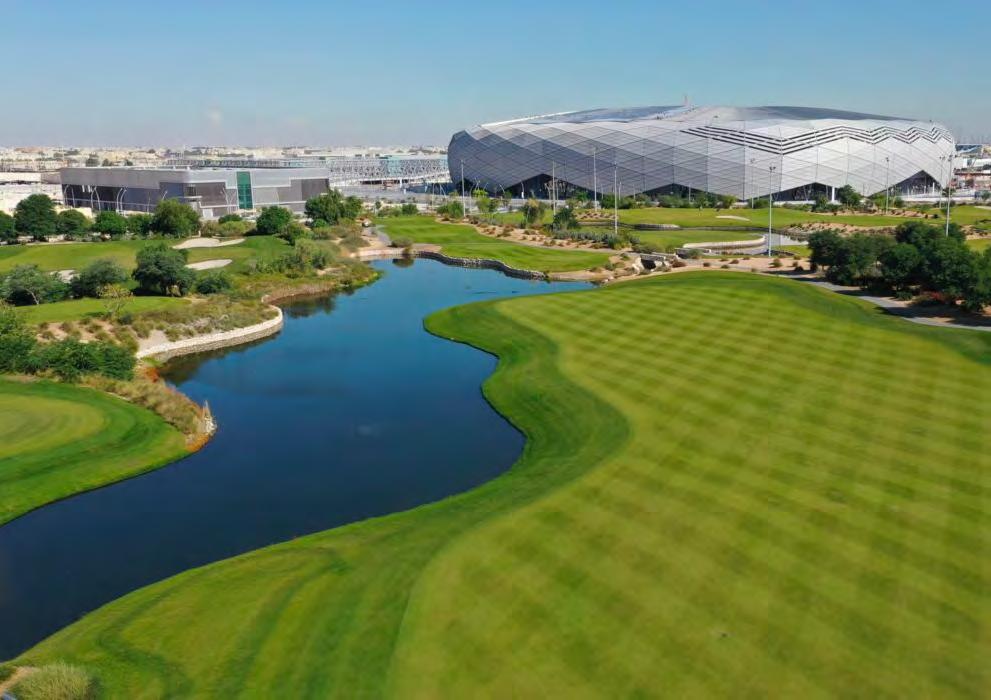
On Friday 13th May 2022, Qatar welcomed some of the best athletes in the world to compete at Qatar Sports Club in the first Diamond League meeting of the season. As a ‘curtain raiser’, two of our pupils, competing for Doha Athletics Club, participated in junior races in front of thousands of eager fans inside what was a rather windy stadium. Despite the conditions, Gabriella Franklin won the 800m girls race leading from the front for most of the race, whilst Emily Spicer Gregory recorded a new PB coming second in the 100m girls race in 12.88 seconds. Emily also ran the anchor leg in the 4 x 100 relay crossing the line in first place in a dominant performance. We look forward to watching their athletics journey over the next few years.

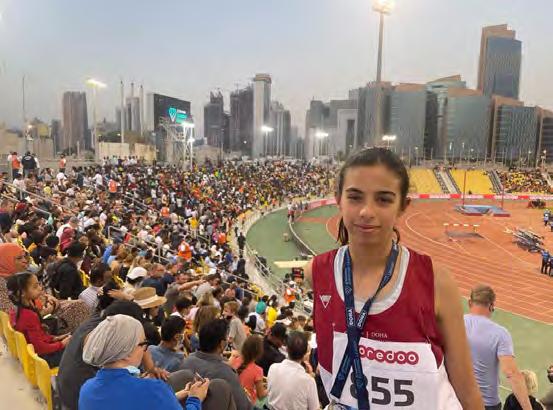

At our first year in the new site, both courses remain as popular and spirited as ever. Mr Reynolds and Mr Pallett have enjoyed so many moments with their classes as new staff, and they are eagerly awaiting fresh opportunities for each class with their new units and topics next year. This year has seen the introduction of AS Level Sociology at Sherborne Senior School, and there is much anticipation of taking our first AS cohort into A Level for the first time in 2023.
Pupils entering GCSE psychology for the first time saw them being introduced to a range of foundation topics, ranging from memory to criminal psychology. This allowed them to gain an understanding of what type of areas psychologists are interested in and to give them a glimpse of what paths lie ahead should they continue in the subject. This was developed for the Year 11 pupils, where they finished the year looking at psychological problems and theories around perception, giving them insight into individual experiences of shared reality and helping them to understand others, which serves them well in the diverse community we live in.
At AS Level psychology, pupils covered three core studies from each of the four approaches within the discipline: biological, cognitive, learning, and social. Within the biological approach, we investigated the relationship between the amygdala and emotional memory, the correlation between REM and dreams, and finally the two-factor theory of emotion. Cognitive psychology saw us move to the mind where we looked at the workings of different memory models and the affect that doodling has on attention. The learning and social approaches allowed pupils to study seminal experiments on aggression, obedience, and bystander behaviour. Pupils also had the opportunity to design and present their own research studies on a range of topics such as phobias, animal ethics and altruistic behaviour.
A-level psychology saw pupils look at two optional units: abnormal psychology and health psychology. Within the abnormality unit, pupils looked at the background and methods of defining abnormality and the difficulties that come with that, before tackling aetiologies and treatments of various disorders such as depression, schizophrenia, and obsessive-compulsive disorder. Within the health unit, pupils studied the extent of stress and pain, as well as common treatments for these phenomena. In addition, students further perfected their critical thinking skills by analysing the strengths and weaknesses, as well as the societal impacts of key case studies and their conclusions.
Pupils in Year 10 studied topics with the culture and inequality units, such as subcultures, poverty, and globalisation. We had many heated debates on gender and social class differences, where many students took the lead in arguing their points of view strongly back up by newly gained knowledge from sociological theories. Some of the best pieces of work from the class were provided when they were asked to write a letter to UK Prime Minister Boris Johnson about their concerns with Islamophobia and multiculturalism. Pupils in Year 11 conversely studied the family unit, and presented research projects on topics such as the explanation for anti-social behaviour in lower class families and whether feminist theories are still applicable in understanding the increased independence of women in society.
At AS Level, pupils began by discussing the main principles of sociology and analysing the different theories of how society functions. Pupils came to grips with structuralist and interactionalist theories to gain a better understanding of how society functions and how members of societies act. They were quick to start making connections between the material that was covered and their everyday experiences, as well as seeing the impact of socialisation, both immediately and as individuals develop. We also studied many contemporary issues within the family, such as domestic violence and the ills of modern childhood. We ended the year with research methods and learning how sociologists go about studying society and which practical, ethical, and theoretical issues attribute to how they are conducted.

This year has had its challenges, but the science department has been pleased to see pupils returning to regular lessons and carrying out our science practicals. As with the last academic year, we have seen a continued increase in our uptake in A Levels for the three sciences during this academic year, making us one of the most popular subjects in the school, which shows that pupils at Sherborne are passionate about the sciences, which is music to my ears. The science team has worked hard to ensure that pupils enjoy the subject, and we hope our upward trajectory continues.
Over the academic year, we have continued to develop the medical club. We have been delighted by our presentations from pupils and our external speakers, who have inspired our pupils to pursue different areas of medicine and dentistry. Under the guidance of our dedicated science teachers, we have successfully launched the Crest Awards, a scheme that inspires young people to think and behave like scientists. Our Nine pupils who have completed their bronze award have worked exceptionally well and will lay down the foundations for more pupils to be allowed to gain a Crest Award as we expand our provisions in the next academic year. This year we also established relations with Qatar Universities Young Scientist Centre, whose aim is to develop STEM within schools in Qatar; we were treated with a two-part workshop called ‘I am Discovering Materials’, which allowed pupils from Year 7 to work in teams, test a hypothesis and developed their problem-solving skills.
On behalf of the science department, I wish all our excellent pupils further success as they navigate their journey through the world of science at Sherborne Senior School.
Mr Malik Head of Science


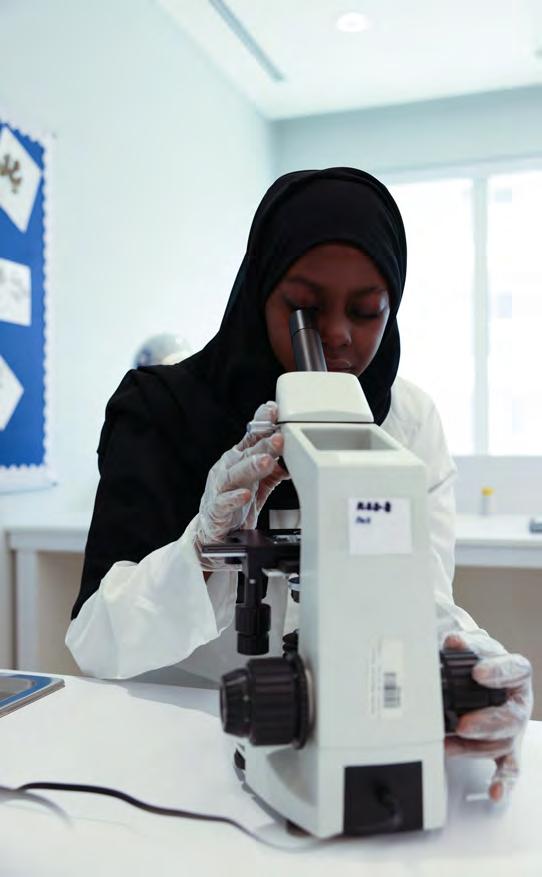


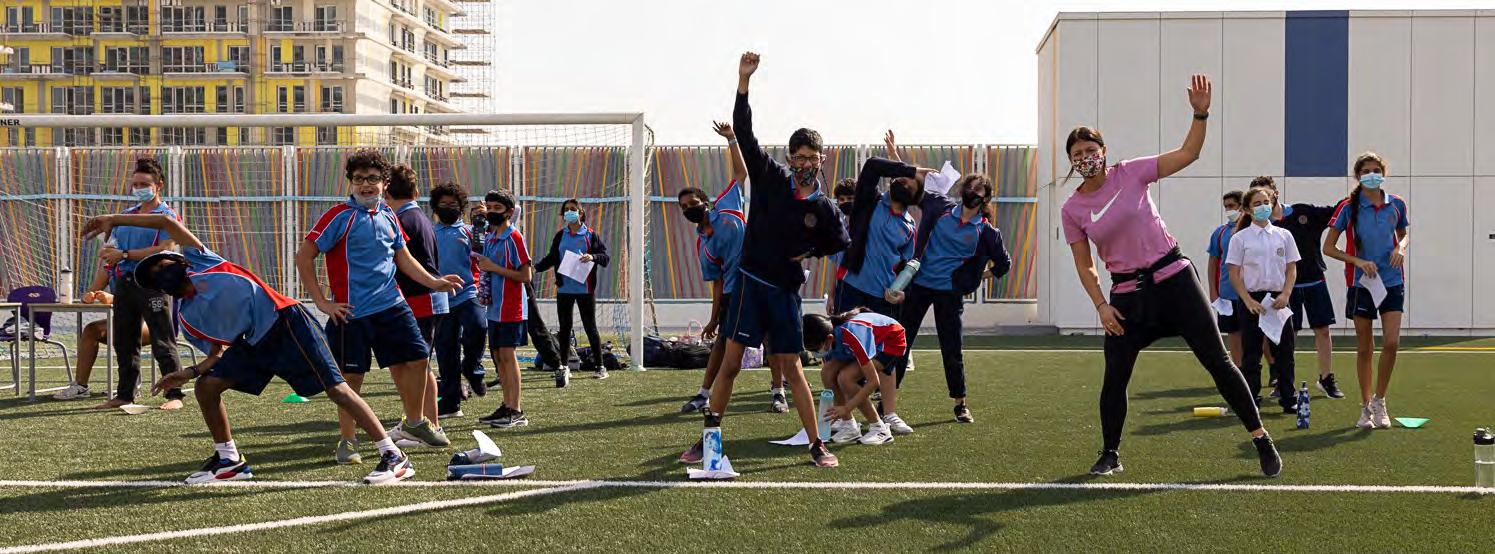


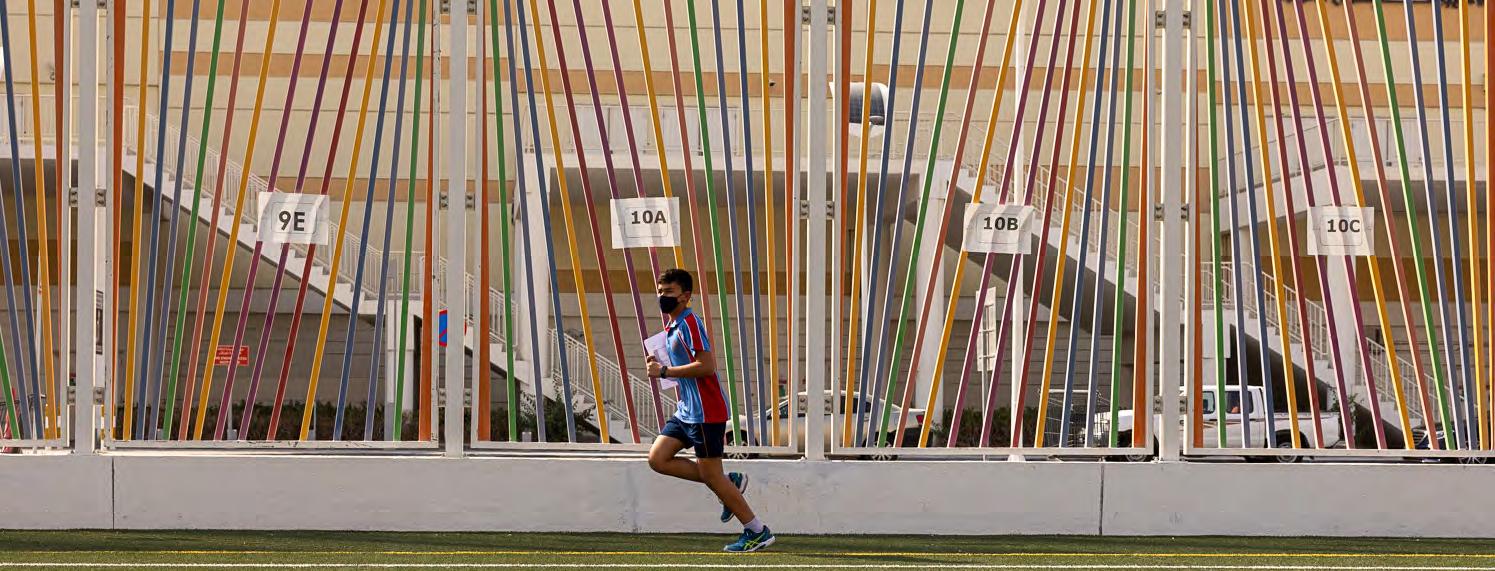
Ahmed House has been on a great journey finding ourselves: learning about the House we want to be, developing our team and our leaders and supporting and encouraging all our pupils, as well as focusing on group achievement, all the while promoting the individual and celebrating their impact on our House. An ongoing ethos of positivity, belief, and hard work has definitely been fostered. Ahmed staff members have been working hard behind the scenes to facilitate student ownership. Our pupil leaders have taken responsibility for planning events, allocating their teachers to jobs based upon their skills, and allowing for the pupils to lead sessions themselves with peers leading peers within a vertical structure. Year 10 pupils have led Year 13, and Year 13 pupils have led Year 7. Respect and perseverance have been the overruling expectations within our House. Our staff, pupil leaders and Ahmed House as a whole have found their pathway, and this year we have walked it together with pride.
The House system is a wonderful string to the bow of Sherborne Qatar. Pupils who come to our school join Houses which support, encourage, and develop them outside of the traditional curriculum areas. We have raised money for charity together, and this is what makes Sherborne pupils so competitive, and in Ahmed House our awareness of this is what has led the House leadership team to be successful.
This is the first year when Ahmed House has won the Sports Day trophy, gaining the most points in all our events through believing in ourselves and all participating to the best of our abilities. It meant so much to us to have exceeded our expectations and achieved the respect of finally seeing our name inscribed on the trophy. Our group attendance and achievement of merits have been extremely competitive this year, which is so important as it is a measure of our whole House efforts to be in school and do our best. This has been in line with our success in the individual Interhouse activities. So many times this year, effort from individuals within year groups has won us the competitions by narrow margins. It has become too often to be put down to luck. Dedication, effort, planning and perseverance have helped us to a leading position in the overall House Cup competition.
At the start of this year, our pupil leadership team agreed that we wanted to be the House of love: the House where we care about all members and make them all feel valued, and student led House which
encourages all pupils to have pride in themselves and their Ahmed House friends across all year groups. I truly feel that we have been successful in our efforts, and this is the greatest reward our pupils will take away with them when they leave Sherborne. It has been an honour and a privilege to work with you, to support and encourage you and to be a part of our team. This has been the greatest rewardI have experienced within my teaching career and will forever have raised my expectations of what we can all achieve. I am incredibly sad to be leaving, but equally proud of what we have achieved. Thank you, Ahmed staff, pupils and all our House members, for everything. We have been successful in making Ahmed great again. WHOOP WHOOP!
Mr Hake Head of Ahmed House
Being an Ahmed House captain has been one of the highlights of my year. From online Kahoot to the egg drop and guessing the quotes of our favourite teachers, I was introduced to leading my House. My best moment was winning sports day thanks to the hard work of the whole of Ahmed House. Moreover, despite being nervous in the beginning I enjoyed leading Interhouse sessions and assemblies as it gave me a sense of pride and confidence. In conclusion I would like to give a big thanks to our wonderful Head of House, Mr Hake, for making Ahmed House great again!
By Aya Ortashi, Year 8 Ahmed Junior Captain

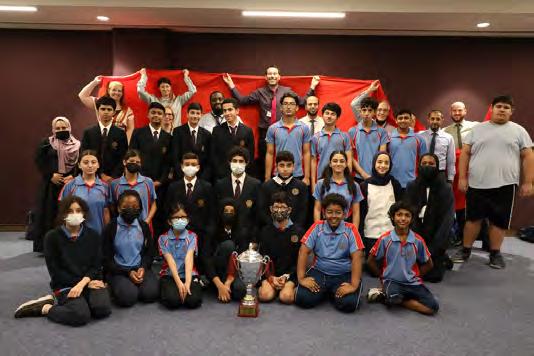
Despite an uncertain start to the year, Interhouse has thrived. As restrictions eased, our biweekly competitions returned in full force bringing with them new activities. This year has brought Ahmed House together, strengthening our teamwork and creating a supportive, understanding and encouraging environment. One of my favourite house moments this year was when we won sports day and we were given the trophy. We finally cut off those green ribbons and added a pair of red ones instead! This year I was not only able to interact with people from Ahmed in my own year but also pupils from other years, as well as getting to know the other Ahmed house leaders. It has been amazing working with all of them and meeting every week to go over our plans. I’ve had an incredible time and I truly couldn’t be more thankful to every single member of our house.
By Rebecca Mathew, Year 10
Ahmed Middle Captain
At the start of the year, we had a few goals as a House leadership team, the main one being winning Interhouse. Every year Ahmed House started strong and then ended up losing control by the end of December. It was clear that we needed to focus on maintaining our lead. We went into every competition with two mottos – ‘One Team One Vision’, and ‘Make Ahmed Great Again’. I can assure you that we have made Ahmed great again this year. We have maintained our lead on the House table by taking responsibility for our House and being as consistent as possible, regardless of ups and downs we encountered. We made history by winning the sports day trophy for the first time in Ahmed’s history. We are now in the last few weeks of the school year, top of the table, and with great perseverance we will reach our target! This wouldn’t have been possible without Mr Hake’s great leadership, the effectiveness of our leaders, and determination. Well done this year Ahmed house, we made history! #ONETEAMONEVISION
By Anas Abdelmoula, Year 12
Ahmed Senior Vice Captain
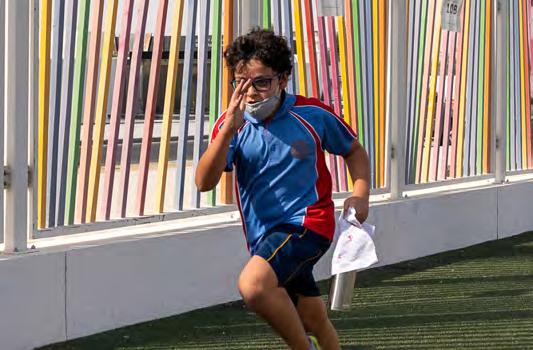
This year we saw so many restrictions lifted which meant we could finally have Interhouse activities which involved sports and other physical activities rather than doing quizzes. Ahmed pupils have gone above and beyond when supporting our House in the various activities. We started the year strong and have achieved our first sports day trophy win! We could not have done it without every single Ahmed House member who showed up to every Interhouse and gave it their all. Thank you so much for your efforts and a special thank you to the Ahmed house leaders who attended meetings every Tuesday to make this all possible. We also couldn’t have done it without our House leader, Mr Hake, who kept us motivated and determined. Maintaining our team spirit was our number one priority in Ahmed house and I am sure it is the reason we have been able to succeed and earn as many points as we could. One team One vision! I am beyond proud of our house, and I am proud to call myself the House captain of an amazing, resilient and happy house. I wish you all the best next year and the best of luck with any challenges you may face.
By Nadeen Yosif Kalil, Year 13
Ahmed Senior Captain



Every year I am thrilled to see how hard-working and committed each of Cook House members is during Interhouse. This year I was delighted to see how energetic and competitive pupils were in preparation for Sports Day. What a dazzling adrenaline filled atmosphere we experienced during Sports Day once again this year, resulting in us reaching 2nd position in several events. All members of Cook House fervently took part in the competition which culminated in Sports Day being a huge success for Cook House!
During the year, we had some truly outstanding performances from our highly capable artists and drama performers; every Cook pupil gave it his or her best. I would like to thank pupils and staff for an amazing year again!
The Cook House Captains have been fantastic. Libby Wollaston,Year 13, is an aspiring young lady who is conscientious and has been dedicated to doing the best for our House. Both our vice captains, Sarah Hamud and Aljori Al Kuwari from Year 12 are intelligent young ladies who are always happy and willing to take the lead. They really have led by example, participating in planning House events, and leading most of the Sixth Form House Assemblies this year. It has been clear to me that all members of our team, including our Charity Representatives, in Cook House have wanted to do as much as possible this year to get involved, in our meetings discussing participation and engagement, and by each taking responsibility of leading events which took place in school. I look forward to working with all our Representatives next year, and to welcoming new pupils who choose to develop themselves through taking leadership roles.
Ms Khayari Head of Cook House
Team players. Kind. Respectful. Responsible. Competitive. Ambitious. These are the words often used to describe people in Cook House. We always try our hardest and are willing to participate in anything despite not being the sportiest house, yet people want to join us. Some of the most memorable competitions that Cook House enjoyed included drama, quizzes, and various sports competitions. When faced with hardships, the older years offer advice and guide the younger years to improve their
motivation. Personally, I enjoyed being a charity representative for Cook House as it allowed me to interact with the rest of the House and allowed me to develop my confidence.
By Eman El-Gohary, Year 11
Interhouse competitions vary from sports, brain teasers, arts, and crafts to quizzes! My favourite Interhouse was the basketball tournament played in the Large Sports Hall. It was a team effort, and our tactics were to pass to each other and use teamwork to win. There were also other games going on from Year 10 and it was so much fun to watch. Cook house won every game and it was so much fun. Brain teasers are also very enjoyable. We work together and figure out the clues leading to the solving the quiz! Sometimes it can be math related, guess related and there was also a quiz on the FIFA World Cup 2022. We thought hard and tried to remember every fact we could and tried to answer as quickly as possible because the fastest time would be the winner. Overall, Interhouse is one of the highlights of the week and my friends and I enjoy it to finish off the week!
By Samarah Abbasi, Year 7
The interhouse competitions have been absolutely amazing all year round. After a long week of studies, you can finally take a break on the last period of a Thursday afternoon. The Interhouse has caused a sense of great competition and sportsmanship within me, as well as in the other members of Cook House. Though we were unable to attend our regular venue at the Aspire dome for Sports Day, we were able to quickly think of an alternative and made sure everyone had fun competing for first place.
Abdullah Gelani, Year 11
This year was filled with lively and interesting Interhouse competitions every fortnight. From basketball to sports knowledge, escape rooms to cultural Ramadan posters, every week has been diverse. Personally, my favourite Interhouse throughout the year was the Year 9 dodgeball which resulted in a win for Cook House. I appreciate how interactive every Interhouse was even with the COVID restrictions enforced. No matter how competitive an Interhouse would get, we all maintained great sportsmanship.
By Duaa Ibrahim, Year 9

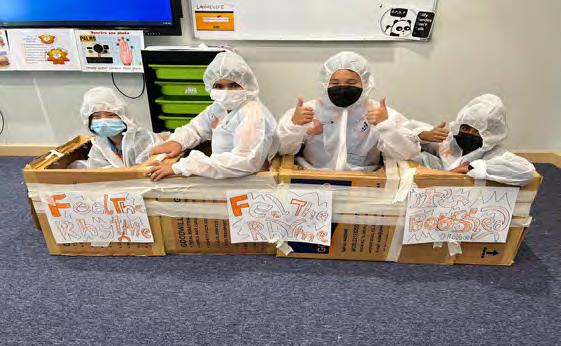




Each year I am amazed by the continuous comradery, teamwork and support that is ingrained in Copeland House. This academic year we have continued to face the challenges of the restrictions placed on Interhouse due to the ongoing pandemic, yet Copeland’s adaptability, tenacity and perseverance have shone through continuously.
Although there have been difficulties and we have struggled to retain our mid-table position, there has still been an abundance of laughter and joy experienced by Team Copeland. There is a fantastic sense of support within our house, that allows all of our pupils to take part in various activities which showcase the diversity of talent that we have at our disposal, whether that be sporting, artistic, mindful or academic. There have been a series of highlights throughout the academic year:
The House Performance – The team were tasked to reimagine the classic fairy-tale, ‘Cinderella’. Led by our brilliant Junior Captain and Junior Vice-Captain: Kulsoom and Gabriella in Year 8. Both girls demonstrated fantastic leadership, comradery and support to their peers and they produced a dynamic, funny and innovative performance. Very well done to all of those pupils involved.
House Albums – Both our Year 9 and Year 10 entries for our House Albums scored extremely highly; there were some fantastic songs; ranging from The Beatles to Coldplay to Bob Marley. The choices captured the unique personality and characteristics of Copeland House. There were also some brilliant graphic designs created by Annette in Year 9; her use of colour, image and graphology was of a very high standard.
The Copeland Bobsleigh – The Year 8 boys, with the help, guidance and wisdom of Mr Tracey, designed and created an eccentric bobsleigh. The boys were so incredibly proud of what they had produced, and so was I. It may not have gained first place, but the joyous atmosphere, created by the boys, really epitomised what it meant to be part of our House and the bobsleigh remained in my classroom for a long time afterwards.
Finally, throughout the year there has been an abundance of sporting highlights for Copeland. The SixthForm boys and girls volleyball teams performed incredibly well; they showed real determination and grit in what were two very tense finals. For the Juniors, our Year 7 and 8 rugby team was something to behold; the return of team sports was Interhouse at its best. Our MVPs were Maryam Al Kaabi in Year 8 and Gabriella Franklin in Year 7.
In conclusion, I am extremely proud to be Head of Copeland House, due to the hard work, dedication and commitment from not just all the pupils but the staff members as well. Without the support of our wonderful staff team, our House would not function. Thank you all so very much for a memorable and brilliant year. Keep digging deep, working hard and pushing yourselves to be the best house we can be.
Mr Ball Head of House


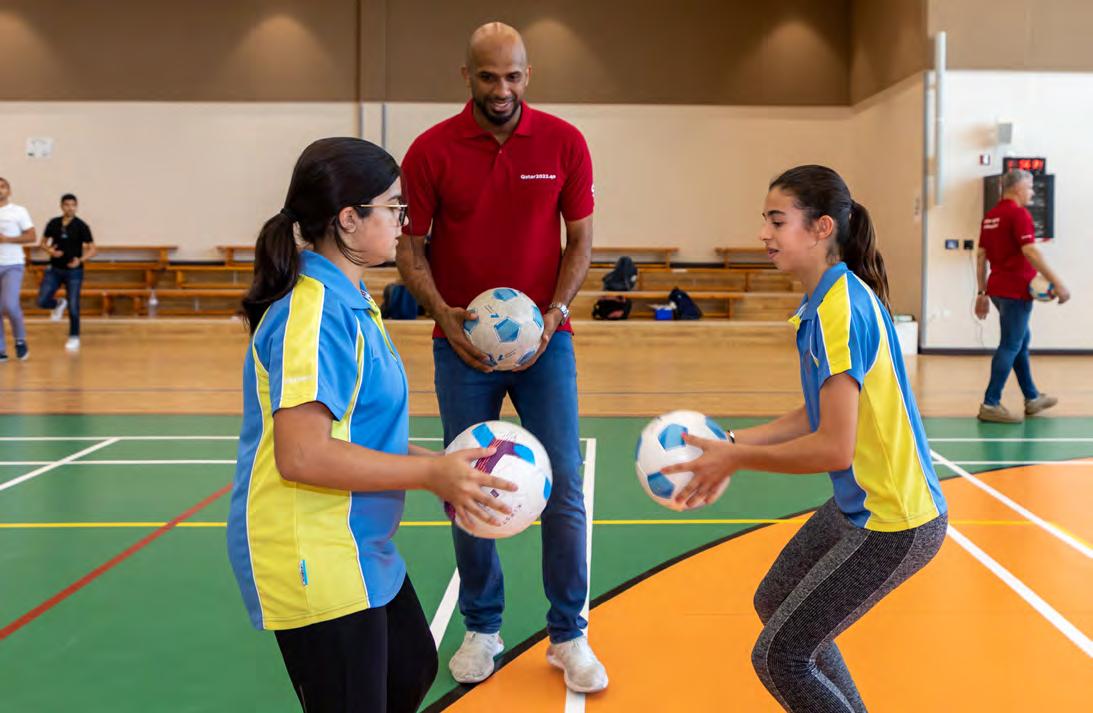

My first year as Head of Cutler has greatly exceeded my expectations. It has been a pleasure and a privilege to work with an amazing cohort of pupils and discover how much each of them has to offer to this House.
The excitement of starting the academic year in a brand new school and the progressive easing of the COVID restrictions allowed us to implement a great variety of ATEAM Interhouse competitions. From sports events to creating a marble run, writing and performing a pantomime to raising money for Charity by doing a Sponsored Walk, every other Thursday there was a real buzz at Sherborne Senior School!
A special shout out for the best results in:
• Year 7 and 8: design the football, table tennis and egg challenge
• Year 9 and 10: gymnastics and football tennis
• Year 11 and Sixth Form: Marble run competition and Danish longball
Another highlight of this year was the successful Sports Day on 10th March organised by the PE department. Cutler pupils really enjoyed this event after two years of hiatus. Cutler came 2nd overall and proudly came 1st in basketball overall in the track events (Year 11 and Sixth Form pupils) and field events (Years 7, 9 and 10). What a brilliant set of achievements! We were all glowing with pride when we learned the results.
On a different note, Cutler Captains and Vice Captains have played a pivotal role this year encouraging our House in every single competition and showing great leadership in different events and assemblies. It has been tremendously rewarding to see the pupils develop different skills, watching them encouraging their House to win the competition, and all the while being loyal to the school values.
A special mention should be made of Syed Abedi, Nuran Abdala and Shireen Khan for their eagerness and effort since day one.
Finally, I want to take this opportunity to thank all the staff members in Cutler as their hard work is instrumental towards the development of the House system. On behalf of Culter, we wish Miss Mahomed good luck as she leaves us to move to the Girls’ School. The Sixth Form pupils will miss you!
I look forward to promoting the Culter House spirit and striving for our best version of ourselves next academic year.
Thank you for your fabulous contributions and participation this year.
Miss Cobo Head of Cutler House
‘This year was one of the best years for Cutler as a house and for the school in general, as we could finally do Interhouse physically after 2 years! Throughout the year, every Interhouse I participated in was not only fun, but it also brought the house together and an incentive for everyone to try their hardest in order for us to do well and try to win. Not only did it bring unity to the house, but it also brought unity to the school. Interhouse activities ranged from sports to quizzes. There was never a lack of variety, and it was great finding out what was next with everyone eagerly waiting and hoping it was something they wanted. Some of the most memorable moments from Interhouse from my personal experience were the Year 9 boys making it to the final of both dodgeball and football. Not only did these activities unify us but they were also a great way of ending the week. Overall, Interhouse was a thoroughly enjoyable experience this year.’
By Syed Abedi, Year 9 Middle Captain
‘I really enjoyed being part of the Cutler team and I especially enjoyed interhouse at the end of a tiring week! Each interhouse was interesting in its own way and I also liked leading some of them as I got to know everyone’s strongest skills. My favourite Interhouse would be the investigating and physical ones as they were fun to do! I am greatly looking forward to what will be in store for us in Interhouse next year!’
By Shireen Khan, Year 8
Junior Vice Captain
‘Interhouse meant that I could bond with my friends; we all worked well together and we had a lot of fun. I felt like I was a part of a team at all times and we shared lots of laughs together! Interhouse was my favorite period of Week B because it meant we had the different competitions to enjoy together and Miss Cobo motivating and challenging us to be the best house! I’m so proud of the Cutler Year 11 pupils, for constantly working hard and pushing themselves and hopefully next year will be even more exciting!’
By Noora Alajmi, Year 11
Charity
Representative
‘Interhouse days are fun, adventurous and pretty challenging.These challenges help us to know our mistakes and learn better from them.’
By Ahmed Jaward, Year 7
Cutler pupil
‘This was my first year as a member of the House Council, and I was honoured to be Middle House Vice Captain of 2021-2022 of Cutler House. This year, the House system provided great opportunities to lead major house events, such as: assemblies, Interhouses and more! I’m sure the House Council can agree with the fact that these opportunities to lead house events will be incredibly beneficial for us moving forward. I cannot wait for next year’s Interhouse competition!‘
By Nuran Abdalla, Year 9
Middle Vice Captain



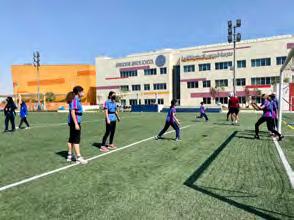
‘I enjoyed participating in many interhouse activities that ranged from sports to brain teasers because I think that they encouraged teamwork and perseverance which are in fact two of our school values. Working collaboratively is a very important skill to have, as it shows you can work well under any circumstances. In conclusion, I am very happy to be a part of and represent Cutler House. GO CUTLER!’
By Lucia Hanna, Year
Charity Representative
9




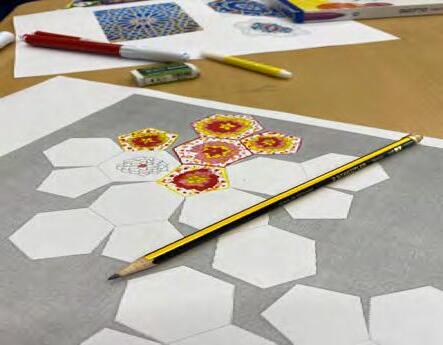

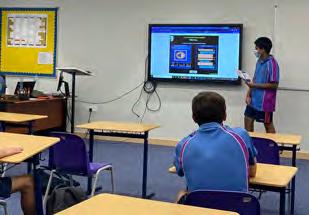
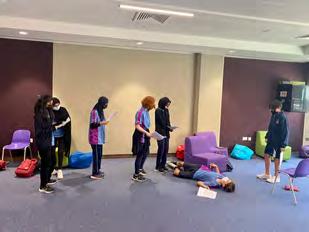

What an eventful academic year 2021/2022 has been! From the start of the year, COVID restrictions have affected so many of the activities that we have been able to do. From blended learning, online learning and back to full capacity, Hamad pupils have excelled in coping with the many changes; routinely having the highest attendance and punctuality figures and living up to the House motto, ‘Hamad Works Hardest’. There have been some highlighted achievements this year. Winning the first Interhouse challenge set the ball rolling for many of the activities. Year 8 have had two stand-out events; the design skills in the Egg Drop challenge caused the other Houses to crack and our bobsled designers and racers slid into first place. A team of highly creative Year 11 and 12 girls created an ICT Stop Motion video, featuring our very own Hamad Shark, which was a huge success and swam its way to victory.
The return of regular Active competitions and traditional sports, saw our Sixth Form boys dominate on the badminton court and our Year 9 and 10 table tennis duo did the same on the tables. In the other sports, we may not have fared as well, but all pupils competed with determination and House pride.
I am extremely proud of each and every one of our Hamad pupils and thank you all for your hard work and determination. I look forward to next year, when hopefully, we can improve once again on our final standing. Miss Robertson Head of Hamad House
‘My experience with Hamad house has inspired and motivated me to work harder and realise the importance of teamwork’.
By Lamis Khalid, Year 10
Middle-Years Vice Captain
‘It’s been a joy working with Hamad House this year; everyone worked their hardest, which is what made this year special to me.’
By Ali Elbih, Year 10
Middle-Years Captain
‘I really enjoyed participating in the Pantomime and, even though I originally didn’t want to do it, it pushed me out of my comfort zone and was great fun to do. The Interhouse events were exciting and really well put together. Hamad House has given me multiple opportunities to enjoy Year 9. I love the enthusiasm in Hamad House, as well as the determination to be the best!’
By Ava Berger, Year 9
‘I have thoroughly enjoyed being House Captain of Hamad this year; all the hard work and commitment of many pupils in the House is admirable. I am so proud of the community that has been built within Hamad House, the perseverance and teamwork that is shown every Interhouse just illustrates that Hamad does, in fact, work hardest!’
By Emily Dobison, Year 13
House Captain
‘I am extremely grateful to be working with Hamad House, participating in and witnessing all the amazing Interhouse competitions that happen throughout the year. The motivation and encouragement I see around the school really shows that Hamad has lived up to its motto - ‘Hamad Works Hardest’!’
By Abdullah Wajahat, Year 8
Junior Years Captain
‘I’ve had an amazing time working with all the members of Hamad House - we have all learned so much from one another and achieved so much together. It has been hugely rewarding’.
By Elizabeth O’Donnell, Year 7
Junior Years Vice Captain



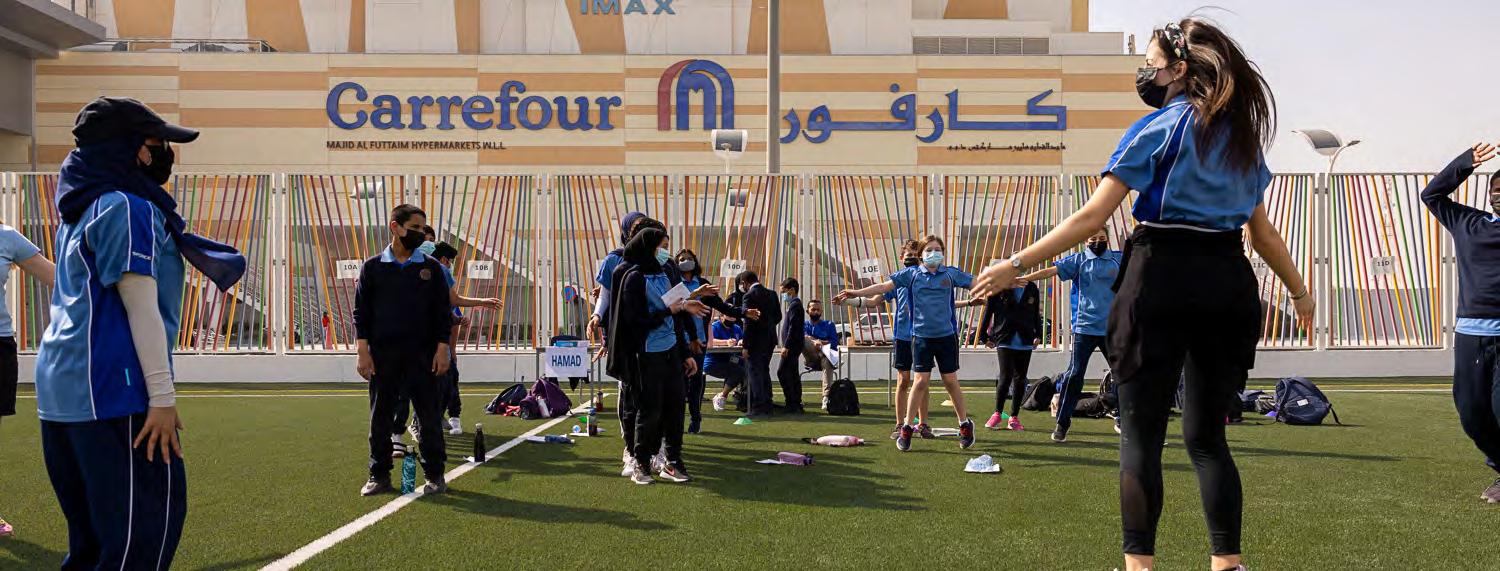

2021-2022 has been another challenging year with COVID-19 situation continuing to linger on; however, this time around we had much more freedom compared to last year and were able to compete in the much loving sporting activities, such as football and volleyball, to name a few. We also had the new state-of-the-art school at our disposal, which made us very excited!
Moza House prides itself on high standards and winning is something we are quite used to. Having won the trophy for the fourth time in a row last year, we will always pride ourselves on our achievements as this is a testament to the pupils who love to compete and give it their all. This year seemed slightly different, the other Houses had upped their game and kept pace with us. It has been wonderful to see a close race between multiple Houses with pupils taking the lead and this is something we wish to continue in order to develop their talents.
Some interesting statistics were drawn up throughout the year, with the merit, attendance and punctuality all included. This gave us an idea of where we were going wrong and what we were doing well. Our biggest let down was our attendance, yet our Interhouse scores were just off first place. This highlighted our strengths and weaknesses and was something we addressed during House assemblies.
With the new school facilities, we were able to complete Sports Day. We managed to do well here and just missed out on first place by only two points! Nevertheless, our pupils gave it their all and the finer detail always makes the difference.
Interhouse this year has seen a variety of activities that pupils thoroughly enjoyed. We started with the Code Breaker Challenge, where pupils went around the new school finding different codes to bring back to the rest of the team. We also managed to do an Egg Drop Challenge; pupils had to design a parachute to prevent their egg from breaking. Marble Run was also a popular challenge; pupils had to work in groups to construct a frame that would keep the marble rolling as long as possible! As well as the usual sporting activities, pupils had lots of fun with House performances, where pupils had to enact a pantomime they had scripted weeks before.
We managed to raise another huge amount for charity in support of UWS and supported the Ramadan Charity Project. A special thanks goes
out to our House Charity reps: Muhammad Raahim Durraiz, Noora Hamad M S Al Hajri, Essa Hemoud Al Shammari, Erik Paul and Moza Al Thani . I would also like to take the opportunity to thank our House Council Reps Maab Elsheikh and Mariam Hanoun ( both playing a key role in all aspects of Interhouse and Charity!
Mr Ahmed Head of Moza House
Finally, a massive shout out to our House Captains and Vice Captains for their endless support and determination to lead Moza House and for going above and beyond expectations! Below are a few comments reflecting this year:
“We’ve had our ups and downs this year and not everything went as planned; nonetheless, we still had a great year and for my fellow Year Sevens and me a great start to the Senior School.”
By
Juraj Kovacic, Year 7
Junior House Vice
Captain
“Despite us not being in school all year, we have finally started to return to normality; we enjoyed activities like the escape room, sports day, and exciting quizzes that were challenging and made us work together as a team, and hopefully everything will be back to normal next year and we can do even more fun things”
By Hla Mohamed, Year 8
Junior House Captain
“We began this year doing blended learning, where Interhouse that took place were online, for example the record breakers. As the year progressed, we fortunately were allowed back at school at 100% capacity! This meant that our Interhouse sessions were mostly back to normal; allowing houses to compete against each other in fun challenges such as the Marble Run, Maths challenge, Paper Plane and many more. Not only that, but physical challenges as well such as volleyball, badminton, and gymnastics! All students have showed great amounts of effort whilst participating to help their house win! See you next year and remember to be proud of yourselves!”
By Alba Confalone, Year 10
Lower Senior House Vice Captain
“At the start of the year, we were still doing blended learning, as a house we persevered through this and tried to continue as normal. Although, this year has not been easy for us, the most important thing is that we have made a huge effort and that we still have been able to enjoy the year.”
By Henry Kakkad, Year 10
Lower Senior House Captain
“This year, we all learned a lot about cooperation; with games like the code breaker challenge, football, badminton and many more, working together is what helped us do the best that we could. Even when we don’t reach first place in the activities, the fun and hard work put into it is appreciated. At the end of the day, being number 1 is not what is most important, it’s ensuring that we have fun and make wonderful memories during the year and Interhouse helped us accomplish that.”
By Mariam Mamoon Hannoun, Year 12
House Council Rep
“This year has been a wonderful transition back into the normal school experience. We were introduced to the school’s fabulous new facilities, we got to see the other half of the school for the first time after COVID-19 and we were able to take part in our enrichment activities again. Interhouse became more interactive resulting in more and more students looking forward to Thursdays on a Week B.
Personally, I believe I have prospered this year, especially in my role as Charity Representative and as a devoted member of the Moza House Committee. I can confidently say that I was able to develop my leadership and communication skills by leading Interhouse activities for different year groups. Sometimes, I had to step up to the challenge and even get the attention of those older than me, but by being responsible and confident, I was prepared to face whatever challenges might come my way. Conclusively, my pride for Moza House has evidently blossomed and I can’t wait to apply for a more esteemed role next year!”
By Maab Elsheikh, Year 11 House Council and Charity Rep
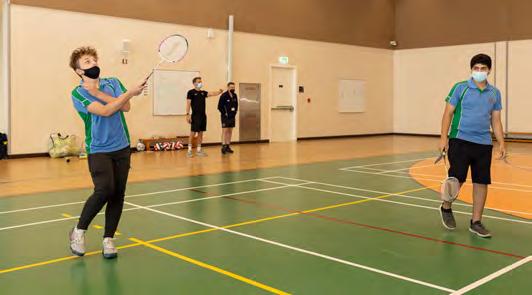

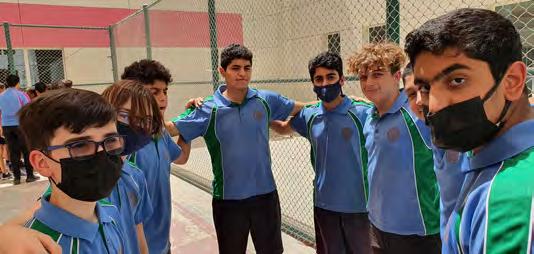
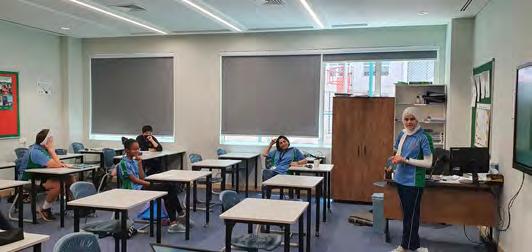


Pupils have had a great time exploring different board games and developing their competitive skills. Particular favourites this year included Ludo, ‘Burro’, Scattergories, ‘Berrido’ and Spanish card games. During every session laughter from pupils (and teachers!) could be heard. There was a great mix of year groups from Year 7 to Year 10 and it was wonderful to see how everyone got on and enjoyed each other’s company.
Muchas gracias, Miss Arandiga & Miss Cobo



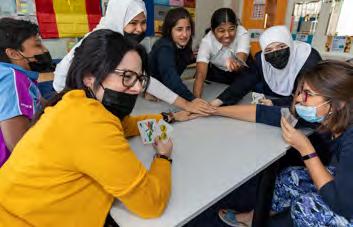
With record numbers for the online tournaments and enrichment club, and the addition of the giant board in courtyard 1, Chess at Sherborne Qatar is going from strength to strength. The benefits of chess in terms of improving analytical and problem-solving skills have long been documented, but it is the sheer pleasure of pitting one’s wits against one’s opponent that make chess so appealing. The three tournaments this academic year have, as always, attracted players from the whole school community. Pupils, teachers, support staff and parents have battled it out amongst each other as the standard of chess has steadily improved.
September saw the start of the first tournament with over 40 players. Group 4 saw some of the closest games, with Mr Arts and Jay from the Facilities team somehow managing to beat Omar Al Masri (Year 9) to the qualifying spots. Chi Chong (Year 8) and Mr Tracey were also unlucky not to qualify for the final having played some outstanding chess early on. Mr Hamlin, Mr Ranglall and Mr McKendry however did manage to make it through to the next stage, but eventually came unstuck against some very stiff opposition. This was
mainly in the form of Niranjan Muthuswamy (Year 12) who, after a year away from the Sherborne tournaments to concentrate on his GCSEs, was back with a vengeance. The improvement in Niranjan´s game was clear to all and with Shek Chong (Year 10) and Hamza El Sayed (Year 9) losing on time in a number of games, he soon found himself in a commanding position. However, tournament regular Mr Corbin (father of Jorja, Year 9) proved too much of a tactical adversary and in the end managed to beat Niranjan to the top spot.
The competition continued in Term 2 and there were some intense games early on particularly in group three, which was dominated by Shek Chong.Mousa Al Hares (Year 8) and Elizabeth O’Donnell (Year 7) also played some outstanding chess and were unlucky not to qualify for the next round. As was Mr Hamlin, whose hopes of qualifying for a second final in a row were dashed when he ‘timed out’ against Mr Arts. Eathen Imthias (Year 9) did manage to make it out of a very difficult group however, as did Hamza El Sayed, after beating Mr Tiongson in our first ever tie break. Tournament newcomer Mr Ventorim (father of Ana, Isabela and Daniel, Years 9, 11 and 13 respectively) played well in the next round as did Chi Chong (Year 8) who was also playing in her first final. However it was Mr Corbin who once again got the bragging rights, just ahead of Mr McKendry in second place and Niranjan Muthuswamy in third.
The third tournament began in March and, due to large numbers, the group stage took longer than usual but saw some outstanding games. Among the many newcomers, Belal Ghanem (Year 8) and Ayza Umer (Year 7) soon made their mark and both finished a very respectable third place in their groups. Group one saw Mr Ranglall and Mr Tracey battle it out, and Mr Kinlan had a similarly tough time against Aydin Vallanchira and Faaris Reagu (both Year 9). Making his debut in the Sherborne tournaments, Mr Goldsack impressed early on and made it through to next round. Unfortunately his enthusiasm and bravado were no match against his opponents and he soon fell by the wayside. The final proved to be the toughest and most exciting to date, with Mr Jenkins (father of James, Year 7) starting the strongest. However, it was Mr McKendry who came out on top beating Mr Corbin by just half a point, with Shek taking third.
Congratulations to all who took part in the tournaments, and a special mention to the following overall winners of the 2021/2022 Championship:
Mr Corbin - 1st Place Parent and Overall Winner
Shek Chong - 1st Place Pupil
Mr McKendry - 1st Place Teacher
Jay Javier - 1st Place Support Staff
Mr Mortimer
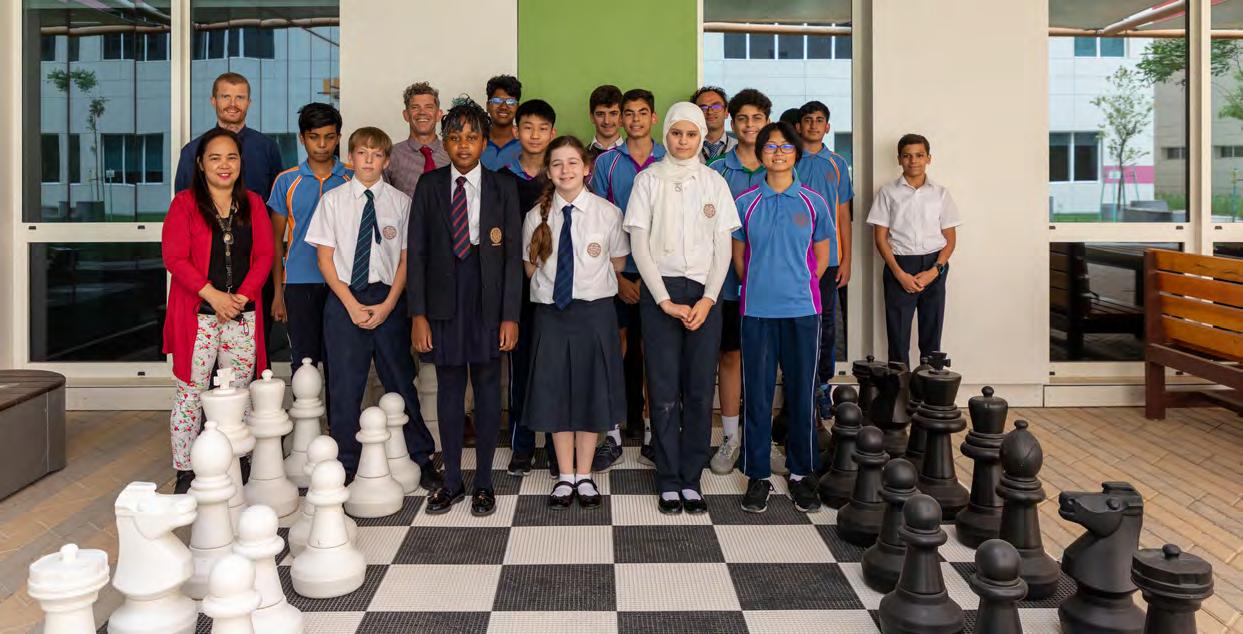
This year saw the launch of the prestigious Crest Awards by the Science Department. These are a series of STEM based projects which are pupils led and highly respected by universities and employers. During Term 1, Key Stage 3 pupils made applications and a select few were chosen to embark on the CREST journey. The following pupils have completed their Bronze Award: Corey, Chi, Safiyyah, Amna, Tiara, Henry, Syed, Nuran and Rameen.
CREST was an amazing experience! It gave me the opportunity to explore other areas of science that I had not yet covered in school. I also learned to plan, organise, and carry out my own project. In addition to improving my responsibility and time management skills, the experience was enjoyable and exciting. I learned lots about how to carry out a fair test, explored different ways of completing my aims, researched, and experimented to understand more about plant growth. All of these were done in a supportive and positive environment. Furthermore, we are given an opportunity to present your work, which enhances your presentation skills.
I would recommend it to anyone who is interested in science and wishes to explore other aspects of the subject - and especially to those who are interested in becoming scientists or engineers in the future - since it gives a glimpse into what it is like to be one or to use science in the real world. There’s a wide variety of options for your project that you can choose to experiment with, such as: space, plants, food, fingerprints and so much more!
By Tiara, Year 9
Attaining the Crest Bronze Award during Term 1 has been an excellent experience. We spent the first few sessions deciding which experiment we wanted to choose and work on for the term. I chose the Bath Bomb project, where I had to experiment on making bath bombs and also discover more about what different ingredients do to potential bath bomb ‘recipes’. Once we had chosen our topics, we received our Crest Award workbooks. These workbooks consisted of all the steps and instructions of what we need to do in order to achieve the Bronze Award. I did my experiment at home and began by writing a list of ingredients which I then bought. My experiment started off by creating an existing bath bomb recipe, and then I moved on to experimenting with different ingredients and testing them out in my bathtub. My experiment took a total of three trials in order for me to reach my goals. We were then asked to create a presentation on how we worked on our experiments. Overall, my experience with working towards the Bronze Award has been great. I found working on my experiment fun and enjoyable, and I look forward to receiving my Bronze Award certificate soon.
By Safiyyah, Year 8
Ms Sultana

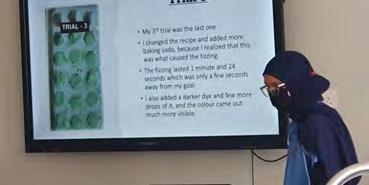
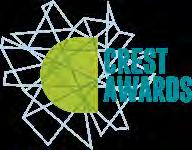
Many of you will recall that last year the Sherborne Qatar Debating Society was pleased to announce that our Senior Girls’ Team was crowned Qatar National Champions 2021. The fantastic performance of our pupils at the debate was streamed online and broadcasted on different social media platforms. Huge congratulations again to Year 12 pupils Shahd Al-Hajri, Turkia Al Thani and Year 13 pupil Janine Obiri for their outstanding performances at this national event. Shahd was awarded fourth best speaker of the league and Turkia second place. Turkia was also awarded best speaker at the Open Grand Final. This year, the dates of the competition coincided with our school half term and the mock examinations in November which meant we were unable to join the girls’ competition.
However, our boys’ team successfully represented Sherborne and attended the Qatar Schools Debate League competitions. Please join me in congratulating the following Year 10 pupils: Henry Kakkad, Mohamed Abdelrahman, Shek Chong, and Khalid Al Marri who all successfully participated in the Qatar Schools Debate League in the senior section this year.
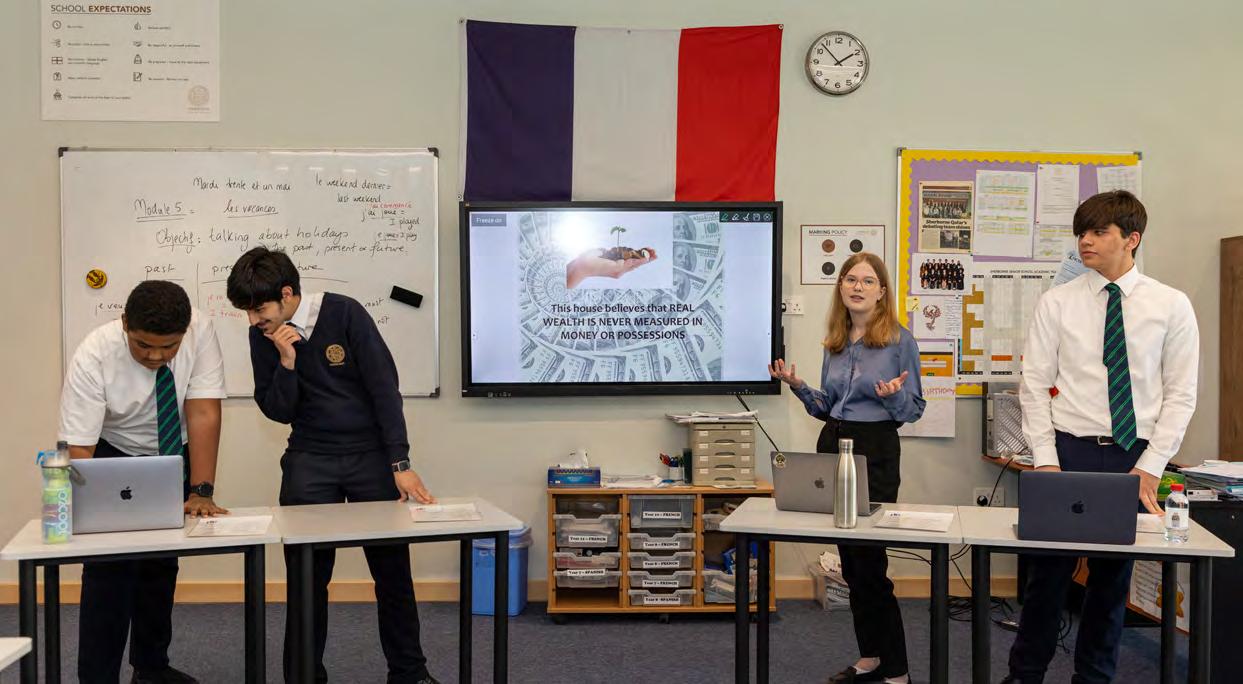
At this national championship, over 300 student debaters from independent and international schools debated for over eight hours on different motions. I look forward to supporting them further as the competitions will be more frequent from next year.
The Sherborne Debating club has been excellent this year and we have attended numerous online events and engaged in several debates within our school. I have been able to develop my public speaking skills, as well as my ability to quickly think of a counterpoint to ensure victory in a debate. Debating has also greatly increased my self-confidence and I am now much more able to speak clearly and coherently in front of an audience. Most importantly, debating has improved my critical thinking and I now understand issues on a much deeper level.
By Henry Kakkad, Year 10
As a fresh recruit to the debating team, I have been graced with the opportunity to debate in a competitive environment against other schools. Every debate had a unique and challenging theme to it, presented to us in an engaging manner. What I enjoyed most about debating were the diverse motions introduced to us which all had disparate difficulties, allowing us to explore these topics with a different approach, and devising a creative method to present our ideas about the motion.
By Shek Fung Chong, Year 10
Competing in debates with other schools over the last two years has been a great and phenomenal experience. I enjoyed all the interesting and unique motions, as well as refining my debating skills from tournament to tournament. All our opponents so far have been great, taking on experienced debaters who engaged with us in fierce and challenging debates. I’ve certainly come a long way from the level I was at last year and feel as though I’ve learned from many of my previous mistakes and considerably improved. I look forward to participating in more debates in the future, and further developing my skills.
By Mohamed Khalid Hassan Abdelrahman, Year 10
After my performance at one of the debates two years ago, Ms. Khayari suggested I joined the trials for the recruitment of the national team which takes place every year at Qatar Debate. That time I was hesitant because I thought it would take my focus away from studies and distract me, but then why not try this opportunity? Since then, I am proud to say that I am a member of the Qatar National debate team, and it was and still is an interesting journey. I have learnt many skills from the countless debates they made us do, and I am thankful after all the training that I joined the team. Debating has become one of my favourite hobbies, and I can’t wait to see what the future holds.
By Khalid Al Mari, Year 10


The debating team has been an enlightening experience. This is my first year doing it and it has been wonderful to be with students who have been doing debating for a while in my year and in other ones. Having a collaborative environment where everyone can discuss their views and can get different perspectives on debatable subjects has been very interesting and has helped me improve my relationships with peers. Throughout my time doing it, I’ve improved my ability to make constructive points, developed my argumentative skills and my overall confidence. Learning how to make my points is a great skill, both for any debating competitions and for the outside world.
By Sana Ali, Year 10
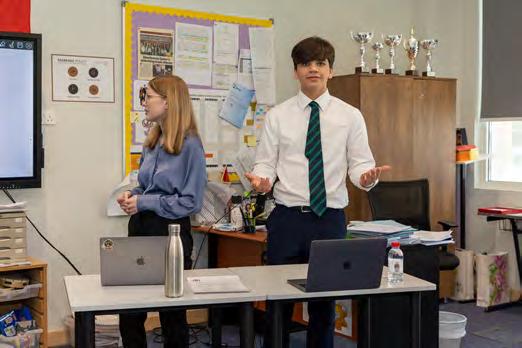



This year the Duke of Edinburgh’s International Award (IA) proved to be very popular with Year 10 pupils, with over 30 signing up to begin this challenge. A number of Year 11 and Year 12 pupils also started the award or continued to progress from last year.
We started off with pupils signing up for a wide variety of activities over the three areas of Physical Activity, Voluntary Service and Skills, as well as preparation for the Adventurous Journey. These activities have shown that our pupils are intuitive, mature, and hugely responsible. It has been great to see so much variety in their activities, whether it be volunteering at the Prep School, taking up new musical instruments and sports or learning to cook. A special mention to Tigen Osiago who is volunteering at the Qatar Sports Museum to help encourage others to become more active.
Unfortunately, due to the continued restrictions surrounding COVID-19, the Adventurous Journey to the Zekreet desert has had to be postponed until the next academic year, where we are sure that the pupils will show once again their amazing teamwork and resilience to ensure that they successfully complete this section of their IA.
Mr Tracey / Mr White
Toastmasters International is a nonprofit, educational organisation that teaches public speaking and leadership skills through a worldwide network of clubs. There are 16,000 clubs worldwide in 142 countries. The idea for this club at school level came about from the fact that I used to belong to an adult Toastmasters Club when I lived in Windhoek, Namibia in 2011. As a result of this experience, I launched a club for pupils at the school I was teaching at at the time. Pupils benefitted greatly from the opportunity to learn the art of delivering effective speeches – both impromptu and prepared.
The intention is to help pupils improve their communication and leadership skills. Members have gradually learned this year to overcome the fear of public speaking and learn skills that aid them in becoming more successful at delivering speeches and talks.
Toastmasters creates better listeners, stronger team members and leaders who can comfortably give and receive constructive evaluations.
Each meeting gives members several opportunities to:
1.Conduct meetings
2.Give impromptu speeches
3.Present prepared speeches
4.Offer constructive evaluation of others’ speeches.
The relatively small group of Year 8, 9 and 10 pupils who joined the club this year enjoyed evaluating the Ice Breaker speeches of 4 to 6 minutes where pupils introduced themselves by means of a Power Point presentation. Their next task was to deliver a talk on a matter of global concern e.g. the refugee crisis in the Ukraine. Impromptu talks, called Table Talks, of two minutes in duration, also give pupils the opportunity to think on their feet and presented an unprepared talk on a random topic provided by the teacher or their peers. It is hoped that there will be a greater uptake for this club in the next academic year as we return to normality after the pandemic and the opportunities for public speaking increase.
Miss Castaldo
The MUN Executive Committee have been very busy this year by conducting an array of workshops and debates for our MUN delegates. A number of local and international were attended via online with the Middle School MUN conference being run face-toface.
We are extremely proud of our MUN delegates who attended the Qatar Leadership Conference via online. This wonderful conference provided an excellent platform where our Sherborne delegates met like-minded educators in their pursuit of developing and expanding their youth leadership skills. A selection of workshops was attended with focus on engaging youth voice and mental health advocacy.
The delegates who attended were: Rameen Arefeen, Duaa Ibrahim, Syed Abedi. We are also delighted with our member delegates of MUN Executive Committee, Lolwa Al Kaabi and Joana Khalid El Moghanni who carried out their duties as part of the Press Team of THIMUN (The Hague International Model United Nations)
We were thrilled to hold our first MUN debate this year by maintaining social distance. Pupils had worked hard, in the weeks leading up to the debate, to research the current situation in Afghanistan, and write resolutions under the wonderful guidance of our MUN Executive Committee. Three resolutions were presented to the committee room and two were successfully passed.
Mr. Reynolds: It was great to see our delegates, especially some of our younger members ‘enter the fray’ and ask bold questions to the delegate of Afghanistan regarding his position paper. I was impressed by the depth and quality of the resolution, as well as the usage of accurate MUN language by all delegates and the chairs, which is required for the committees to run in proper fashion.
NOVEMBER 2021
At the beginning of this year, I started my MUN journey with the incredible experience of the annual THIMUN Singapore conference just a few months
after joining the club. As my first conference, it came with its trials and I found all the proceedings and phrases confusing, especially the first one or two days. But as time went on, I started to get the hang of it, and I started becoming more interested and active when I started understanding everything that was going on. After that amazing conference, I was looking forward to joining and taking part in others and the opportunity arose when we were given the chance to join the THIMUN Qatar Conference, another incredible experience. I also had the opportunity to join the Qatar Leadership Conference, another conference hosted by THIMUN Qatar involving over 400 different workshops held by students and adults on a variety of topics, which helped me gain a deeper knowledge on a range of issues. Being part of this unique club has helped me learn more about politics, history, and the UN along with raising my confidence of public speaking and understanding of governments and policies. I am looking forward to attending more conferences and experiencing new opportunities next year!
By Rameen Arefeen, Year 9
This year was a great year for MUN our school attended multiple conference which varied from being online to being in real life. The first conference I attended this year was THIMUN Singapore which was nothing short of a memorable experience with delegates from all around the world joining being from: Malaysia, Angola, France, Pakistan and much more. Even-though the conference was online it was still very entertaining and was a thoroughly enjoyable with fruitful debates and so much more. The next conference I had the pleasure of attending was THIMUN Qatar which was another fantastic experience once again online. This time rather than going to a normal MUN committee I signed up for Commission on Crime and the prevention of criminal justice (CCPCJ) this was absolutely fabulous as it followed a completely different MUN format and taught me a lot about the difference committees can have depending on the topic of discussion. CCPCJ tackled sensitive issues which were, Measures to prevent organised transnational crimes and Measures to prevent vulnerability for the sexual exploitation of children, both these issues were well debated and overall made this conference great to attend. Finally, I attended Middle School Model United Nations (MSMUN) this was the first in person conference in over two years. I was given the honour of chairing meaning I would lead a committee. I led the committee of SDG 4 where the issue at hand
was: Measures to achieve universal secondary education in North Africa. As someone chairing for the first time I was a bit scared yet absolutely loved the experience. I got on really well with delegates who all loved participating in debates and even-though they were middle schoolers debate never felt boring. Furthermore, chairing in a real life MUN conference was one of my best MUN experiences.
By Syed Muzammil Raza Abedi, Year 9
We are delighted with our Executive Committee members: Moza Al Hitmi, Lolwa Al Kaabi who were appointed in the press team and they were in charge of videography in the prestigious THIMUN Qatar conference. Joana Al Moghanni was the head of videography!
This year was a major step for my MUN journey. It was the first year I have chaired at a conference and taken further responsibilities in THIMUN. As a chair for Security Council, I helped manage the debate and ensure the participation of each delegate. However, the best part about being a chair is watching the debate, every single person has a different point of view, and it is nice seeing people work through their differences to find a resolution to the issue at hand.
By Henry Kakkad, Year 10


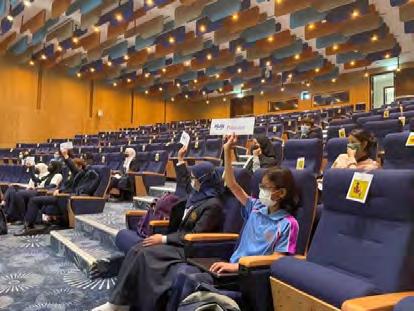
This year saw the return of sports enrichments and sessions filled up fast. During Term 1 we had a full house for Key Stage 3 netball fitness and it felt so good to get back on court again; albeit in a slightly modified way. Pupils tested their netball specific fitness levels and skills during week one, and through conditioned game play and specific drills we worked on developing our sport specific fitness for the remaining weeks. In the final week, pupils repeated the tests from week one and all pupils saw an improvement in at least two areas of the netball fitness. This format was replicated in Term 2 for pupils in Years 9 to 13. It really has felt great to get back to some sort of reality and to get back on the court. We look forward to next academic year in the hope that we can play competitive netball matches against other schools again.
Miss Price
The photography enrichment has been a very popular club this year with lots of pupils attending from across Key Stage 3. It is an exciting opportunity for pupils to explore and develop their photographic skills. Pupils get the opportunity to collaborate on collaborative projects or work individually. The formal elements of photography are explored but in a fun way and some of the skills pupils learnt included: leading lines; macro; rule of thirds; depth of field; light; texture; and organic form. A favourite theme of mine was ‘Lego Town’ where pupils photographed Lego figures in a miniature setting. A highlight from this year was Eathen Imathais’s (Year 9) compositions which were taken with creativity and humour.
The regular attendees below deserved to be mentioned for their enthusiasm and inspiring photographs.
- Samarah Abbasi, Year 7
- Zeena El Gebely, Year 7
- Talykwan Rees, Year 7
- Daisy Hanna, Year 7
- Eathen Imthais, Year 9
- Fadhila Mohammed, Year 8
- Joel Nowurum, Year 9
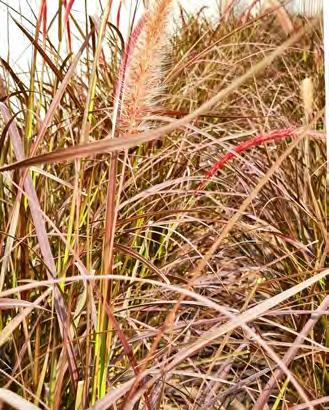
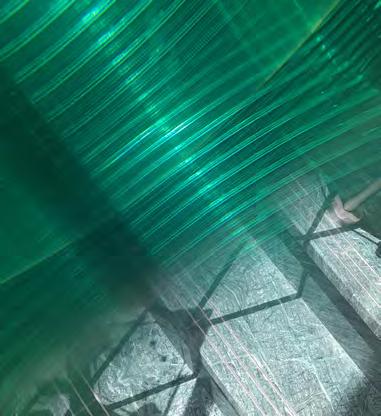


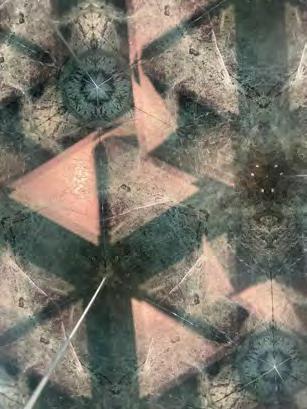
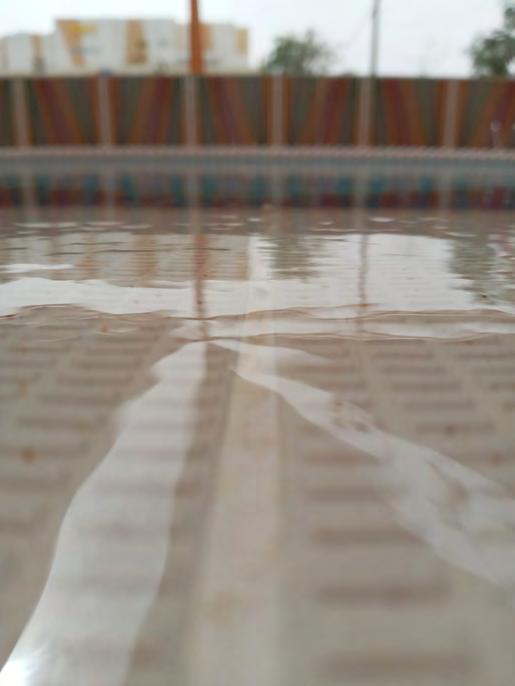
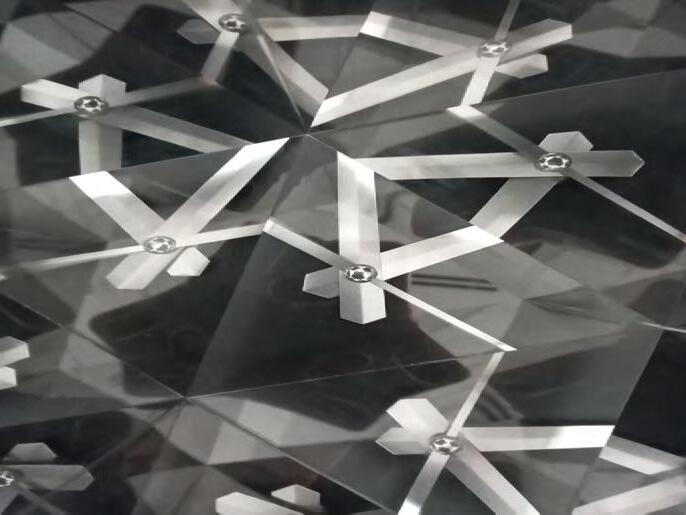
Tabletop gaming at Sherborne Qatar continues to grow. Thanks to the dedication of the pupils’ painting and model assembly, we are now beginning to have some epic games. Pupils from all years are in control of a wide range of armies – from the evil hordes of traitor legions to the relentless guardians of humanity, the Warhammer club is all about using your tactical skills to outmanoeuvre your opponent – or it’s simply about crushing your enemies!
Mr Leeder

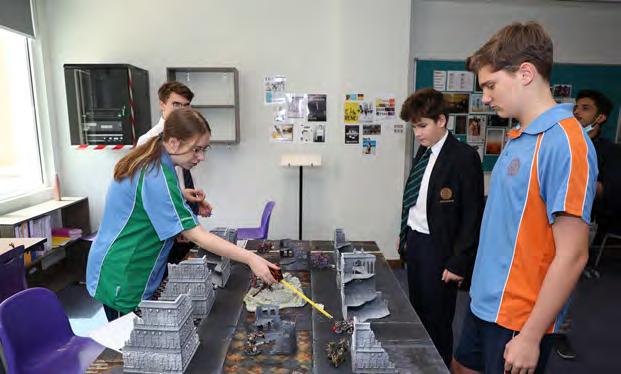

In November 2021 we held a presentation for our Colours Awards winners for the 2020/21 Academic year. Due to COVID-19 restrictions it was not possible for pupils to meet the criteria for Sport and Charity/Service, but there will be an opportunity in future to do this.
Despite the pandemic, however, we are delighted to announce the following awards winners in our Academic, Enrichment and House fields.
Colours our the highest level of awards that pupils can achieve in Sherborne.
We encourage you to watch the following video https://youtu.be/rZ359VtDvMQ to understand the importance of our Colours Awards and the criteria by which pupils are judged.

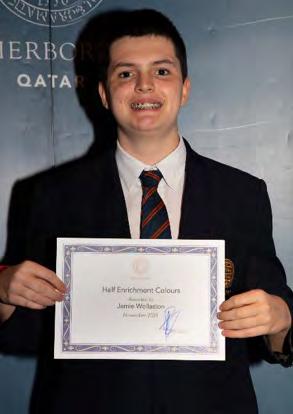
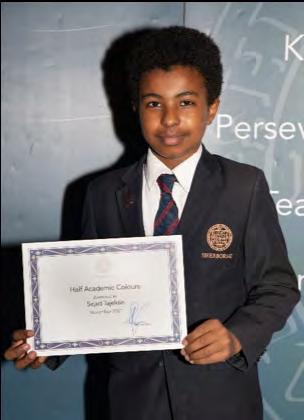
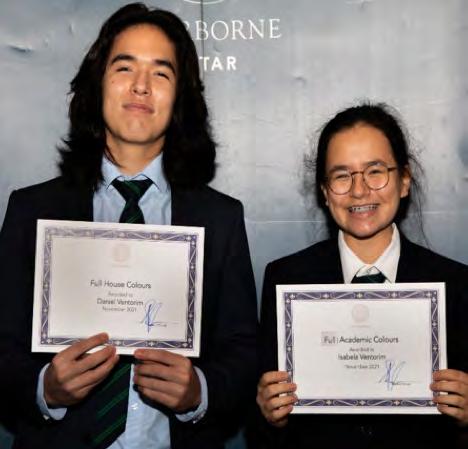




Gold penny and tie – For multiple Full Colours:
Name Colours Award
Gul E Butool Abedi
Turkia Al Thani
Full Enrichment
Previous Full Academic
Full Enrichment
Full House
Silver penny and tie – For Full Colours in one area:
Name Colours Award
Niranjan Muthuswamy Full Academic
Haneen Ortashi
Isabela Ventorim
Kashmala Afridi
Areen Al Hyassat
Emily Dobison
Hadeel Dossa
Sarah Hamud
Saul Saunders
Daniel Ventorim
Full Academic
Full Academic
Full House
Full House
Full House
Full House
Full House
Full House
Full House
Bronze penny – For Half Colours in one or more areas:
Name Colours Award
Nadeen Yosif Khalil

Henry Kakkad
Sana Ali
Zoe Berger
Abdelrahman Ghanem
Daisy Kinnaird-Barr
Alreem Al Kuwari
Half Academic
Half House
Half Enrichment
Half House
Half Academic
Half Academic
Half Academic
Half Academic
Half Academic
Emily Spicer Gregory Half Academic
Sajad Tajeldin
Jamie Wollaston
Raihah Chaudhry
Rebecca Mathew
Half Academic
Half Enrichment
Half House
Half House
Thursday 16th June provided us with the opportunity to run an in-person Commem celebration for the first time in 2 years. Whilst COVID-19 restrictions meant we could not have the whole school present, we did none the less manage to host an event with various Award winners, performers, and special guests, with Year 10 pupils providing the audience.
Each year is special in the life of a school and Commem is our opportunity as a community to celebrate our pupils’ many achievements. At Sherborne Senior School we want to celebrate success at every opportunity, and we believe every pupil has the potential to excel, and to be rightly proud of their achievements.
Our special guests at Commem., included Ms Alexandra Cole, the Deputy Ambassador from the British Embassy, and Ms Fatma Al Jaidah, the Project Director at the Supreme Committee for Delivery & Legacy. In collaboration with project teams and relevant stakeholders, Ms Al Jaidah is responsible for managing the visitor experience during the FIFA World Cup Qatar 2022. Ms Alexandra Cole helped to present some of the awards and Ms Al Jaidah, as well as presenting some awards, was our guest speaker.
During the ceremony we were treated to some fantastic music performances from our pupils. Our pupils were praised for how they have continued to cope during these difficult times, and we wished every success and happiness to the pupils that are completing their studies at Sherborne Senior School to embark on the next exciting chapter in their lives at universities around the world.
PRINCIPAL’S AWARD:
Maryam & Khadija Ghaly
SPECIAL AWARDS:
Simon Eliot Drama Award
Sherborne Music Award
Sherborne Art Award
Community Service Award
Charity Award
HOUSE AWARDS:
Outstanding contribution Award
Ahmed House
Cook House
Copeland House
Cutler House
Hamad House
Moza House
Ivy Tavola
Uneiza Haque
Sophia Hixson
Khalid Al Marri
Eman El Gohary, Grace Lloyd, Isla MacDonald
Rebecca Mathew
Sarah Hamud
Hadeel Dossa
Syed Muzzamil Abedi
Rameen Arefeen
Ella Haddad
Charity Cup Winners: Cutler
Sports Day Winners: Ahmed
Overall House Winners: Ahmed
HEADS OF YEAR AWARDS:
Year 7
Year 8
Year 9
Year 10

Elizabeth O Donnell
Shireen Khan
Sacher Nasser
Sana Ali
Year 11 Leo Confalone
Year 12
Year 13
Abdulah Seyam
Nadeen Yosif Khalil
HEADMASTER’S AWARDS:
ACADEMIC AWARDS:
Year 7
Year 8
Year 9
Year 10
Year 11
Year 12
Year 13
Arnav Anup Singh
Ivy Tavola
Ana Ventorim
Hamza Amin
Maab Elsheikh
Niranjan Muthuswamy
Samuel Kinnaird-Barr
The Headmasters Awards are from the overall highest academic attainment in an academic year.
There is a Junior Award for pupils from Years 7 to 9 and Senior Award for pupils from Years 10 to 13.
In 2021/22 the Headmaster’s Junior Award for overall academic went to Tiara Osiago.
In 2021/22 the Headmaster’s Senior Award for overall academic went to Shaheen Al Shaheen.


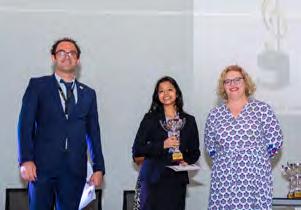
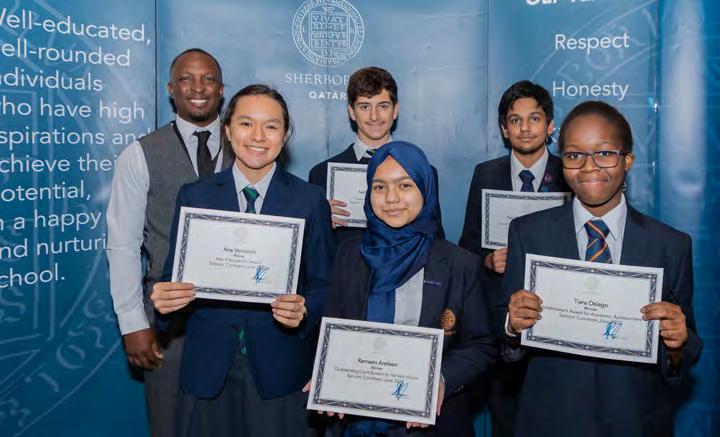
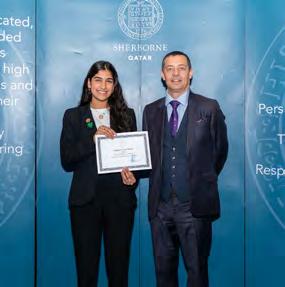

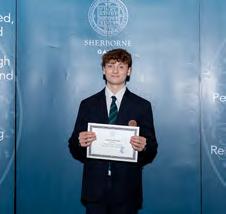
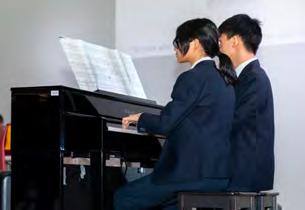


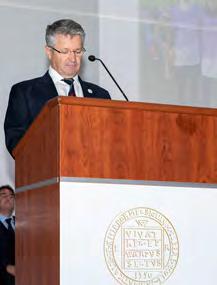
Support staff, or non-teaching staff, are valued members of our school community who make sure the school runs efficiently. Without these people working tirelessly, and often unseen behind the scenes, the school would quickly grind to a halt.
The efforts of the support staff - security, cleaners, librarian, lab technicians, nurses, accounts, Examinations Officer, receptionists, human resources, marketing team, ICT support etc. - ensure that Sherborne Senior School remains a safe and conducive environment. These key employees directly impact on our pupils’ learning.
To speak gratitude is courteous and pleasant, to enact gratitude is gererous and noble, but to live gratitude is to touch Heaven.
- Johannes Gaertner
The teaching staff and Senior Leadership Team of Sherborne Senior School would like to express our sincere gratitude for all the hard work of the support staff.
We would also like our pupils and parents to be mindful of just how important the support staff are in the school’s operations and join us in showing our gratitude.

This year was full of mixed emotions, not only for the Bursary team but also for all our pupils, parents and other stakeholders who supported us all throughout this year and helped with expanding our community. Thank you for making our favourite moments from this year possible and for being part of this incredible year.
We have successfully navigated the pandemic this year, during which the majority of restrictions were eased and we are prepared for what will hopefully be a full return to normal soon. We continued to provide our top-quality education this year, not only by investing in our excellent staff but also by investing in an enhanced IT and building provisions.
It was with pride that we successfully moved our Senior School to a brand-new, world class, building near the Mall of Qatar, to provide our pupils with the best facilities. We hosted several events and received highly successful QNSA & BSO inspections at the new site. We have the determination to develop our provision and grow our community even further.
We invested in further enhancing the Girls’ School at Al Ebb and our pupil numbers were beyond our expectations. We are thankful to all our parents for sharing the ethos of Sherborne Qatar with their friends and families, which made the opening of the senior section of the school an absolute success. With your immense support and confidence, we successfully tackled various challenges. The Girls’ School achieved QNSA candidacy status and the positive feedback received from the inspectors truly reflected the quality of education we provide.
We also invested in the Prep School, with a complete redecoration and enhancement of the site and the provision of several new educational spaces. The Prep School has enjoyed success this year with outstanding BSO and QNSA inspections.
Next year we are opening our new Junior School at the Bani Hajer site and this will run in parallel with the Prep School. We are delighted with the level of interest generated for the Junior School. We also have new cafeteria and transport provider, to ensure our pupils have access to the best food in school and the best transport links between home and school. We hope that the easing of restrictions will allow these services to commence in the next academic year.
Finally, my best wishes to all leavers and an ‘open-arms’ welcome for all new members of the Sherborne Qatar community.
Mr Ashish Garg Bursar

